You're currently viewing a custom sorting.

Star Trek DS9 - 6x15 - Honor Among Thieves
Originally Aired: 1998-2-25
Synopsis:
Starfleet Intelligence recruits Chief O'Brien to infiltrate the Orion Syndicate, the Alpha Quadrant's leading organized crime ring, to find a Starfleet informant. [DVD]
Filler Quotient:
1, partial filler, but has important continuity. I recommend against skipping this one.
- You'll need to watch this episode to understand the context of how and why O'Brien acquired a cat, which becomes somewhat relevant later. Understanding that context later on is useful for understanding a few scenes in later episodes, but not essential, strictly speaking.
Problems
None
Factoids
None
Remarkable Scenes
- O'Brien spiking one of Bilby's people.
- Quark and Odo speaking at the same time.
- The numerous system glitches.
- Bilby to his cat: "Well, what do you make of that, Chester? I've found me an honest man."
- O'Brien: "There's a Klingon ambassador here? Gowron must not like him much."
- The Orion Syndicate conspiring with a Vorta...
- O'Brien and Bilby robbing the bank of Bolias digitally.
- Bilby to O'Brien: "I'm going to take care of you. I don't forget my friends. 'Cause friends; they're like family. Nothing's more important. Nothing."
- O'Brien revealing himself to Bilby.
- The final scene with O'Brien feeling bad about what he had to do.
My Review
An Orion Syndicate episode in the tradition of DS9: A Simple Investigation. Though this version of the plot is far more successful. O'Brien begins working for Starfleet Intelligence, attempting to infiltrate the syndicate to try and find out who the traitor to Starfleet is. In this process, he discovers the Dominion is working with the syndicate, and so his mission is extended to discover the full extent of the Dominion's plans. But by the time he finds out, he realizes that he'd have to betray Bilby, the man he worked so hard to earn the trust of all this time. Feeling that it would be dishonorable to let Bilby die like this, O'Brien warns him. But Bilby knew his fate was already sealed. O'Brien let him go reluctantly, but as a final honorable gesture, when O'Brien left he honored Bilby's request to look after hist cat, Chester. I love the final scene, showing a distraught O'Brien petting Chester. A moving episode.
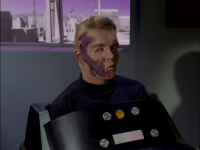
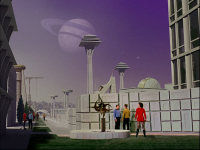
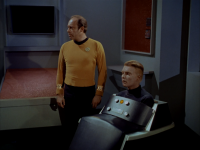
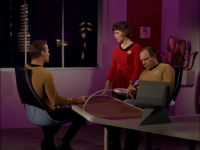
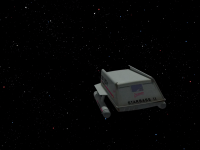
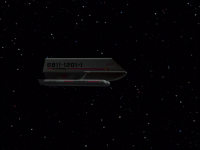
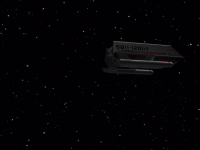
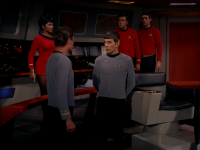
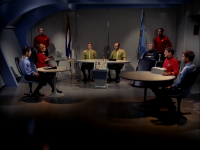
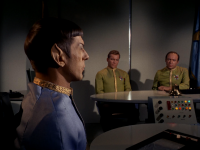
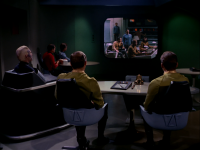
Star Trek TOS - 1x11 - The Menagerie, Part I
Originally Aired: 1966-11-17
Synopsis:
Spock hijacks the Enterprise to return an injured Captain Pike to Talos IV. [Blu-ray] [DVD]
Filler Quotient:
2, filler, but an enjoyable episode nevertheless. You can skip this one, but you'd miss out on some fun.
- Neither the first, nor the second part of The Menagerie is essential viewing if you're trying to plow through only Star Trek's essential exposition and stand-out classics, but it's definitely among the better episodes. If you do decide to watch The Menagerie, I recommend skipping The Cage unless you're willing to put up with the clip show to get the additional texture.
Problems
- This episode unfortunately inherits many continuity errors due to reusing material from The Cage. See my review of The Cage for a complete list of them.
- Unfortunately, this episode also adds to The Cage's list of continuity errors created by future episodes retconning earlier material. In the document Kirk reads about Talos IV, the text makes several human-centric references that imply that Earth is a nation of humans, rather than Earth existing in what will eventually be referred to as The United Federation of Planets, the multi-species nation Star Trek eventually became famous for. The text of the document even explicitly calls out Spock's half-human, half-Vulcan nature as if aliens living among humans is unusual and expressly forbids humans (rather than citizens of the Federation) from visiting Talos IV. All of this is caused by the fact that at this stage in production, the idea of the Federation had not yet been established by the writers. The Federation was introduced in a much later episode, retconning all of this stuff in the process.
Factoids
- The events of The Cage take place 13 years prior to the events of this episode.
- When Pike was promoted to Fleet Captain, he ceded command of the Enterprise to Kirk. That is when Kirk and Pike first met.
- Spock served with Pike for 11 years, 4 months, and 5 days.
- This episode (both parts) won the 1967 Hugo Award for Best Dramatic Presentation.
Remarkable Scenes
- Kirk blindly defending Spock's good name regarding the phantom transmission.
- Spock sneaking around; up to no good.
- Spock fighting with the starbase officer.
- Spock taking over the Enterprise.
- Spock submitting himself for arrest.
- Spock completely outmaneuvering the captain and the commodore at the trial.
My Review
Spoiler warning: my review of this episode assumes you've seen Star Trek's pilot episode "The Cage" which is the unaired episode that the clips Spock shows in this episode were originally filmed for. You should be able to find The Cage in the extras either at the beginning or the end of your home video collection. My review of this episode does not discuss or analyze any of the events of The Cage itself, but instead focuses solely on the new events in The Menagerie and assumes that you have already seen The Cage. If you're looking for commentary on the events of The Cage, then please read my separate review of that episode first. If you're not planning to watch The Cage, I recommend waiting to read this review until you've seen both parts of The Menagerie to avoid spoilers.
The Menagerie, Part I is a cleverly written episode which rises above the many already-established cliches in Star Trek to tell a story that is fresh, new, and unique despite it merely being a shameless framing device so that the unaired material of The Cage could be put to good use. Even the title of this episode "The Menagerie" is a reference to one of the lines spoken by Pike in The Cage. As for the actual clip show, I don't know whether it was good preplanning or just some damn fine luck that the Talosians as written in The Cage had the ability to show people illusions, because it provides quite a clever way to substantiate their ability to show the court the entire episode in flashback form.
The crafty way the clip show was integrated into the episode was certainly among its most memorable qualities, but the centerpiece of the story is Spock going off on a crazy quest against orders, then getting caught and having to defend himself in a court martial. Unfortunately the court proceedings are admittedly weakly written. Why is Spock still able to give testimony after having plead guilty? Why should Kirk be punished too because of Spock's actions? Why is the death penalty of all things considered acceptable for such a minor transgression? Why was court declared to be in recess at the end of the episode? What is this recess being used for?
These are all trivial questions and there are some fairly trivial answers to them if you're willing to be imaginative. But they all stick out as minor plot holes the episode was unwilling to explain away and were unnecessary details to begin with. Better writing could have avoided the awkwardness. That said, Spock being put on trial for his actions was a fantastic dramatic choice and Spock having manipulated everything carefully enough so that he could control the court proceedings up until the cliffhanger was a delightful touch. On a related note, Kirk and McCoy debating with each other over whether or not Spock was capable of treachery was a terrific scene and placing the scene just prior to Spock stealing the ship was an excellent counterpoint.
In addition to being the first episode to feature a cliffhanger, The Menagerie is also the first episode to feature a shuttlecraft. The shuttle Kirk and the commodore use to attempt to catch up with the Enterprise is intriguing in its design and capabilities; it was presented much as I would expect a shuttlecraft to be like given the technologies at their disposal during this time period. It was futuristic, high tech, and even roomy by our standards of space travel, but compared with a ship as advanced as the Enterprise the shuttle was scaled down both in size and capabilities. A commendably realistic technological portrayal given what assumptions we can reasonably make about their technological advances from our perspective.
It might be tempting to pick on poor old Captain Pike for his rather pitiful wheelchair that only lets him beep things to communicate, but I felt that the episode did a fine job of substantiating this. McCoy makes a big point about how the study of the brain has advanced little over the years. Given that, even something as simple a rudimentary neural interface is a technology light years beyond anything we've got. Crafting a custom wheelchair just for Pike that allows him limited mobility and limited communication is quite an achievement by itself. Just because these people have transporters and warp drive doesn't mean they're magical wizards. Giving them limitations is what makes them human.
This episode ends on both the most dramatic point of The Menagerie, since Spock seems to have lost control of the situation for the first time in the episode, as well as ending on the most dramatic point of The Cage, when Pike is abducted, which is another nice touch. I was pleased that the first thing that came out of Kirk's mouth upon witnessing the footage was a demand to know how Spock could have created it and I greatly enjoyed how Pike slowly started to come around to Spock's side. For a character who can only beep yes or no, he was surprisingly compelling. Overall, this is easily the best episode so far in what has mostly been a sea of duds.
The following are comments submitted by my readers.
- From rhea on 2008-04-27 at 6:07pm:
Some additions to your review, which I totally agree with otherwise (especially the absurdities):
- another problem: the peak of the absurdness in this episode is how easily Spock gets off the hook. Last time I checked this was a military organisation, and stealing a starship, insubordination and mutiny, for whatever cause other than protecting the lives of millions against an evil superior is still punishable. So now all of a sudden it is ok because it was an act of compassion? Yeah right.
- another highlight: Kirk, acting as a jury member in the trial against Spock. This is one of the very few occasions we see what a hardass military commander he can be - calm, cool, deadly, convicting Spock to death because this is what military law calls for. We tend to forget this side of him because most of the time he is all chummy with the crew and all angry and emotional with the enemy. Now I understand why he got to command a starship with a crew of 400+. - From Old Fat Trekkie on 2011-12-06 at 9:02pm:
Great site. I do wish to participate in the future.
Here is my comment.
There is a scene where Pike continues to signal "No". Commodore Mendez states that he could be questioned for days, without determining the issue. If I assume he can respond "Yes" or "No" to any questions, then any child who has ever played, "Is it bigger than a breadbox?" clearly knows that this is false. Let me ask 50 questions ... - From Mike Meares on 2012-02-26 at 12:30pm:
I thoroughly enjoyed the Menagerie! And I totally agree with Kethinov’s review! I still remember watching it for the first time and being in shock at what was unfolding right before my eyes! And
I still enjoy watching it today.
I really can’t separate Part One from Part Two, they are linked together and that is the way I will review them. Although I do agree with Kethinov as far as Part One being far superior to Part Two.
However, like Kethinov pointed out there are numerous questions that pop up about both episodes. I am not sure I would call them “trivial” as he does, but as he correctly pointed out in his review they could be explained away. Well most of them but not all. I just wish the writers had spent a little more time on explaining them.
I apologize in advance to anyone who takes offense at this, but just because I have questions about the Menagerie doesn’t mean I don’t think it is a terrific episode. I just feel it isn’t the best written Star Trek episode.
I could name quite a few “mistakes” in both episodes but I will limit my criticism to just two mistakes or problems. And they are whoppers.
The biggest problem with the Menagerie is that it is based upon the court martial of Mister Spock. Why is this a problem you say? Because in order to conduct a court martial you have to have three officers of command rank onboard. Since leaving Star Base 11, Commodore Mendez was an allusion created by the Talosians. Therefore you did not have three officers of command rank onboard; Ergo, Mister Spock could not have been court martial!
However, this raises an even bigger and more serious issue to the story.
If the Talosians could send their allusions all the way to Star Base 11 then why all the charade? When the Enterprise got to Star Base 11 the Talosians could have just created the allusion that everything was normal and Spock could have taken Captain Pike to Talos and gotten back to Star Base 11 and nobody would have been the wiser!
Granted, it would have been difficult to stretch that into a two part episode! LOL!
Nitpick: I could say something about Star Base 11 having back to back episodes( based on the way the episodes were filmed ) of a Court Martial against Kirk and then one against Spock, but I won’t! LOL! It is a good thing the Enterprise never went back to Star Base 11. Dr. McCoy or Scotty would have been next! LOL!
More Nitpick: When they were questioning Pike did anyone ever think of asking a Vulcan to Mind Meld with him? Just asking. - From Old Fat Trekkie on 2012-02-29 at 9:45pm:
Mike, we don't need a mind meld. See my last comment. 50 intelligent questions that can be answered "Yes" or "No" will get to the bottom of almost anything. I do believe we may assume that in the 23rd century, folks will still be able to ask intelligent questions. - From Schreck on 2013-05-23 at 9:41pm:
The first and only two-parter of TOS that gives us a nice storyline about what happened to Pike and it gives us some nice continuity in the series which is lacking. I give it a 7 and my brother a 6.5
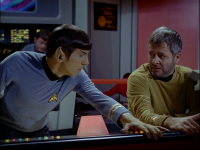
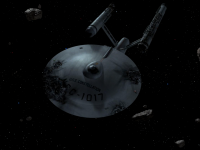
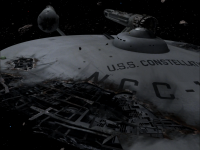
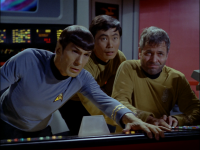
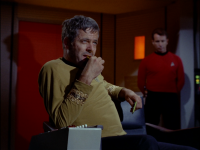
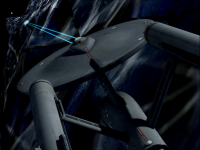
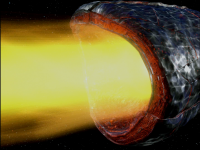
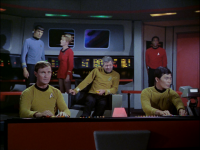
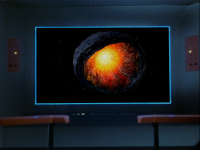
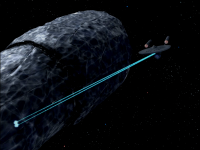
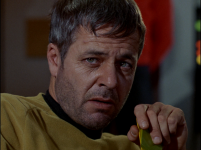
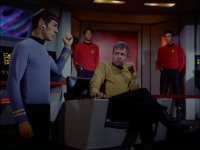
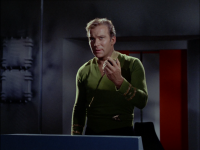
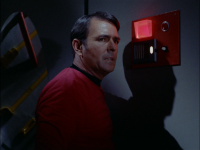
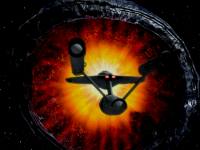
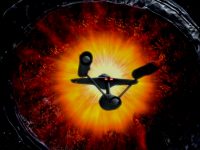
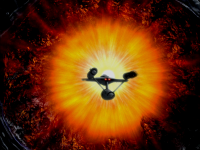
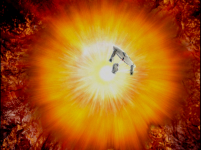
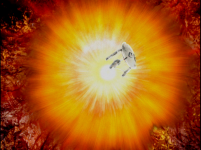
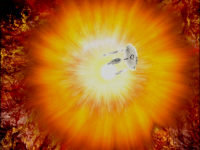
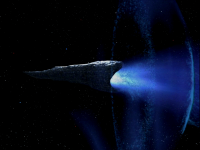
Star Trek TOS - 2x06 - The Doomsday Machine
Originally Aired: 1967-10-20
Synopsis:
A machine that destroys planets threatens the Enterprise. [Blu-ray] [DVD]
Filler Quotient:
2, filler, but an enjoyable episode nevertheless. You can skip this one, but you'd miss out on some fun.
- There's no essential plot or exposition in this episode that renders it unskippable, but it's definitely a fun ride!
Problems
- Throughout the episode numerous characters make mention of the planet eating monster devastating all the nearby "solar systems." This is a common error. The term they were looking for is planetary system. The planetary system we live in is called the Solar System because our star is named Sol. As such, the term "Solar System" is a proper noun, not a generic term.
Factoids
- This episode is a candidate for my "Best Episode of TOS Award."
- Uhura and Chekov are remarkably absent from this episode.
- This episode establishes that detonating a starship impulse engine can generate a 97.835 megaton explosion.
- This episode was nominated for the 1968 Hugo Award for Best Dramatic Presentation.
Remarkable Scenes
- The sight of the crippled vessel Constellation.
- The freaked out commodore Matt Decker.
- The revelation that the entire crew of the Constellation was killed by the planet eating machine.
- McCoy: "I'm a doctor, not a mechanic!" (Count #5 for "I'm a doctor, not a [blah]" style lines McCoy is famous for.)
- Kirk's speculation that the planet eating machine must be a remnant from a distant, ancient war which destroyed its creators.
- Spock's calm and logical refutation of Decker's argument, then doing his duty and giving up command despite the fact that Decker's decision was wrong.
- The Enterprise engaging the planet eating machine.
- Kirk to Decker: "You're the lunatic who's responsible for almost destroying my ship!?"
- Spock taking command.
- Spock: "Vulcans never bluff."
- Decker's battle with the security person.
- Decker plunging himself into the planet eating machine.
- Kirk regarding plunging the Constellation into the planet eating monster: "I'm gonna ram her right down that thing's throat!"
- The Constellation exploding inside the planet eating machine.
- Spock regarding the planet eating machine: "It's quite dead."
My Review
In what is easily the most exciting episode since Balance of Terror, captain Kirk, his crew, and a crazed commodore Decker do battle with an automated weapon from another galaxy programmed solely to seek out new life and new civilizations and destroy the strange new worlds they inhabit. Indeed the planet eating machine featured in this story is in every way the antithesis of our Star Trek heroes and presents itself as a worthy foe to the Federation.
This well paced story delightfully sets up the freak of circumstances that places Decker in temporary command of the Enterprise while Kirk is left to fend for himself on Decker's crippled ship. Likewise the exposition that Decker beamed his entire crew down to a planet that he was tragically unaware the planet eating machine was about to destroy also nicely sets up Decker's despicably unstable demeanor throughout the story.
You can't help but root for Decker during his ill-advised battle with the planet eating machine. A part of you wants his crazy desperation to work. Meanwhile the race against the clock for Kirk to rush in and save his ship using Decker's crippled hulk of a ship is a thrilling ride with an excellent climax. Star Trek sure can do action well when it wants to and the space battle depicting two Federation ships doing battle with the planet eating monster was masterfully choreographed. If only Balance of Terror had this much battle footage!
The way Kirk and Decker counterpoint each other throughout the story is also nicely done with Kirk doing more with less while Decker continues his downward spiral of doing less with more. In the final act it was both touching and clever for Kirk to take inspiration from Decker's suicide move and at the end of the story watching Kirk stare down death wondering if his crew would fix the transporter in time was excellent suspense. Overall an outstanding episode.
The following are comments submitted by my readers.
- From rhea on 2008-04-27 at 8:50pm:
Decker as a Commodore: well, that depends. In some fleets on Earth (e.g. in the UK), a Commodore (a flag rank) outranks a Captain, so if this is the case in Starfleet Decker outranks Kirk and can take command of the Enterprise even against Kirk’s direct order. That is however weird since Commodores don’t command single ships on a regular basis. Unless the writers accepted this kind of plot hole for dramatic purposes.
On the other hand, an American Commodore has the rank of a Captain, but temporarily is given command of a small fleet and is thus temporarily elevated in rank so he outranks the other Captains. The authority attached to the rank is temporary; the person stays a Captain and retains the duties attached to a Captain’s rank. Out of courtesy, however, the title is sometimes still used even after the temporary mission is over, so Decker may well have been a regular Captain who was once elevated to Commodore for a special mission and retained the title from it. What do you think?
- From TashaFan on 2008-09-19 at 2:24am:
Decker is a Commodore for dramatic effect. As a Commodore he outranks Kirk and therefore it is clear that when Kirk forces him to relinquish command, it's not a battle of equals, but Decker has been emasculated by his junior. It also means Kirk's actions are not just an argument among peers but are actual insubordination. If Decker was just another Captain there would be much less dramatic conflict. Although I agree with the other comment, in the episode with the M5 computer we see that Commodore Bob Wesley is indeed in command of a fleet of four ships. - From Ggen on 2012-03-15 at 11:01pm:
This was an altogether awesome episode. The central plot and its resolution are both quite good. At the forefront of the entire thing is the twisted psyche of the Commodore, clinging to a failed captaincy, trying to redeem himself in his own bizarre, suicidal way. The Commodore is rather brilliantly written and portrayed and a kind of twisted pleasure to watch. (Interesting how in his misguided efforts he ultimately did help stop the doomsday device by giving Kirk the right idea).
The command tensionS on the Enterprise between the Commodore, Spock, and McCoy was especially great.
I have to comment here about the Commodore's fight sequences en route to the shuttlebay, which were absolutely awesome. Something in the choreography was definitely lost, irretrievably lost between the transition from TOS to all the later series. (I just watched TNG The Hunted which is about a supersoldier and has numerous fights, all of them atrocious when compared to TOS...)
The doomsday machine was an interesting idea (later recycled somewhat in TNG 1x21 Arsenal of Freedom and Voyager 2x17 Dreadnought) and was executed sufficiently well. I can't quite decide whether the model and special effects were silly or awesome (I think some strange mixture of both). The final explosion was definitively cool.
Problem(?):
If the Enterprise was more maneuverable than the doomsday device, it stretches credibility a bit to have it reappear "out of nowhere" and catch everyone by surprise early in the episode. Of course, there was the matter of "subspace interference," but from what I recall, that was mostly discussed in terms of communications, not things like long-range sensors, the viewscreen, etc... - From warpfactor 10.1 on 2012-09-20 at 5:20pm:
I'd forgotten what a great episode this was. I thought it was exciting despite the fact that I knew Kirk wasn't going to die (hope that doesn't spoil it for anyone). The dramatic tension regarding Decker's clash with Spock and Kirk was well done. Guests often get to overact but somehow it doesn't seem out of place and is almost necessary given the relatively short episodes. Although Decker seems as mad as a box of frogs at least he was prepared to go down with his ship which is more than can be said for at least one captain recently.
I thought the visual effects were done well (being no fan of CGI).
The one thing stopping me giving it quite as high a score as I might is NO UHURA! There can be no excuse for that. No wonder Scotty was a bit subdued. - From Royals42 on 2013-06-12 at 6:22pm:
Is it just me or is there no thought whatsoever on shooting Photon Torpedos. I know it probably wouldn't have done much but maybe shooting a dozen right up the throat of that thing would have been comparable to the explosion of the ship.
Other than that it was in my top 5 episodes of TOS. #1 of course is Balance of Terror! It was exciting to see something from another Galaxy and it would have been more interesting if they had examined it more after they "killed it." However maybe it's identity would have made it less menacing. - From Scott Hearon on 2014-04-06 at 11:55am:
Excellent episode. I gave it an 8/10.
The only things that bug me are: (1) the way that Decker becomes oddly smug and calmly self-satisfied right in the middle of his fit of obsessed vengeance/guilt. It seemed completely out of place. (2) At this point, I'm rather tired of just how insanely quickly Kirk becomes bemused and cracks wise, even immediately after a horribly traumatic experience. I know some hardcore devotees of TOS will consider this blasphemy, but it just rubs me the wrong way.
All else about this episode is great. The shift of Decker from victim to villain to hero is splendid viewing. The antagonist Doomsday Machine, obviously social commentary about the Cold War arms race, is the most terrifying thing that I've seen in a Star Trek episode. Having Scotty be a major part of defeating it was fun, and the entire 3-way interaction between the Machine, Kirk on the Constellation, and Decker on the Enterprise was perfectly balanced. The drama that ensues moves the tale along at a great pace, and it truly is one of the absolute best episodes. - From Chris Long on 2017-11-08 at 9:39pm:
I know I'm late to this great website so forgive me.
The acting by the guy who played Decker was superb. The one thing that draws me back to TOS is a generally outstanding acting by the cast and the guest stars!
The "Don't you think I know that?" line is one of the most heart-wrenching in television in general.
Contrasted against Kirk's casualness at the end of episodes where billions of people have died, it was pretty stark.
In agreement with Scott Hearon, I'm constantly annoyed by that little 'habit' of TOS. - From Alan Feldman on 2022-06-25 at 6:49pm:
"Planetary system" suffers from the same bad logic used against "solar system." The argument goes: 'Solar system contains "Sol," and so cannot refer to other solar systems.' Well, planetary system contains "planet," and therefore cannot refer to the planets' sun, the system's meteoroids, asteroids, moons, Kuiper objects, Oort cloud, etc. So "planetary system" suffers from the same logical "error" that "solar system" does. The only reason we even have such a term is the discovery of exoplanets. That was novel. Stars are old hat. So astronomers were studying these newly discovered planets, which obviously make up planetary systems. But a solar system is so much more than a planetary system: Its sun, moons, meteoroids, asteroids, Kuiper objects, etc. But the powers-that-be have already forced upon us this equally, if not more so, defective term. So be it. Again: "Solar system" contains Sol, so it only means ours (contrary to the dictionary). So that means that "planetary system" can only refer to planets, as it contains "planet," and not the rest of the remote solar system. Equally bad logic in both cases. - From Alan Feldman on 2022-06-25 at 7:25pm:
I heartily recommended the original non-CGI version. While there are problems with the special effects, the new version needlessly introduced some serious problems.
First of all, the machine is basically a flamethrower. Supposed to be pure anti-proton beam, which you could imagine is the case in the original. But in the new version, it's just a flamethrower. A flamethrower! It comes all the way from another galaxy, and it's a flamethrower. Well whoop-dee-do. And when the thing is finally killed, it droops.
NOOOOOOOOOOOOOOOOOOOOOOOOOOOOOOOOOOOOOOOOOOOOOOOO!
It's out in deep space. There's no up and down in space! There's enough of a problem with gravity almost everywhere, including on a ship with almost no power. And now the thing droops?! This is not an improvement!!! In the original it actually looked dead. Frozen, even. And the explosion that kills it is in some sense better in the original.
I also think the old one looked scarier with its abstract optical effect at the "bottom" of its "throat." In the new one, it's just some flames.
Somewhere in the CGI version you can see the nacelles in the viewer. We're talking 200 or 300 years in the future, and they can't have a clear, non-claustrophobic view? Really?
Yet another problem: What are the horizontal "wrinkles", esp. when the ship is approaching the camera? Looks like some weird form of interlacing. Maybe it's just my copy. If not, so much for "superior image quality."
>----o----<
As great an episode as this is, it has some problems:
How the hell did Scotty, immediately upon materializing, know there was a problem with the transporter?
How did the communications officer get those reports so fast? There is practically no time between her reciting them.
Why didn't they fire down the throat of the thing? Why didn't the thing blast them when they're right in front of it? OK, maybe the thing wanted to swallow it for "nourishment."
I think it's in no small part the music that makes this ep so good, despite all its problems. And yes, William Windom puts in an awesome performance. Oh, and as usual, the sound effects are awesome.
Again, I heartily recommend the original version, even though you can see stars through its "wall" at the front of the machine.
BTW, I still love this episode. Certainly no. 1 for action, and most importantly as always, a good story.
>----o----<
Ever notice that the windows in the shuttle craft are too high for the "pilot" to see out of?

Star Trek Ent - 1x03 - Fight or Flight
Originally Aired: 2001-10-3
Synopsis:
The crew comes across an abandoned ship of dead aliens. [DVD]
Problems
None
Factoids
- According to T'Pol, one out of every 43,000 planets supports intelligent life.
Remarkable Scenes
- Archer: "Come on, Travis. We've got to find Mr. Reed something to blow up!"
- Phlox sharing his observations of humanity with Trip.
- Hoshi freaking out about the alien corpses.
- Archer second guessing himself and deciding to turn back and go back to that ship to investigate.
- The alien ship thoroughly kicking Enterprise's ass.
- Hoshi defeating the language barrier.
My Review
This episode outlines Earth's first contact with the Axanar, a species we've heard of before in TOS (mentioned in TOS: Court Martial and in TOS: Whom Gods Destroy). I'm glad the writers didn't repeat the mistake here that they made with the Suliban and the Denobulans. Granted, nobody knows who was in that alien ship that almost tore Enterprise a new rear end, but I don't think that it's very important. Personally I think this episode belongs to Reed and especially to Hoshi. Reed was concerned that Enterprise would do poorly in a fight due to its primitive and improperly configured weaponry, and he was right. Hoshi was concerned that she'd have no grace under pressure, and she was right too... for a while anyway. It's kind of annoying that she doubted her ability right up to the point when Enterprise was about to be destroyed before finally showing some courage. But it was easily realistic and it was nice to watch her character evolve from a scared little girl to a confident young women in the course of a single episode. As a more general analysis, this episode does well to further elucidate the fact that Earth is hardly prepared for exploration. This mission would have hardly been worth a full hour on any other Star Trek show, so the writers are taking full advantage of Enterprise's weaknesses, for they are a strength in terms of writing for a prequel.
The following are comments submitted by my readers.
- From Dstyle on 2015-08-12 at 9:56pm:
Despite creating world peace, ending poverty, and eradicating hunger, humanity had yet to learn the catastrophic dangers of introducing non-native species into a new environment. Sorry, random planet: you're about to be overrun with slugs! - From Zorak on 2016-09-17 at 4:08pm:
That part with the slug actually bothered me quite a bit, and not just because it made me roll my eyes at how symbolic it was supposed to be. It's Hoshi's (and Phlox!?) complete naivete in thinking that slug would be just fine marooned on an alien world. They completely doomed that slug and acted like they were it's saviors. What rubbish. - From Hugo on 2016-11-24 at 1:49pm:
Totally agree about the slug!
I thought it was quite refreshing to see aliens that breath a different kind of atmosphere and have a different environment - and the language/communication problems was also good to see.
The final 5 minutes felt quite standard Trek - with that standoff etc, and a quick resolution...

Star Trek TNG - 3x22 - The Most Toys
Originally Aired: 1990-5-7
Synopsis:
Data apparently dies in a shuttlecraft explosion. [DVD]
Problems
None
Factoids
None
Remarkable Scenes
- The shuttle explosion at the beginning, with Data presumably aboard.
- With such concern for the mission, no one had time to mourn for Data. It was obviously painful for them.
- Data's eccentric captor.
- Data's Captor's Assistant: "The Andorians wish to make a bid on the shipment of Toulorian spices you offered." Data's captor, frantic: "They had four days to decide! Why do they have to decide right n--" Data's captor, suddenly calm: "All right."
- Wesley and Geordi mourning Data in Data's quarters.
- Data weaseling his captor's assistant into sympathy.
- Geordi refusing to accept Data making pilot error.
- Worf taking ops.
- Data's captor dissolving away Data's uniform.
- Data's passive resistance.
- Picard's faux pas with Worf.
- Data finally sitting in the chair.
- Data's captor killing his wife with the painful-death disruptor.
- O'Brien beaming away Data just as he was about to kill his captor.
My Review
Another Data episode. I liked Data's captor quite a bit. Especially the scene where he goes from rage to acceptance in a split second regarding the Andorian bid. His frantic personality is a flaw in the character but not necessarily the writing. I found the story itself largely enticing and the path Data chose for resistance appropriate. As the story went on, Data's captor got more and more sadistic and the story got more and more interesting. The conclusion leaving us with a mystery regarding whether or not Data would have killed has captor and whether or not Data felt genuine emotion is truly fascinating.
The following are comments submitted by my readers.
- From Ivan on 2006-07-29 at 10:21pm:
During the scene where Fajo is provoking Dataabout his not capable of killing someone, I kept shouting 'Kill him!'. The Data in this episode shows some kind of 'emotion' but in an android sort-of-way. 9/10 - From DSOmo on 2007-07-29 at 8:41am:
- When Data begins his final run to the Enterprise in the opening scenes, he reports his progress to Geordi. After the crew of the trader ship stuns Data, his captors talk freely about the components of Data's body. Isn't it very convenient that Data's communicator happened to shut off at just the right time so Geordi wouldn't hear their discussions? Wouldn't an open communications line be standard in these types of dangerous situations?
- The opening shot shows the Enterprise almost head to head with Fajo's ship. That means that Data must execute two 180-degree turns to get from Fajo's shuttle bay to Shuttle Bay 2. If hytritium is so unstable, why not put the ships back to back? In that way Data could fly out of one shuttle bay and make a straight line to the other.
- Evidently, whenever there is any sort of dangerous job, Picard sends poor old Data to do it. For Fajo's plan to work he had to know, in advance, that Data would be the shuttle pilot. Requesting Data would cause too much suspicion later. - From Schn on 2010-02-01 at 12:41pm:
Is there really a mystery? The transporter chief stated that the weapon was in the process of discharge while in transit. It seemed to me that we realise in this episode that Data has more complex rules for killing than self defence. - From thaibites on 2011-03-02 at 12:51am:
This episode is great! I love Data episodes (mainly because you know that Riker or Troi won't be humping the first alien that comes on board). Anyway, Data calculated the possibility of how many people would suffer or be killed by his captor, and then fired. He knew if he killed one man, many lives would be saved. "The needs of the many outweigh the needs of the few."
Also, the personality of the captor is spot-on. The actor did an outstanding job of portraying an unpredictable, quirky, manic collector who was capable of doing anything. At what point does eccentricity devolve into self-absorbed madness...? - From CAlexander on 2011-05-01 at 5:14pm:
The good part of this episode is the way that Data reacts to his imprisonment. The writing is excellent at portraying his unique point of view. On the other hand, the plot on the Enterprise, while necessary for pacing, didn't seem to work so well for me. The fact that I knew the answer to the mystery seemed to rob the scenes of interest. - From Lee on 2012-04-07 at 9:43pm:
After watching this episode, I first thought too, that Data wanted to kill his captor. But he tells Riker and O'Brien, that the weapon might have been triggered during transport. So that would mean, he would be lying to them! For me, that is impossible, especially since killing him would have been justified, so Data had no reason (at least not from his "android-point-of-view") to lie.
But it could have also been a problem with the dubbing, because I watch all the episodes in German with my family (they don't understand English well). So just ignore this comment if it all makes sense in the English version. - From Ggen on 2012-04-08 at 12:48am:
Great episode. Vaja (?) (the captor) basically makes this entire episode. He's a unique and all around excellent guest character...
The little "subplot" with the water poisoning situation, which eventually traces back to Vaja, is done well also.
Finally, we have the interesting little tid-bit of an ending: Data for all intensive purposes kills Vaja, with an exceptionally "vicious" weapon, no less. (Not really but he resolves and attempts to - comes within milliseconds of success). This despite the fact that no life was actually in jeopardy, only his own freedom. (He could've chosen to obey, to placate Vaja, to remain captive)
So, was Vaja right in his early discussions with Data? Was Data's talk about using deadly force only for "defensive purposes" a kind of justification of murder?
That Data hides all this from Riker and the crew after the fact is equally interesting. Perhaps Data is most human in these rare little contradictions, questionable judgements, and deceptions... - From Jack on 2014-05-11 at 6:15am:
Something to add to the Problems section: After the shuttle explosion Geordi is talking to Picard and Riker in Picard's ready room and Picard calls Geordi "Lieutenant" but Geordi is a Lieutenant Commander. - From Rob UK on 2014-06-18 at 3:41am:
Good episode, I believe that Data was on the edge of a cascade failure (See Lal in The Offspring) which brought on the quasi emotional state and more human behaviour, all triggered by the moral conflict and emotional turmoil so strong his positronic brain and programming malfunctioned, the trigger for the cascade failure in Lal was the thought of being taken away from her father and friends. Maybe if Data had murdered his captor and stayed he too would have experienced a cascade failure resulting in his death exactly as his more evolved daughter did under less emotional duress.
All just 5am theorising after spending too much time with midnight mary watching the Trek telethon style

Star Trek DS9 - 6x21 - The Reckoning
Originally Aired: 1998-4-29
Synopsis:
Sisko is called to Bajor when an ancient tablet addressing the Emissary is discovered. [DVD]
Filler Quotient:
0, not filler, do not skip this episode.
- This episode addresses the "penance" the Prophets wished to exact on Sisko for stopping the Dominion ships from coming through the wormhole in DS9: Sacrifice of Angels. It also explains why the Dominion has not tried sending another fleet through. There's also some interesting foreshadowing about future events.
Problems
None
Factoids
None
Remarkable Scenes
- Dax: "I had a pretty good idea what this was the moment I laid eyes on it. That confirms it. It's a slab of stone with some writing on it."
- Kira discussing with Sisko the reason why the Kai doesn't like him.
- Jake talking to Sisko about his worries about the Emissary business.
- Sisko: "I just had this uncontrollable urge to smash the tablet." Dax: "Oh I get those urges all the time. I just never act on them."
- Possessed Kira.
- Prophet Kira ignoring the Kai.
- The Pah-wraith Kosst Amojan taking over Jake.
- The battle.
- Kai Winn ending the battle.
- Morn Appearances; 1. Witnesses possessed Kira.
My Review
A prophecy predicts that if the Prophets are able to defeat the Kosst Amojan at the gate to the Celestial Temple, a golden age of peace and prosperity will be bestowed upon Bajor. The prophecy comes true, and the battle is waged on Deep Space Nine. But just as the prophets are about to win, Kai Winn interferes and stops the fight, revealing just how evil she really is. She claims to walk the path the prophets have laid out for her, but her motivations are purely greed and the desire for respect and power. As Kira said, she couldn't stand the fact that the Emissary had a stronger faith than she did, and that he would sacrifice his son to exact the penance the Prophets asked of him. There are many nice details in this episode, contributing to this overall theme. For example, Kai Winn admits that the prophets have never spoken to her. My favorite detail, however, is when Kai Winn begs the Prophet within Kira to speak to her, it utterly ignores her. It's disgusting and a little sad, but Winn did what she did as a sort of petty revenge against her gods for their disrespect of her. And she did it to protect her power. She said herself, that the golden age of Bajor would no longer require a Kai. She's so incredibly nasty. A great episode.
The following are comments submitted by my readers.
- From spock on 2007-01-07 at 11:51am:
Entertaining, but unnecessary. I don't think we needed an entire episode devoted to showing how evil Kai Winn is. The ghostbusters style showdown was truely the worst piece of writing since "profit and lace" - From Curtis on 2009-11-29 at 3:53am:
I thought this one was pretty awful. That "battle" was pure baloney and, again, we didn't need a whole episode to show that Kai Winn was evil. This one just seemed to heavy-handed to me. - From L on 2013-08-13 at 3:23am:
This is where my mild dislike of the spiritual/religious theme in DS9 turns to outright contempt and DS9 really loses me. (though I'll finish the last season before starting on Voyager)
Sisko is willing to let his son be killed for the sake of a ridiculous light and dark battle of some sanctimonious and patronising energy aliens (who don't even exist in linear space and time or understand cause and effect, so how would that even work?), because 'it's the will of the prophets'? Screw that.
The willingness to subjugate one's will and self to a mysterious force simply because it's bigger than you has no place in Star Trek or any supposedly enlightened future. How many times has something god-like turned out to just be a fallible energy alien that lives on a different scale to us?
Any sympathy I had for Bajoran culture is gone as all I can see is a superstitious people's brain-washed chanting.
It is true that our tendency to repeatedly fall for this nonsense and find something to worship so as to ease our tiny little frightened minds is the human condition, and so it is perhaps where the traditional idealism of Star Trek really ends and maybe the writers wanted to take it in a more realistic direction. It can be excused on that level if it's being presented as a common tendency of all sentient beings alone in the universe, but it seems to be presented here as a noble quality with all the talk of 'faith' and so on.
I thought at least Dax was the one hold-out with her "They'll always just be 'wormhole aliens' to me" line, but even she prays to them in the last episode.
Maybe the final season exposes and properly condemns this fetishising of the abandonment of rational questioning in the name of 'spirituality' and payment for the granting of favour. I certainly hope so. - From Alex on 2021-03-18 at 11:31pm:
The initial conflict of Sisko taking away the stone tablet was so artificial. Why did they need to take it with them at all? Energy readings (of which there was none) could've been examined at first with the tricorder, and since the inscriptions were the focus of attention, couldn't they basically work with a photo? When the need to return it becomes pressing enough, apparently Dax can work just fine with a holographic projection of the tablet. Why not just work with that from the beginning?
Yeah, he had to shatter it. But he just as well could've beamed down to the cave with a sledgehammer, or something.
An annoying episode. Sometimes there's slow episodes, silly episodes, or ran-out-of-material episodes. This one is more "characters ignore basic logic and fumble cluelessly for half an hour before something anticlimactic happens". For me it's 4, at most.

Star Trek Dis - 1x01 - The Vulcan Hello
Originally Aired: 2017-9-24
Synopsis:
While patrolling Federation space, the U.S.S. Shenzhou encounters an object of unknown origin, putting First Officer Michael Burnham to her greatest test yet.
Problems
- The holo-communicator featured in this episode was portrayed as a new piece of technology in DS9: For the Uniform. We have to assume that the technology came in and out of fashion several times throughout the 23rd and 24th centuries to justify its continual appearance and disappearance. Indeed, even in DS9 the technology didn't stick around long and was quickly abandoned shortly after its first appearance.
- The warp drive effect in this episode has been altered in such a way that is extremely difficult to square with other Star Trek series.
- It is established in TOS: Turnabout Intruder that women cannot be captains in Starfleet. Likewise in TOS: The Cage Captain Pike was quoted as saying, "It's just that I can't get used to having a woman on the bridge." This kind of sexism was a difficult thing to suspend disbelief on at the time, but since women were shown to be captains not much later during the TOS films, it was assumed this sexism existed prior to the late 23rd century only. Star Trek: Enterprise further complicated this by depicting female captains in the 22nd century, narrowing the window of time for this sexist period in Star Trek's history to only the 23rd century. With Star Trek: Discovery, the issue is complicated even further by depicting a female captain (Georgiou) grooming a female subordinate (Burnham) to rise to the captaincy only a decade prior to TOS: Turnabout Intruder and only two years after the sexism of TOS: The Cage. This narrows the window of this sexist period of Star Trek's history to only a small number of years, making the episode even more difficult to rationalize.
- When Burnham places the call to Sarek, he picks up the phone almost immediately. Like within seconds. Was he waiting at the holo-communicator or something?
- Spock states in TOS: The Tholian Web that there is no record of a mutiny on a starship before. We have to assume that this event somehow goes unrecorded.
Factoids
- This episode establishes that there are 24 warring houses in the Klingon Empire at this time.
- This episode takes place on May 11th, 2256. A Sunday. This is two years after TOS: The Cage.
- Lieutenant Commander Saru is the first member of the Kelpien species to appear on Star Trek. His world "does not have food chains" and refers to his "species map" as binary: either the hunter or the hunted. His species, the hunted, was similar to livestock at some point in its history. He says his species was "biologically determined for one purpose: [...] to sense the coming of death."
- There is an Andorian colony at Gamma Hydra.
Remarkable Scenes
- T'Kuvma's impassioned speech stoking fear about the Federation.
- Burnham: "You do understand that being afraid of everything means you learn nothing? There's no opportunity to discover. To explore."
- Burnham accidentally taking out the Klingon and being launched into space unconscious.
- T'Kuvma's memorial for the fallen Klingon. That howl! So chilling.
- The flashback to Burnham's childhood attending a Vulcan school under Sarek's tutelage.
- A Klingon ship decloaking in front of the Shenzhou.
- T'Kuvma honoring the albino Klingon, Voq.
- Burnham's phone call with Sarek.
- Burnham Vulcan neck pinching Georgiou and attempting to assume command.
- Saru accusing Burnham of mutiny.
- Georgiou pulling a phaser on Burnham and reassuming command.
- A Klingon fleet arriving.
My Review
Before discussing the story itself, the elephant in the room needs to be acknowledged right at the start: this is the third Star Trek prequel in a row and like the others it introduces a litany of continuity problems, perhaps more than ever before. That aspect of the premise is quite problematic, but this review will dwell on that as little as possible, focusing instead on reviewing this series primarily on its own merits, rather than on how it impacts and possibly diminishes the rest of Star Trek's canon. For more on that, see this article.
It is also notable that this is the first Star Trek series to be filmed in a 2:1 aspect ratio. This is an unfortunate choice, as it leaves black bars on the top and bottom of 16:9 screens which are the most common screens this series will be viewed on. This aspect ratio was reportedly chosen to make Discovery "feel more cinematic," which is a strange reason. Game of Thrones is 16:9 and definitely feels adequately cinematic. Wasting 11% of the screen is not how you make something "feel cinematic." Producing good content is.
With that out of the way, The Vulcan Hello is without a doubt the strongest Star Trek pilot so far from a story perspective. This touching and compelling story weaving Burnham's traumatic and quirky childhood with Klingon nationalism is some of the richest drama portrayed yet on Star Trek. This terrific shift in tone for Star Trek is captured brilliantly by the significant departure in the style of the opening theme as compared to previous Star Trek series. This new opening theme is stylized more like a James Bond film than it is like previous Star Treks, and that's a good thing, as this is a different kind of Star Trek; one which grapples directly with the dark side of exploration: sometimes fantastic new discoveries lead to fantastic new terrors. Generations ago, the invention of warp drive led to the discovery of the Klingon Empire and the commencement of a cold war that lasted a century.
This contrast is best captured when Burnham explores the Klingon beacon. She has no idea what it is, nor does she understand the danger it represents, but is nevertheless awestruck by the beauty of its architecture. Her sense of wonder at her discovery is palpable and infectious. And her precocious recognition of its threat due to her personal history with the Klingon Empire, a rare experience during this time period, is a powerful piece of foreshadowing of the danger the Klingons pose to the Federation of this time period. Her explanation of "The Vulcan Hello" also neatly foreshadows how the Federation eventually makes peace with the Klingons: "Violence brought respect. Respect brought peace." That quite accurately summarizes Federation-Klingon relations in the 24th century as depicted on TNG and DS9.
The portrayal of Klingon tribalism and nationalist unification was a particular highlight also. The decision to show lengthy scenes entirely from the Klingon point of view in their native language subtitled was a fantastic way to elicit empathy for them rather than depicting them merely as the violent, savage, one-dimensional antagonists they sometimes seemed like in some past Star Trek productions. Framing their xenophobia as an issue of "self-preservation" and seeing diversity as a threat to their cultural identity evokes powerful comparisons to real life nationalist movements all over the world, both historic and modern. This is a natural fit for Klingon canon and can even be seen rippling across the Empire as late as DS9: Tacking Into the Wind when Ezri Dax confides in Worf that she views the Klingon Empire as dying, and deservedly so; a judgment made in reference to a culture she saw as too attached to tradition for its own good. Worf was uncomfortable with that assessment, but seemed to agree.
Another interesting piece of texture this episode adds to the canon is its potential to clear up some ambiguity surrounding the history of the cloaking device. In TOS: Balance of Terror, Kirk and Spock had a conversation that explicitly stated that cloaking technology is "theoretically possible," and heavily implied that it had never been observed. Star Trek: Enterprise complicated this by depicting both Suliban and Romulan ships with cloaking devices, but it was conceivable given the tone of the show that Archer and crew didn't do a great job spreading knowledge of what they encountered far and wide across human (and later Federation) society. This episode seemingly further complicates this problem by showing T'Kuvma with a cloaking device a decade too early. One way to rationalize this however is so long as it is just T'Kuvma's ship that has a cloaking device and knowledge of this technology is limited to a handful of Starfleet officers, it is conceivable that like on Enterprise, broad public knowledge of this technology does not become mainstream until TOS.
Moreover, T'Kuvma possessing cloaking technology has the potential to deepen the quirky relationship between the Klingon Empire and the Romulan Empire that was established in TOS: The Enterprise Incident. That episode established that the Klingons and Romulans had a brief military alliance, which perhaps stretches back into this era as well. If that is so, it raises some interesting questions, such as did T'Kuvma get his cloaking device from the Romulans, who were already shown to possess an early prototype in Enterprise? If so, it's rather ironic that T'Kuvma, who fears corrupting the purity of Klingon identity by mingling with outsiders, would forge this alliance with the Romulans. We'll see.
Star Trek: Discovery's pilot is not without its flaws, though. For starters, the ship Discovery is nowhere to be found. Given that this is a serialized drama, it seems obvious that the story will get to it eventually, but it seems equally obvious that if you're going to name your show "Discovery," you should find a way to work the ship into the pilot somewhere, at least as a framing device to match the show title. Another rough edge was Burnham's spacewalk. It was pretty contrived to force her out there in a spacesuit. Not having a shuttle "maneuverable enough to navigate the ring" seemed like a pretty weak excuse for that. Similarly, drawing the Starfleet logo in the desert as a plan B rescue plan was pretty campy, as was Saru's hair literally standing on end when he got scared, and frankly the whole concept of an alien species whose magic superpower is to "sense the coming of death" is the lamest thing since Wesley Crusher's sweaters.
We could have also done without Ensign Danby Connor's annoying airline pilot announcement joke, a piece of filler dialog that is so overused in space opera by this point that it's a genuine cliche; one that was never funny to begin with. Likewise the lens flare is an unwelcome aesthetic continued from the Kelvinverse films and while the subtitled Klingon scenes are mostly awesome, the subtitles fly by a bit too fast sometimes.
All things considered though, despite prequel fatigue among most Star Trek fans, this is a strong prequel. It doesn't quite have Rogue One levels of polish, especially with regards to careful treatment of continuity (visual and otherwise), but it comes close and delivers an exceptionally strong story so far.
The following are comments submitted by my readers.
- From Kail on 2017-09-26 at 10:00pm:
"It is established in TOS: Turnabout Intruder that women cannot be captains in Starfleet. This was a difficult thing to suspend disbelief on at the time, but since women were shown to be captains not much later during the TOS films, it was assumed this sexism existed prior to the late 23rd century only. Star Trek: Enterprise further complicated this by depicting female captains in the 22nd century, narrowing the window of time for this sexist period in Star Trek's history to only the 23rd century. With Star Trek: Discovery, the issue is complicated even further by depicting a female captain (Georgiou) grooming a female subordinate (Burnham) to rise to the captaincy only a decade prior to TOS: Turnabout Intruder. This narrows the window of this sexist period of Star Trek's history to only a small number of years, making the episode even more difficult to rationalize."
I have ALWAYS taken Lester's comment "Your world of Starship Captains doesn't allow women" as Kirk's obsession with becoming a Captain left no room for her, not that female Captains are not allowed. - From KosstAmojan on 2017-09-28 at 12:23am:
You're konwn as a reviewer not only of Star Trek series but also of some other SF series. Did you also planning reviewing of The Orville? - From Kethinov on 2017-09-28 at 3:48am:
I have been struggling with that question. I was leaning towards not reviewing it assuming it would be strictly parody, as I have no interest in reviewing things that feel like Galaxy Quest. But having seen some early episodes of The Orville, I'm starting to think it might be worth reviewing, as it's not strictly parody.
FWIW, I am also planning to review The Expanse, Killjoys, Dark Matter, the Star Wars films, Stargate, Babylon 5, Extant, and update several of the old reviews with expanded content. So stay tuned for, uhh... years to come. As this will take time haha. This site will also be relaunching with the brand new design I've been promising Real Soon Now™?. It's close to being finished, but not quite there yet... - From KosstAmojan on 2017-09-29 at 1:43am:
Wow! Just wow. Nice to read :). - From John C on 2017-10-02 at 2:08pm:
Just to say..glad to see you keeping up with it all! Been looking at your reviews since we started watching TNG two or three years a go and now we're half way through Voyager. We had a peep at this episode also, my son liked it "because it was modern". - From Claus on 2017-10-02 at 6:25pm:
Fantastic! This is the first time in history, that I have seen a Star Trek episode when it was brand new. TOS was never broadcasted in Denmark, and the other shows were broadcasted (or sold on DVD's) with years of delay.
Star Trek Discovery looks amazing, and I really like the new darker tone. As one could expect, the pilot has a lot of action. And although it looks great, it is also a little bit boring. I would rather have all the characters introduced first in a slower paced episode. But is is certainly a very promising start.
It is very clear that Kethinov LOVES continuity. Over the last 2 years I have seen/revisited all episodes in all the Star Trek series (TOS and DS9 for the first time). And after each episode I read all the comments in here. Often I agreed, but also many times an episode gets a much too low ranking, just because of some continuity problems.
As for this new series, no one can expect that designs on spaceships, uniforms, weapons etc. would be consistent with the older series. Also, no one can expect that younger viewers have seen TOS. So I think it is very natural to update all of this and not take into account how klingons looked like 50 years ago when the budget was very limited. Furthermore, who really cares what Spock said back then about female captains or mutiny...
In short, I think most of the issues in your "list of problems" should be rephrased "design and reboot updates". - From kevin on 2017-10-03 at 12:52am:
Some good, but overall was a bit hard to watch with how it was filmed. Odd camera angles, lens flares that were not even from the lens, and a lot of zooming in and out. Need to watch a few more to decide. Right now "The ORVILLE" seems to be closer to real Star Trek. - From Kethinov on 2017-10-03 at 3:10pm:
Claus, I strongly disagree that continuity problems should be papered over as "design and reboot updates." In fact, I just finished an entire article outlining why it is terrible storytelling to ask your audience to treat aesthetic canon as disposable here: http://kethinov.com/startrek_selectivenostalgia.php - From Claus on 2017-10-04 at 3:01pm:
Kethinov, I have read your article, and it's very well written. However, it is also a bit disturbing how seriously you view things. I think it's possible to be a Star Trek fan without being a fanatic. In the end it's all about entertainment, it's not a religion (even though many trekkies might see Star Trek as a kind of a religion).
You are right about that there are too many remakes out there (especially regarding movies). But not all remakes are bad. I love it when somebody dares to break convention and try out a whole new path. Just look at the very much alternative X-Men series Legion. Incredible! Or Twin Peaks The Return. I salute you Lynch.
In my mind nothing is sacred. To say otherwise is to restrict the creativity of the artists.
- From Kethinov on 2017-10-05 at 2:16pm:
This disregard for aesthetic canon is bad storytelling, not "religion" or "fanaticism." If you think about it beyond the surface for just a few minutes, it's easy to see why.
What if each season on Discovery they "updated" the uniforms with a new design? What if they redesigned the interior sets? Or the exterior design of the ship? What if they totally overhauled the makeup for Saru? What if these changes persisted in flashbacks?
Wouldn't it eventually get to the point where your "nothing is sacred" attitude about aesthetic canon would reach its breaking point? - From Claus on 2017-10-06 at 8:40am:
Well, we can discuss from now on and forever, but I don't think that will change anything. The main reason is, that I simply don't buy the concept of an "aesthetic canon". It's good fun to watch how the older series looked like, but that's it. I'm not attached to it. So if anyone wants to bring things closer to how it "should have looked", then go for it.
Example: I'm a HUGE Game of Thrones fan. And of course I noticed that the look of the Children of the Forest was changed significantly from season 4 to season 6. I was like, ok, that is also a good interpretation. They looked good before, and now they look even better (but in a very different way).
We are all glad that we now actually have a new Star Trek show. So let's enjoy what we have, instead of being upset about what we don't have.
- From Kethinov on 2017-10-06 at 2:34pm:
That's a pretty good analogy, because visually rebooting the children of the forest in Game of Thrones is another good illustration of this kind of shoddy storytelling, and you're right that your indifference to it (whereas it bothered me and plenty of others) captures the core our disagreement pretty well. Where I'd quibble with you there is the visual changes there were pretty subtle. Nothing like the total overhaul we're seeing today on Star Trek.
What's happening on Star Trek would be closer to if Game of Thrones suddenly totally reimagined the dragons to look more like European dragons (with four legs and wings) than the present Chinese-like dragons for no reason, or recast an actor to someone who looks totally different, e.g. what happened Daario Naharis. Sometimes this stuff is unavoidable (e.g. if actors become unavailable), but they could've at least recast him to a similar looking actor. They didn't even try.
Those things are all good illustrations of bad storytelling because this is a visual medium, not a novel series. Good stories on visual mediums take visual continuity seriously. And a lot of people value it. Their anger at this is valid, and you should not go around telling people to stop caring about aesthetic canon simply because you don't see why it matters to so many.
You said you shrugged when Game of Thrones made those minor visual tweaks, as if that sufficiently answers the question I asked you about when you'd reach a breaking point if the changes became more frequent and with greater magnitude. But that doesn't really answer my question. So I encourage you to reconsider the question, and take it more seriously this time:
What if each season on Discovery they "updated" the uniforms with a new design? What if they redesigned the interior sets? Or the exterior design of the ship? What if they totally overhauled the makeup for Saru? What if these changes persisted in flashbacks?
Wouldn't it eventually get to the point where your "nothing is sacred" attitude about aesthetic canon would reach its breaking point?
Or, put another way:
What if each season on Game of Thrones they replaced all the actors? Changed the anatomy of the dragons? Totally overhauled the makeup for the White Walkers? What if these changes persisted in flashbacks?
Wouldn't it eventually get to the point where your "nothing is sacred" attitude about aesthetic canon would reach its breaking point?
You tried to indirectly answer "no," but that's hard to believe. Most people have a breaking point with this stuff. Many Star Trek fans have reached theirs. And justifiably so. - From Claus on 2017-10-06 at 10:07pm:
Sorry I didn't answer your questions. I just thought they were meant as rhetorical. Because, it goes without saying, that everybody has a breaking point to what they can accept. I'm just more flexible than you.
If Discovery updated the uniforms, interior sets and exterior design each season, I would properly frown upon that. But if it was done nicely, I could certainly live with it. And as for Saru, they are very welcome to change his make-up. His current face does not really look alive. It should be improved.
If the look of the dragons and the Others (White Walkers) in GoT were changed to the better, I also wouldn't mind. I think my breaking point would be if the dragons were changed so they looked like the fellbeasts from LOTR (the Nazgûl dragons). Or if Tyrion was replaced by a non-dwarf. :-)
However, I don't think it's fair to compare changes BETWEEN tv series 50 years apart (from TOS to Discovery) to changes WITHIN a single tv series (from Discovery season 1 to the next season). It is obvious that the show runners have more freedom of creativity when a whole new show is being produced, than when producing the next season of an existing tv series.
Finally, I would like to point out that the attitude of "nothing is sacred" is quite common in my country. I have never met anybody who would be upset by things from your "list of problems". We prefer to just enjoy the show and to shrug off inconsistencies.
Apparently, you are also able to shrug off things, since you gave the first two episodes very high rankings at 8 and 9 respectively. That's kind of admirable. If it were me, and I was very annoyed by something in an episode, I would punish it by a low ranking ;-)
- From Kethinov on 2017-10-07 at 12:46am:
It's important to note that the high ratings Discovery's pilot received here are not a tacit approval of how they're handling aesthetic canon. A good reviewer will separate critiques of the premise from critiques of the execution. Discovery is getting high ratings here because while the premise (with regards to setting and aesthetic canon) is bad, the story is good. Good reviewers should always give a good grade to a good story, even if it's just a well executed bad idea.
Meanwhile, the critique of the premise as articulated in the separate article still stands. Throwing out two generations of painstakingly maintained aesthetic canon will serve only to damage the long term health of the broader Star Trek franchise for no real gain.
Future generations who watch Star Trek in chronological order will be subjected to unnecessarily painful transitions, going from Enterprise, to Discovery, to TOS. Before Discovery aired, the transition from Enterprise to TOS was relatively smooth, due to context clues about the upcoming change in industrial design aesthetics that were foreshadowed in various episodes, most notably when Ent: In A Mirror, Darkly foreshadowed the transition by having 22nd century characters interact with (accurately portrayed) 23rd century technology and comment on the differences.
Likewise in the Star Wars franchise, you can watch the prequels, then Rogue One, and then the original trilogy and it works incredibly well because the producers carefully managed the aesthetic transitions between episode 3, Rogue One, and episode 4. Three generations of Star Wars films can be watched in rapid succession, but they feel aesthetically consistent. What a remarkable achievement!
That's an ideal Star Trek should've aspired to. But Discovery takes Star Trek in the opposite direction because the producers were too lazy to do this right like the Star Wars folks did with Rogue One, or even like Gene Roddenberry did with the original series films and TNG by setting them further in the future each time he wanted to update the look. The producers of each of the five previous series understood this and worked hard to integrate visually into their predecessors' aesthetic canon. After fifty years of doing it right, Discovery comes along and demolishes all that hard work in a single episode for absolutely no coherent reason whatsoever.
I think that sad and unnecessary decision has irrevocably damaged the Star Trek franchise's future. And I don't think history or future generations will look kindly on it whether Discovery's actual story turns out to be good or not. - From McCoy on 2017-10-25 at 2:25pm:
I've watched first 4 episodes and I'm done... Sorry.
Wasn't expecting much after trailers but this is... Wow... I must admit, Discovery is better than Abrams reboots but it's still bad.
I agree completely with every complain about continuity/design errors. I've studied literary theory and I know what a consequence in fictional worlds is. You can't "redesign" C3PO, because "hey, he looks and walks silly, nowadays nobody will take this kind of robot design serious". It's a matter of consequence inside fictional world. If they wanted "updated" visual style, they've should move timeline 10 years after Voyager and no one would complain. But nooo... Let's make prequel... Oh my...
But even in after-Voy times nothing justify new look of Klingons. If you think Klingons looks not enough "alien", then make new aliens instead of messing with existing ones.
And honestly, it's a boring show. I don't see much problems or curious sf ideas. Just generic shooting in space plus "modern" dark themes and killing characters to force tension.
Don't want to spoil, but there is also a "mushroom" concept. And it's stupid as hell. Worse sf than legendary Threshold. I though for a moment they're kidding. Is this suppose to be a parody?
What I like? Burnham, Georgiou, Saru and Lorca are well played. But it's not enough. Good actor won't save the show, if he won't get good scenario and dialogues. - From Inga on 2017-12-26 at 1:06am:
First of all, I want to mention that the 60s sexism is in no way a piece of continuity worth preserving (just like I never understood the need to justify the lack of Klingon ridges in the 23rd century in-canon). In addition to that, as Kail, the first commentator said, it is arguable whether it really was the case at all. When you really think about it, the male-female dynamic in the entire show is pretty archaic because of the times the series was filmed. Should the creators of any TOS prequel try to emulate the 60s gender roles as well?
I also disagree that Discovery had to be present in the pilot. The format of this show is a bit different, which makes a later introduction seem a bit more organic.
Other than that, I’m very glad you’re reviewing this show as well! I used to read your reviews a lot when I first discovered Star Trek (which was pretty late in my life, I have to admit) and I found them very helpful!
I’d also add McCoy’s comment about Klingons. Not only are the new designs unnecessary, they kinda make Klingons less likable. It has already been established that all humanoid species come from the same ancestor, so there is no need to make them look more alien. The make-up is so heavy that their faces look contorted and the female Klingon’s lips don’t always move in full (a part of her lower lip always sags).
As for their language, although I usually love it when aliens speak their own language, the actors were speaking sooooo agonizingly slowly… There is no way an actual species would all speak at such slow pace. Most native speakers of any language speak faster due to language economy – the desire to convey as much info with as little vocalization, which is the reason why we shorten our words.
- From Graham Bessellieu on 2019-07-14 at 7:02am:
Overall, I found this DIS pilot lacking character development. While I'm not as concerned about "aesthetic canon" as Kethinov, the high-tech display does make it a stretch to imagine it pre-TOS. It feels more a re-imagining of the ST universe, (peppered with nostalgia). The showcased performances felt contrived and flat.

Star Trek Ent - 3x05 - Impulse
Originally Aired: 2003-10-8
Synopsis:
When Enterprise responds to a distress call from a Vulcan ship stranded in the Delphic Expanse, Archer and his boarding team are attacked by insane zombie-like Vulcans. [DVD]
Problems
- Why did the asteroid have Earth like gravity?
Factoids
- Maybe obvious, but this was a Halloween episode.
Remarkable Scenes
- The sight of the chaotic asteroid field.
- The transporter malfunction.
- T'Pol explaining the history of and reason for the Vulcan emotion suppression to Corporal Hawkins.
- Archer: "I can't try to save humanity without holding on to what makes me human."
- Trip: "Part of the fun of a mystery is trying to solve it before it ends. Using logic. You of all people should appreciate that." T'Pol: "Then use logic more quietly."
My Review
I found this episode largely appalling. Most importantly, it was violent to an extreme. The brave crew shooting Vulcan zombies left and right sounds more like something out of a bad fanfic than a real Star Trek episode. Secondly, all that incessant flashing is enough to induce an epileptic seizure. Finally, T'Pol's character is abused once again. Jolene Blalock sports an amazing performance, making the blatant abuse of her character not so bad, but it's still annoying. Finally, far too much time was spent on that dreadful A plot concerning the crew stuck trying to escape Vulcan zombies; that extension at the end was just awful, and not nearly enough time was spent on studying the Trellium-D. Fortunately, the time mismanagement doesn't disadvantage the B plot too much. There's a decent amount of continuity here, we learn that Trellium-D poisons the Vulcan mind and that it's likely that the reason the crew of the Vankara from Ent: The Expanse went crazy was due to the Trellium-D. I was also liked Archer's declaration that he won't use the Trellium-D if it hurts T'Pol. These two details are what scores the episode two points, nothing more.
No fan commentary yet.

Star Trek DS9 - 5x10 - Rapture
Originally Aired: 1996-12-30
Synopsis:
Sisko has a vision and recommends that Bajor not join the Federation at this time. [DVD]
Filler Quotient:
0, not filler, do not skip this episode.
- Pay close attention to the events of this episode and in particular Sisko's purported visions. This episode features a rare impressive amount of foreshadowing about future episodes.
Problems
- Why hadn't the admiral who contacted Sisko converted to the new uniform code? Or his underling? Why was his underling wearing an old style TNG uniform?
Factoids
- This is the first DS9 episode to feature the uniforms debuted in Star Trek VIII: First Contact.
Remarkable Scenes
- Sisko's instructions to Kira regarding what to tell her concerning why he can't meet with Kai Winn: "Make something up."
- Kassidy's appearance.
- Sisko discovering the lost city.
- Winn: "I was in a Cardassian prison camp for five years. And I can remember each and very beating I suffered. And while you had your weapons to protect you, all I had was my faith and my courage."
- Sisko walking around predicting things.
- Sisko pleading that Bajor not join the Federation.
- Morn Appearances; 1. Quark's bar during the celebration ceremony.
My Review
Sisko has really, truly converted and finally believes he is the Emissary. Sisko turns into quite the prophet in this episode. Most interestingly, he has a vision of locusts swarming over the lost city of Bajor, but they move on. They head towards Cardassia, representing hard times for Cardassia. Bajor would be all right so long as it stood alone, meaning, according to Sisko, so long as it didn't join the Federation yet. Another interesting detail about this episode is Kai Winn as an ally. She was her usual self-serving self, of course, but it was a rare instance when her motives coincided with those of the main cast. This kind of episode has been building up a while. Sisko as the Emissary had to either mean something or not mean something. And there you have it. It meant something.
The following are comments submitted by my readers.
- From Pete Miller on 2006-07-06 at 6:45pm:
These are the damned UGLIEST uniforms ever made on star trek. Why in the HELL would the producers decide to do away with the colors that have defined Star Trek for years, and go to these drab, hideous excuses for uniforms??? I absolutely hate them as I hated Picard's overcoat in the later seasons of TNG. I just can never get why the producers switch the uniforms so much. The armed forces of most nations rarely change their uniforms, but apparently Starfleet changes theirs every 4 years. - From JTL on 2008-08-12 at 10:15pm:
Absolutely hideous episode. This is a science fiction show about the future, and the subplot of the 'emissary' is both damned annoying and almost entirely illogical. The philosophy of Star Trek on religion has, up until Deep Space Nine, been to be as open-minded as possible while still holding true to the principle that God is improbable. No scientifically explainable method of action exists for these idiotic visions Sisko experiences, except for the extremely tenuous hypothesis that the Prophets imparted this information to him subconsciously.
I liked this show about as much as I liked TNG up until this point. Maybe I'll enjoy it again once the Dominion War begins in earnest, but this is the point where Star Trek stops being science fiction and begins being fantasy. I give it a 0/10. - From JRPoole on 2009-06-17 at 6:23pm:
JTL's comment nails my concern about DS9 on the head. I think that it's a better show than TNG overall, but this religious mumbo jumbo gets old and it doesn't seem in keeping with the theme of Trek. It seems to me that Trek got a little new-agey and lost its ant-religion stance somehow after Gene Roddenberry's death.
Up until now, it's been possible to rationalize away the religious aspects of DS9. The Prophets are really just non-corporeal entities living in the wormhole, not really gods at all. The Orbs have scientific properties that expand the mind, etc. This episode makes that rationalization difficult, and all but verifies the Bajoran religion as fact. Still, it's a nicely constructed episode, and the Cassidy's return is handled well, if a little too quickly. - From Phillip Watson on 2009-08-06 at 7:12pm:
A problem I have in this episode is that due to the change in Uniforms(Bashir wears the old one later in the series) then Sisko was operated on by the Changeling. Why didn't he take the oppurtunity to have him die on the operating table - From ZeuS on 2011-07-16 at 2:35am:
Absolutely hideous and completely out of place for a Star Trek series religious nonsense.
0/10 simply because there is no negative score that I could give. - From Bernard on 2011-07-17 at 11:43pm:
Okay, the time has come to comment here!
I alluded to this episode when commenting on season four episode 'Ascension'. 'Ascension' was the last episode about the wormhole aliens and also the first glimpse of the prophets. 'Rapture' to me is where the wheels come off this particular story arc and we are fed superstitious nonsense instead of science fiction.
Early on in the series the Bajorans religious beliefs are portrayed realistically. The reasons behind those beliefs are realistic and clever (i.e. they believe in prophets that are actually just non-corporeal aliens living inside a wormhole adjacent to Bajor. These aliens had, up until this point, no idea about corporeal matters least of all the Bajorans). That is clever and you can make clever stories to illustrate the differences between religious fanatics and pure science/scientists just like in the episode 'In the Hands of the Prophets' between Vedek Winn and Keiko. What happens in this episode and hereafter flies completely in the face of all of that and tells us that actually the wormhole aliens DO take an interest in Bajor and they ARE in fact the Prophets. Gene would truly be rolling in his grave. Oh, and I'm not exactly a total lover of Roddenberry philosophy by the way. In fact I think many aspects of the various series' were allowed to become far more realistic and less idealistic and preachy once the great man had passed away.
Sisko loses respect too as a result of all this nonsense, although Avery Brooks is acting his behind off throughout so tip of the hat there. Kai Winn is excellent in this episode as always too. Ultimately it is all an act of futility because I agree with the last commentator, this episode can only ever receive zero from me.
0/10
- From MJ on 2011-07-23 at 5:17pm:
I agree with other comments here, for the most part. I've never been a fan of DS9's Prophet/Wormhole story arc, and I think it goes against the Star Trek tradition. But one thing I did like about this episode was its portrayal of Kai Wynn. Throughout the series, she's incredibly manipulative, calculating and arrogant. For this episode, though, we get something a little more complicated. Wynn's remarks to Kira about courage and faith as means to resist Cardassian occupation made for a very nice moment, and her efforts to help Sisko with his visions actually seemed genuine instead of obviously selfish. Her conversation with Kira at the end about not having certainly anymore was also solidly done. It was probably the only episode where I didn't cringe when Wynn had something to say. And Brooks did a great job acting here...not overly dramatic.
Still, the episode retreated into the New Age mysticism that is DS9's trademark and worst contribution to the Star Trek series. Fortunately, we get enough great episodes dealing with other story arcs like the Maquis, the Dominion Wars, and relationships between characters to more than compensate for this. - From RodimusBen on 2011-10-30 at 3:48pm:
The reason this episode is a favorite of mine is precisely the reason others seem to hate it-- it brings the spiritual aspect of Deep Space Nine to the forefront. Spiritualism is one of the reasons that DS9 is the best Trek series. It doesn't ignore this essential part of the human experience, but embraces it and shows how science and religion can coexist in the same worldview.
Everything that happens in this episode can be explained through the information we've been given (or will be given in later seasons) about Sisko and the Prophets. If you choose to see it from a scientific perspective, that's fine. If you see it as an allegory for human spirituality and our own religious faith, then you can do that too. The most poignant moment of the episode is in ops, when all the regulars are talking about Sisko's situation. Worf and Kira, people of faith, "get it." Dax and O'Brien don't. And that dichotomy between the faithful and the faithless is about as close to a universal truism as Star Trek gets. - From Wes on 2012-04-03 at 1:49pm:
My absolute favorite Star Trek uniforms!
I also like this episode quite a bit. The symbolic prophecy is pretty awesome and chilling when we get to the end of this season and beginning of next season.
DS9's spirituality has validated the spirituality of any Star Trek character who was spiritual. Before DS9, they were almost depicted as silly for their beliefs. - From Lee on 2012-04-08 at 11:28am:
I neither hate nor love this episode. I don't think it "violates" the true spirit of Star Trek, since it IS Star Trek, and as such it has rewritten this spirit, at least in DS9. (I hope this sentence makes sense)
TNG was anti-religious, VOY was anti-religious too, but didn't make such a huge "foofaraw" around it and DS9 was spiritual and religious. I don't have a problem with that.
Don't get me wrong, I don't like the prophets, pah-wraiths and the Bajorans either. But I accept it as part of the storyline and as long as it creates suspense I like it. I don't rate this episode bad, because it's an exciting and moving episode.
I don't get it when people try to impose their view of "true Star Trek" on some episodes. I also like the much-hated series Enterprise so far, although it wasted a lot of potential. But it's a part of Star Trek, whether you like it or not. - From Selador on 2013-06-03 at 10:37pm:
That's a pretty big spoiler right there Phillip Watson, cheers for that.
The problem with this episode is similar to the one with BSG. I'm not giving it a 0 since it was exciting and had some really good scenes, Sisko's descriptions were at times pretty poetic, but mainly because I choose to believe that a rational explanation for Sisko's visions can be found within the episode. They're not gods that are revealing these things to him, they're wormhole aliens: surely gods wouldn't need to mess with brain polarity or whatever.
I reckon that Winn is not as evil as she seems, she's misunderstood. - From Dstyle on 2013-11-17 at 5:39pm:
Did anyone else wish they could move Sisko's communicator? He seems to be the only one who can't figure out where it goes on the new uniform.
I have a lot of thoughts about this episode, but before I get into them, I want to express my extreme disappointment in this site right now re: spoilers. I'm watching DS9 for the first time, and for the most part I've enjoyed coming on this site after each episode to read other people's reactions and share my own if I have any I feel are worth sharing. I've come across the occasional spoiler and just soldiered on, but I think the comments on this episode are the last straw. Specifically, the comment by Phillip Watson, which seems to casually give away what I can only assume is a major spoiler (based on the downthread reaction by Selador) to make some minor observation about the new uniforms. What annoys me most is that this spoiler has been sitting there in the comments since 2009 and the site administrator hasn't done anything about it. There are all kinds of things that can be done to hide spoilers while preserving the original comment, and I think those sorts of things need to be done if this site is going to be a place where all fans--new and old alike--can come together to discuss the episode. Fans who are rewatching the series need to respect the experience of those viewing it for the first time, and the site administrator should do whatever he can to make this site usable for first time viewers. After this I'm probably going to stop coming here after each DS9 episode, which I'm a little sad about.
That said, I'm a bit surprised about the negative reactions to this episode. Sure, it dealt with religion and spirituality, but that has been a theme of this series from the very beginning: it's not like DS9 is suddenly betraying it's core principles or something. DS9 had to put up or shut up about the emissary, and after it seemed on the verge of shutting up last season with Accession, I was very happy to see them put up in a big way here. I obviously haven't seen this whole series so I don't know how the prophets/WHAs act in future episodes, but I don't think Sisko's prophesies necessarily mean the WHAs have suddenly taken an interest in Bajor, just that they're aware of them and what happens to them. Sisko, who obviously does care about Bajor, can act on that awareness which has apparently been bestowed upon him as well.
And the new uniforms are better than the old uniforms, in my opinion. The old uniforms just looked like pajamas to me. - From Mike on 2016-11-02 at 2:01am:
A lot of reviews here have already discussed the religious/spiritual side of DS9. My comment is geared more toward the "spoiler" issue.
DS9 had been around about 10 years when reviews started popping up here, and by now, it's been almost 20. I understand a new generation of fans is watching the show for the first time. But given that the show is reviewed and analyzed in every corner of the internet dealing with Star Trek, it's reasonable for long-time fans to discuss details about the entire show without having to worry about "spoilers".
The Bashir changeling/uniform problem that Philip Watson mentions is also mentioned on many other sites and is one of the things fans discuss whenever the DS9 timeline comes up. Rather than expect people to tiptoe around these potential spoilers, a first-time viewer should just watch the show and then browse the internet for reviews and forums later on. - From ST on 2017-04-22 at 7:17am:
I kind of liked how the religious experiences weren't just Sisko being granted special powers. Whatever alien technology was affecting him, it didn't discriminate. The process would have killed him, even when the believers thought he would have lived. So though others here think the episode was mindlessly accepting about religion, it was actually kind of critical at the same time without rubbing it in your face. What if your religion did revolve around alien technology so that it actually appeared to work? Wouldn't that have its ups and its downsides?
That's kind of what I like about DS9 in particular--the clash of cultures and beliefs is so much richer in DS9 than it is in other Trek series. There's no naivete about culture: no finding the secret supercomputer, destroying it, then having the residents up and abandon thousands of years worth of culture as if it were nothing.
- From Armsauce on 2017-05-30 at 10:07pm:
I find it really hard to rationalize Sisko's behavior in this one. He seems really out of character even taking the visions into account.

Star Trek Voy - 4x12 - Mortal Coil
Originally Aired: 1997-12-17
Synopsis:
Neelix dies and is brought back to life. [DVD]
Problems
None
Factoids
- Borg species designation: Kazon 329. They were declared unworthy of assimilation.
- The technique Seven of Nine used to resuscitate Neelix was assimilated from species 149.
Remarkable Scenes
- Seven: "The Kazon, Species 329." Neelix: "You're familiar with them?" Seven: "The Borg encountered a Kazon colony in the Gand Sector, Grid 6920" Neelix: "Were they assimilated?" Seven: "Their biological and technological distinctiveness was unremarkable. They were unworthy of assimilation." Neelix: "I didn't realize the Borg were so discriminating." Seven: "Why assimilate a species that would detract from perfection?" Neelix: "Good point."
- Seven of Nine resuscitating Neelix.
- The traditional Prixin salutation: "We do not stand alone. We are in the arms of family. Father, mother, sister, brother, father's father, father's mother, father's brother, mother's brother, fa--suffice it to say the list is extensive."
- The doctor: "The early stages of Ktarian development are astounding. Naomi has grown five centimeters since her last physical and that was only three weeks ago." Samantha Wildman: "It seems like every time I turn around I'm recycling her cloths back into the replicator." Seven: "Children assimilated by the Borg are placed in maturation chambers for seventeen cycles." Samantha Wildman: "... Interesting. Well if you'll excuse me, I need to go talk to Neelix." The doctor: "In these maturation chambers, the development of conversational skills I suppose is a low priority?"
- Neelix' vision quest.
My Review
The episode was pretty good up until the part where Neelix began to lose his faith in god (or at least the Talaxian version of it) because he didn't get to see heaven (or at least the Talaxian version of it) when he was dead for 18 hours. Frankly, Neelix' spiritual issues failed to pique my interest and as a result the episode largely flopped. There were some interesting tidbits though. Seven of Nine's resuscitation technique is fascinating and getting to see a walking, talking version of Naomi Wildman was a nice development. It seems Ktarian kids grow up faster. Overall though, another miss.
The following are comments submitted by my readers.
- From Pete Miller on 2006-10-24 at 3:40am:
Another miss? Hardly. This episode not only provided a wonderful insight into Neelix's character, but also provided a refreshing counterbalance for Star Trek's usual cynical atheist episodes. Regardless of your personal beliefs, it gets a little tiring to see episode after episode painting religion as either evil (Distant Origin) or as a creation of ignorance and fools (Who watches the Watchers). I like that Star Trek gives religion a little credibility with a character like Chakotay, and now with Neelix. It makes the show as a whole seem less judgemental. Even the great Gene Roddenberry didn't know for sure what happens after death, and it's extremely arrogant to assert that anyone does.
I love to see that in the Star Trek world, there are still those who hold strictly scientific views of life and death, those that hold strictly religious views, and those who are struggling to find out where they stand.
This episode is a good 'Star Trekkish' episode in my opinion, and really provides excellent character development all around for the crew. Certainly not a 2. - From David from California on 2007-10-31 at 5:08pm:
Prehaps interestingly, as an atheist I come from the complete opposite position as the previous commento philosophically--yet we both very much liked this episode, perhaps against the consensus of the large majority of Star Trek fans?
While watching, I supported Neelix's questioning of his supernatural beliefs, no matter what would have prompted it. Sure, I prefer for any story to come down more favorably on the side of rejecting religion, but I wasn't bothered here because the logic of the events of the story did not support religion necessarily. That just would not be Star Trek, thank god.
Rather, it was simply the character of Chakotay who endorses religion, and I wouldn't have it any other way because then it wouldn't be Chakotay! His religious mysticism is a key part of his character, and it doesn't offend this particulary atheist, even as I'd believe if he were real that he'd be misguided in those beliefs to the extent he takes them seriously rather than just respecting his cultural traditions. As written on the whole, he's a good and brave man no matter his beliefs, and that's why I like him and I'm not bothered by the religious aspect.
As to why I liked the episode enough to comment here--it was the central plot conflict of Neelix having to choose between embracing life's values or killing himself due to the widespread false choice in people's minds between believing in the supernatural vs. being some kind of amoral nihilist.
Neelix faced this false alternative--which apparently survives alive and well into the future according to Star Trek, unfortunately--and in the end doesn't really appear to be choosing to live out of some "strengthening of faith" as Chakotay admonishes, but rather by being reminded of the *secular* values he can enjoy in this life: the friendship and the respect of Seven and others, having a purpose on board Voyager, watching Naomi grow up, and so on.
Well, as he stood there on the transporter and started to see this way of valuing his own life for what it can offer him--no matter the questions of religion--rejecting the idea that nihilism is the only alternative to it as his subconscious had told him it was in his vision-quest, and choosing to live for those reasons--well I was just in tears over this emotional resolution to the story, frankly. I thought it was very moving.
So whether one's an atheist or religious viewer, I think this little character episode has a lot to offer people who like seeing these matters treated well in a drama. Ok, it's not a high-stakes, high-concept episode, but a very good quieter one, IMO. I rated it a 7/10. - From Tony on 2008-09-23 at 3:13am:
To provide more of a neutural between the last two comments. I actually felt that this episode attacked religion more than any other episode I've seen except "Distant Origin," in that Neelix didn't go to his heaven. Overall Star Trek makes it a point to neither support nor regect religion, just by watching this one, "Barge of the Dead," "Sacred Ground," or any other religion based episode, you can see that they never truely say whether it's real or not. This suports the very real fact that religion cannot be proven or disproven by science. I must add, however, that this particular episode in and of itself was mediocre. - From Tony on 2008-09-26 at 4:04pm:
I feel the need to clarify part of what I said in my last comment. The sentence "I actually felt that this episode attacked religion more than any other episode I've seen except 'Distant Origin,' in that Neelix didn't go to his heaven," was poorly written in that while this episode attacks religion to some extent in a general sense, "Distant Origin" attacks only religious extremism, specifically that of creationism. - From Scott on 2008-11-10 at 6:52pm:
Harsh review i have to say, I havent seen this sort of episode done before on Star Trek before, although im not saying there isnt one. I thought it was very refreshing to have someone die, come back to life and feel hollow because the death was not as it had been made up to be for all of Neelix's life. If anything spoiled it for me it was Chakotay's akoochemoya crap trying to help neelix find some answers using his vision quest. I was glad neelix wasnt swayed by chakotay initally but the ending was good and it was good to see the wildman child feeling safe with neelix around. Awesome neelix episode. - From Tallifer on 2011-04-16 at 11:28am:
3/10
This episode almost gave us our long awaited opportunity to be rid of a character almost as annoying as Lwaxana Troi. Alas it was not to be. - From onlinebroker on 2012-04-02 at 2:09pm:
Talifer, how can you hate Lwaxana, she's awesome and the reactions of the crews to her are very funny. Plus her voice is in almost every star trek episode, does that ruin everything for you?
Anyway, I found this episode extremely puzzling. Why would Neelix try to kill himself when he discovers there's nothing after death? Discovering that should make him want to avoid death even more, since he now knows there is nothing else! - From TheAnt on 2013-10-11 at 5:28pm:
Even though I have to agree that ST is best when it stay away from religion of any kind, it do not completely ruin this episode.
Remarkable scenes in my book is Sevens comment that the 'Cadaver have been sufficiently prepared.'
The doc replies: 'And some say I have a lousy bedside manner.'
And I just did love Seven as a party crasher. No I will not quote her, see it for yourself. :)
My personal reason for not giving it a higher score is the lack of continuity - seven present a means to resurrect a person from recent death - but we have other crew members die after this episode without any attempt to bring them back.
Neelix ancestor faith also happen to be a sympathic one IMO, and so it is a story on how to find a new meaning to life.
Here Neelix search for a new crutch is both sad and a bit scary, yet fully believable.
In reality it is a process that often take a person many years to rid themselves of the programming. (Though we here OFC get it presented in rather condensed form.)
Yet even despite the bad trip Neelix get in the vision quest which give him the final push to suicide, Chakotay and the message from Samatha Wildman provide the answer and meaning - that we're here for each other to help, support and make other people happy.
"It is the way you make people feel when you are around!"
And that is a reason much better than any false promise of heaven than all made up religions ever will be able to give us! - From L on 2013-12-27 at 9:18am:
Quite a touching episode really, and a fine way to look at what can still be a taboo-ish subject - the obvious fantasy of afterlife beliefs and what it means to throw off a thing that has kept one in a comforting illusion. Never an easy thing.
Also it looked at, as pointed out above, the false-dichotomy that people think they have to succumb to - if no heaven (or god or religion), then life is meaningless. What an absurd, illogical conclusion! Glad he saw through that one.
I can't fathom how looking at a thing honestly to examine its true nature can be seen as an 'attack' on religion or something that Star Trek should not do.
Surely it's a self-evident truth.
It's an examination of the fairy tales we still allow ourselves to hold as adults and how that can leave us hurting even more when we need to deal with reality suddenly.
The little girl dreaming of Neelix's heaven was a way of affirming the true value of such beliefs - it's nice to imagine nice things. For her it was a story that took her mind to a nice place, not an expectation about reality that would inevitably fail her. - From Rick on 2017-05-06 at 3:25am:
A generally good episode but I take serious issue with the Doctor's reaction (and opposition) to Seven's idea to revive Neelix. What is the Doctor's issue with reviving someone back to life? He has revived numerous people that less advanced cultures would consider dead. His reaction does not seem to be vanity (i.e. that he is being upstaged by Seven's knowledge), but rather one of horror at the fact of reviving someone after 18 hours. Why? Seems pretty anti-Star Trek to be against new technology just because you dont understand it. What would the Doctor's reaction be to trying to cure an alien of something easily curable for him, but something that the alien's culture deemed as automatic death? Im sure it would be horror and a demand to treat the individual over the objection of others. - From tigertooth on 2017-05-13 at 4:21am:
Is it just me, or is there more discussion of the portrayal of religion in Distant Origin in this thread than there is in the thread for Distant Origin?
Anyway, I never saw Distant Origin as being anti-religious. I saw it more as anti-anti-science. Religion doesn't have to be anti-science, so it never occurred to me to take Distant Origin as anti-religion.
This episode was closer to being anti-religion, but I found Neelix's struggle with doubt (a common struggle with religious people) to be touching. But it wasn't a fully formed story.
I felt like there was going to be a deus ex machina where there were aliens in the nebula affecting Neelix, but they didn't go there. I'm not sure, but I think the episode was better for staying away from that. But still, there was something missing. Poignant, but not truly satisfying. - From Scott on 2018-10-09 at 1:49am:
While I generally rely on Kethinov's reviews to help me decide which episodes to watch, I've learned to be careful when the reason for a poor review is its religious content. As a reviewer he has a point of view (or perhaps a bias) that is significantly different from my own. I tend to drill down into the viewer comments on any of those episodes before deciding whether to watch.
I applaud Star Trek for not trying to make the people of the future all of one opinion or the other and vehemently deny that Star Trek is fundamentally anti-religious (even if it is often skeptical.)
I gave the episode a 6, largely for the interplay between the world views of Seven, Neelix and Chakotay.

Star Trek Ent - 3x24 - Zero Hour
Originally Aired: 2004-5-26
Synopsis:
Archer puts his life on the line in a risky gambit to intercept the Xindi superweapon and disarm it from within. [DVD]
Problems
- So did that aquatic ship get transported back in time too..?
Factoids
- This episode confirms that the Federation will be formed in 2161.
- This episode establishes that humans, Vulcans, Andorians, and Tellarites are the founding members of the Federation.
Remarkable Scenes
- The reptilians eating mice.
- Archer working with a confused Hoshi.
- Enterprise entering the anomaly field.
- The weapon reaching Earth.
- The reptilians destroying Yosemite 3.
- Shran showing up to help.
- Shran: "Go! And tell Archer, we're not even anymore! He owes me!"
- The battle aboard the weapon.
- The destruction of the sphere network.
- Archer battling Dolim.
- Archer blowing up Dolim.
- Trip: "You look nice like this. Kind of like an old oil painting." T'Pol: "I'm not old. I will only be 66 years old on my next birthday."
- The shuttlepod being shot at by ancient Earth aircraft.
My Review
Well, first the good things. This episode is marvelously successful as the ending to the Xindi arc (on most fronts). The space battle stuff was toned down a bit, but the overall level of action and conflict was even higher. Shran showing up to save Archer's ass was really cool, and Archer's fight with Dolim was even better; I'd say the greatest moment of the episode. I only wish I could have seen Sisko blow up Dukat into tiny little bits like that. ;) But that ending was just atrocious. Now, I'm not an oversensitive German citizen trying to forget 12 years of Nazi dictatorship or anything, but don't you think three stories about evil Nazis on Star Trek is just pushing it? TOS: Patterns of Force was already easily obnoxious. The use of Nazis in Voy: The Killing Game was better, but still unnecessary. (They could have used any number of conflicts in Earth's history for that episode. The battle of Wolf 359 would have been perfect!) Finally there's this. Not only are alien Nazis annoying and offensive, but it totally destroys the ending of a great episode at the same time. At the end of this episode, I was just waiting to get a hail from the Kumari with Archer standing next to Shran on his bridge; Shran yelling triumphantly to T'Pol, "we beamed him out just in time!" Then with the remaining time, victory celebration on Earth ensues. The season 4 premiere could then have Earth meeting with the Xindi, Enterprise being repaired, and Enterprise resuming its original mission; possibly then we could finally get on with the Earth-Romulan wars or getting some real Klingon conflicts started. But instead of properly wrapping up the Xindi arc, the writers confusedly and enigmatically throw us in the middle of yet more Temporal Cold War nonsense. So to recap, we've got more offensive alien nazis (-1), an anticlimactic ending to the Xindi arc (-1), and more Temporal Cold War nonsense (-1). An episode that would otherwise receive a 9 is reduced to a 6. Why has Star Trek been consistently delivering poor season finales for the last few years?
The following are comments submitted by my readers.
- From Jakob M. Mokoru on 2008-11-12 at 11:15am:
"Why has Star Trek been consistently delivering poor season finales for the last few years?"
Hmm, maybe because Rick Berman and/or Brannon Braga wrote them?
- From Pete on 2011-01-11 at 1:54am:
Yes, yes, and yes. Your review hit the nail on the head. Bermaga just cannot help themselves.
Because what would make a fitting endcap to the Xindi arc? Oh of course, silly me--World War II!
They have to remind you who the showrunners are every now and then. - From Lee on 2012-04-11 at 9:10am:
I actually feel the same way!
I was really excited about the Xindi story arc and it got better and better! I even loved the final solution! But then, the last two minutes of the episode just suck so hard, that it kinda destroyed the whole feeling of season 3. If they only let out this stupid cliffhanger! I had to recover from the shock almost a week before watching the two-parter (!) with Alien Nazis.
- From Dstyle on 2015-10-23 at 2:13pm:
Okay, this ending. It needs to be reckoned with.
I'm actually not too upset that they keep the Temporal Cold War alive a little longer, because, honestly, they still have a bunch of loose ends that haven't been tied up. A couple episodes back, when they pulled one of the Sphere-builders out of that anomoly, my first reaction was, "Oh yeah, the Suliban!" because hey, remember the Suliban? And their mysterious future shadow person, who could only communicate through time? I don't care if it's not tidy, just wrap that storyline up for us so we can move on.
So I can't fault them for keeping the Temporal Cold War going, at least for a couple more episodes. The problem, of course, is the fact that they decided to do it with some damn Nazis. I have thoughts on that, but I'll save them for my comments on the season 4 two-part opener, which I just finished watching. Seriously: Nazis. C'mon, Trek. - From Zorak on 2016-10-13 at 2:58pm:
I agree with you about the ending, but not much else. I don't even know what led to the ending because I was so bored by the episode, I stopped giving it my full attention. As far as I'm concerned, this was 45 minutes of Archer running down a hallway while a fireball chased him interrupted on occasion by people having fistfights, grandstanding "we're not gonna let you do thing" one liners, and explosions.

Star Trek Voy - 6x07 - Dragon's Teeth
Originally Aired: 1999-11-10
Synopsis:
Voyager stumbles into Turei under-space. [DVD]
Problems
None
Factoids
- This episode features another ship landing.
- 900 years ago, the Borg had only assimilated a handful of systems.
- The Devore Imperium featured in Voy: Counterpoint occupies former Vaadwaur territory.
Remarkable Scenes
- The "underspace" dispute, the ensuing battle, and the subsequent ship landing.
- Tuvok: "We don't know anything about this species. They could be hostile." Seven: "Most humanoid species are."
- Seven: "The Collective's memory from 900 years ago is fragmentary."
- Neelix researching the Vaadwaur via his Talaxian database.
- Janeway confronting Gedrin about history.
- Voyager's battle with the Vaadwaur.
- The Vaadwaur battling the Turei.
My Review
This episode introduced many complex plot threads, but never sufficiently elaborated them. The subspace corridors were never revisited; I would have enjoyed seeing Voyager acquire a shortcut using them. The Vaadwaur were a great idea for a species, a civilization of conquered conquerors. Much like the Cardassians were on DS9. But we never see them again, despite Janeway's "I doubt we've seen the last of them" line. Overall, it was a fantastic episode, but I must deduct a point for the episode's inability to resolve its own plot threads and the series' inability to revisit these plot threads.
The following are comments submitted by my readers.
- From Pete Miller on 2006-12-31 at 4:11am:
Although this was an overall great episode, there were a lot of little things that bothered me.
1. Another ship landing!? This is unbelievable, even for Janeway.
2. Seven of Nine opening that stasis chamber! What is she, a n00b? I mean I get it with her Borg guilt crap, but I'm not convinced that anyone would do that without clearing it with the captain. What an idiotic thing to do. She should have been formally disciplined.
3. Why did Janeway get in that alliance with a species she had known for about 2 hours? Even I could tell that they weren't trustworthy right off, and I'm no Starfleet captain. This is what the Prime Directive is for. Both Seven of Nine and Janeway are directly responsible if that race were to rise to power again.
I realize that these are picky things, but the writers really disrespect the fans to make these ridiculous things happen. If Janeway was in the alpha quadrant doing this shit, she would be demoted immediately imho. - From Steve Mohns on 2010-08-05 at 5:49pm:
This could have been an excellent episode. The idea is pretty original and clever. It certainly didn't lack for action and excitement. But there were several glaring annoyances in the plot that had me shaking my head. Why would the Vaadwaur on the bridge so easily accept the planned destruction of his race by Janeway? I could understand if he were pacifistic and had chosen not to help his race take over the Enterprise, but to head back down to the planet to give his life to help Voyageur target his people's ships was difficult to believe.
Also, Janeway eases 7's guilt by telling her that she might have done the same thing. The real problem was not that 7 wanted to revive the Vaadwaurian, but that she just did it unilaterally. Surely that wasn't her decision to make. She should have had that pointed out to her by Janeway at the end of the episode at minimum as a moral lesson.
A potentially fine episode marred by poor writing choices. - From spline on 2014-02-03 at 10:58am:
Agree with the others, could have been much better, but I really hate it when otherwise smart characters act stupidly, and this episode was full of that kind of writing.
On an amusing note, after Tuvok leaves Gedrin to target the fighters on the planet (with the chamber collapsing around them), Tuvok is never mentioned again! Voyager just goes to warp without him being beamed up or anything.
After the cut, even better, Janeway's voiceover says, "...however, Seven of Nine has made an unsettling discovery." I wanted the scene to be Seven saying, "Captain, I believe we have left Tuvok behind." "Oh well, he will adapt." *chuckles all around* *freeze frame on smiles* *roll credits* - From Dstyle on 2015-07-21 at 1:58pm:
Janeway: "I don't know if the Vaadwaur can be trusted. What I wouldn't give to have a Betazoid on board!"
Chakotay: "You mean like Ensign Jarot?"
Janeway: "Huh?"
Chakotay: "Ensign Jarot. Back in the episode with the Devore she was one of the telepathic crew members we had to hide in the transporter buffers during the Devore inspections."
Janeway: "Oh yeah. What ever happened to her?"
Chakotay: (shrugs) "You got me. I guess she died?"
Janeway: "Yeah, guess so. Shame, there have been SO MANY instances where having a Betazoid on the bridge would have been really helpful."
Chakotay: "Yeah, we sure underutilized her, didn't we?" - From Dstyle on 2015-07-22 at 6:55pm:
I also couldn't help notice that these Delta Quadrant aliens who have been in stasis for almost 900 years are rocking some very 90s shoulder pads. That's very fashion forward of you, Vaadwaur!

Star Trek DS9 - 1x15 - Progress
Originally Aired: 1993-5-9
Synopsis:
A stubborn old Bajoran farmer forces Kira to take a good look at how much she has changed since her alliance with the Federation. [DVD]
Filler Quotient:
3, bad filler, totally skippable.
- Unless you're dying to see the first episode to mention self-sealing stem bolts and Cardassian Yamok Sauce, there's nothing terribly notable in this one.
Problems
- It's not realistic for Bajor to have a habitable moon. Its Earth-like gravity (the same as Bajor) would preclude such an orbital relationship.
Factoids
- This episode establishes that Bajor has 5 moons.
Remarkable Scenes
- Jadzia discussing Morn asking her out with Kira. Jadzia thinks Morn's few wiry hairs make him look cute.
- Jake and Nog bartering for profit.
- Mullibok's insistence on calling Kira a girl, getting her all mad.
- Mulibok's exaggerated stories about how he colonized the moon.
- Mullibok: "The Cardassians probably told you you didn't stand a chance either. Did you surrender?" Kira: "No." Mullibok: "Why do you expect me to act any different than you?"
- Jake and Nog trying to figure out what self-sealing stem bolts are.
- Bashir "requesting" Kira stay on the planet.
- Kira's nasty old tree analogy.
- Kira destroying Mullibok's home.
- Morn appearances; 1. Seen talking to someone as Jake and Nog talk to the Lissepian captain on the Promenade. 2. Sitting on a barstool when Nog walks into Quark's. 3. Sitting at bar while Odo and Quark talk about Nog and Jake's land.
My Review
For once, Jake and Nog's childish exploits are entertaining; I particularly enjoyed the "self sealing stem bolts" gag. The "stem bolts" are basically one big joke about Star Trek technobabble. Everyone insists on using the term so accurately ("they're not just stem bolts, they're self sealing stem bolts!") but you never find out exactly what they do. None of the characters even know! Unfortunately the main plot of the episode is less well made. A story about a luddite is a good premise and Mullibok's dynamic with Kira is good fun and all, but the whole premise of the episode suffers from a number of problems. First of all the idea that Bajor could have a habitable moon as depicted isn't realistic. Second of all, even assuming that hard to rationalize premise, it's profoundly irresponsible for Bajor's government to ruin such a rare freak of nature by destroying it just to extract some energy to heat some homes. Finally, it's mentioned that there is a slower energy extraction method that wouldn't destroy the moon's environment. Seriously, why not use that instead? Can't they find another energy source in the mean time to heat some homes with? The whole plot just defies common sense.
The following are comments submitted by my readers.
- From Bernard on 2009-12-06 at 10:57pm:
Why? Why, oh why did I just subject myself to this episode again?
Truly horrendous.
Yes there are good moments for a couple of the characters, but we've already established that Kira doesn't like being on the opposite side to the 'little guy' in Past Prologue so we don't really gain anything from it that we havn't already seen. The B plot has nothing to do with the A plot and it is also mundane.
Low point of the season surely.... though I've just seen what is next.

Star Trek Ent - 4x11 - Observer Effect
Originally Aired: 2005-1-21
Synopsis:
Noncorporeal aliens study the Enterprise crew as they respond to a fatal viral infection brought on board from an away mission. [DVD]
Problems
- This episode is hard to rationalize with TOS: Errand of Mercy regarding the behavior of the Organians.
Factoids
- Organian-Mayweather mentions that Cardassians have been to the planet featured in this episode.
Remarkable Scenes
- The Chess scene between possessed Reed and Travis in the teaser.
- Trip: "I remember Exobiology 101, Captain. Humans are carbon based. Our immune system can't fight silicon."
- The Organians revealing themselves to Phlox after he discovered Trip's and Hoshi's anomalous behavior.
- Archer and Phlox desperately trying to save Trip's and Hoshi's life.
- Hoshi and Trip dying.
- The Organians inhabiting Trip and Hoshi and talking to Archer.
- Archer: "Maybe you've evolved into beings with abilities I can't comprehend. But you've paid a hell of a price. You've lost compassion and empathy. Things that give life meaning. If that's what it takes to be advanced, I don't want any part of it."
- Archer: "If you want to know what it means to be Human, you need to do more than observe."
My Review
This episode was, of course, a bottle show. No guest stars and no special effects other than stock footage. There's no fighting and no weapons fired. Not even the Organians entering and leaving people's bodies is animated. Instead of all this eye candy, we get marvelous performances from all actors involved. Another nice detail was the portrayal of the Organians themselves. All throughout the episode we're given the impression that they're vastly superior to corporeal species in every way. Not in a cheesy direct manner either. Subtle things, like the Chess scene at the beginning or the way they so easily manipulate corporeal bodies were all we needed. All of this put a marvelously different spin on the episode, telling us the story from the Organian perspective. The audience is just as detached as the the observing Organians. What annoys me about this episode is that the Organians shouldn't have been used as the aliens here, as it fouls up continuity with TOS: Errand of Mercy. It could be argued that the Organians went through a radical behavioral change in just 100 years, but given their absurd time frames to exact any kind of change and their radically different behavior in the TOS episode, this doesn't seem likely. A better choice would have been Q. No, seriously. Q, or a group of Q could have easily filled in this role and used the same memory wiping trick. We know how quickly their opinions on things can change. We could have even gotten a cheesy line at the end from Q about visiting in 200 years to see how far humanity has progressed, kind of like the line Arik Soong made about wanting to study Cybernetics at the end of Ent: The Augments. In the end, this was a marvelously well played episode, but for the blunder regarding the Organians, I must strike points.
The following are comments submitted by my readers.
- From GDorn on 2012-01-13 at 8:12am:
I found it hard to believe that sickbay isn't stocked with quarantine suits compatible with medical equipment. - From krs312 on 2012-10-29 at 3:15pm:
Definitely should have been Q. My wife thought they were until I told her. Almost seems like the episode was written that way but someone changed it to be Organians so they could reference TOS. - From Rick on 2014-04-08 at 1:19am:
Why didnt any species in the last 800 years leave a warning beacon about the virus? - From Mike Chambers on 2014-07-15 at 6:57am:
When Hoshi broke out... WHY would there even be ANY way to unlock the quarantine chamber from the inside??
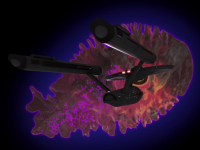
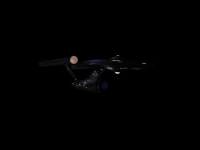
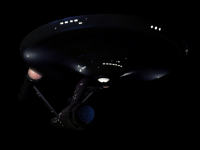
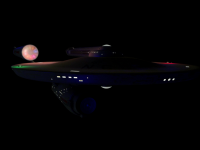
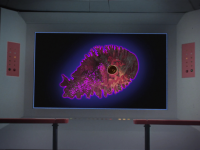
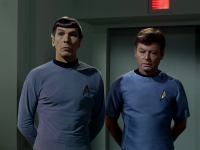
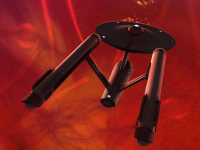
Star Trek TOS - 2x18 - The Immunity Syndrome
Originally Aired: 1968-1-19
Synopsis:
A giant space amoeba threatens the entire galaxy. [Blu-ray] [DVD]
Filler Quotient:
3, bad filler, totally skippable.
- Pretty lame episode with no significant long term continuity.
Problems
- Throughout the episode numerous characters make mention of the giant space amoeba threatening all the nearby "solar systems." This is a common error. The term they were looking for is planetary system. The planetary system we live in is called the Solar System because our star is named Sol. As such, the term "Solar System" is a proper noun, not a generic term.
- At several points during the episode the characters switch fluidly between the metric system and English Imperial Units for no discernible reason. Hardly scientific...
- Spock's explanation in this episode that Vulcan has never been conquered would seem to contradict McCoy's statement in The Conscience of the King where he stated in regards to Vulcan: "Now I know why they were conquered," in response to Spock's refusal to drink alcohol. However, I suspect McCoy's statement was hyperbole in reference to Vulcan's admittance to the Federation, an organization which appears to be run largely by humans.
Factoids
- This episode establishes that it is common for ships in the Federation to have a racial bias. For instance, the Enterprise has a mostly human crew, while the Intrepid has a mostly Vulcan crew.
- This episode establishes that Vulcan telepathy is powerful enough to sense the mass death of Vulcans across relatively great distances.
- According to Spock, Vulcan has never been conquered.
Remarkable Scenes
- Spock sensing the Intrepid's Vulcan crew dying before the ship's sensors could detect it.
- Kirk sending Spock on the suicide mission, much to McCoy's irritation.
- McCoy: "Shut up Spock! We're rescuing you!"
My Review
This episode is a rehash of The Doomsday Machine, but considerably less entertaining, mostly due to the fact that it's slower paced and lacks the subtleties, intrigue, and overall dramatic appeal that The Doomsday Machine had in spades. To fill the time, the episode is laced with useless filler scenes depicting Kirk making all hands announcements or log entries, despite the fact that they only have a short time before the ship is destroyed by the giant space amoeba. Likewise, the scenes with loud, high pitched sounds generated by probe telemetry certainly didn't help the episode's entertainment value either.
The only redeeming quality of the story is McCoy and Spock competing over which of the two shall go on the suicide mission. Their valor combined with their their posturing and mock(?) contempt for one another was rather amusing, although it isn't terribly well established why a probe or even the shuttle itself couldn't have been remote piloted into the center of the space amoeba to mitigate the danger. Likewise, the whole technobabble scene that rambled on about "anti-power" and "everything in reverse" so Kirk could conclude that they needed to detonate an antimatter bomb at the center of the space amoeba was unnecessarily incoherent.
Overall while this episode had some potential despite its unoriginality, it failed to deliver on most of it. What's left is a sombre, depressing, slow, and tired story with no subplots. It reminded me quite a bit of The Corbomite Maneuver for all the wrong reasons.
The following are comments submitted by my readers.
- From rhea on 2008-04-27 at 10:07pm:
True, in a lot of ways it is The Doomsday Machine II, but on the level of character interaction, we still learn something new. The captain is (all too briefly) in captain mode, deciding which of his friends to send to death. The inability of McCoy to wish Spock luck but being worried nonetheless is quite telling, more clearly defining their love-hate-relationship. Spock is remarkable in his stoic expectation of death. What annoyed me was that it was again Kirk who saved the Enterprise with the idea of the antibody and the antimatter bomb, when clearly Spock had the same idea before (but was unable to communicate it). Why not once give the credit to him? - From Orion Pimpdaddy on 2010-06-07 at 2:09am:
I just watched the Blu-Ray version and I thought they did a great job with the new visuals. They didn't do a complete redesign of the organism; they just show more detail. That's a good thing.
As far as my overall opinion of this episode, I'd say it's a good one. There's a lot of tension and drama. Spock embarks on a dangerous mission, Kirk has to make tough decisions, Scotty's having troubles with the ship, etc. I think we see real suffering with the crew, as opposed to manufactured suffering. - From Glenn239 on 2012-09-27 at 1:10pm:
A solid drama-based episode that is in the top 1/3rd. That it was a rehash of the Doomsday Machine speaks for it, not against it. Star Trek repacked everything and I'd rather it reprise its great moments than its weak ones. I find much of what is called 'character building' in the series to be exercises in piling onto pre-existing cliques. I'm much more interested in a story establishing an interesting premise to which the crew responds - like this one does – and then examining the relationships between each member along the way, only as is necessary to resolve the problem. Yes, we get it. McCoy backbites Spock every chance he gets and Kirk and Spock are secretly in love or whatever. Now, can we please go phaser the Klingons? That’s why this episode is a ‘9’; good premise, good resolution, and good character interaction along the way. - From Chris on 2018-08-15 at 5:22am:
What I hate about this episode is...
- When they clearly went into the 'dark zone' and Kirk is mystified as to where the stars went! What????
- McCoy might have survived if he'd been wearing a helmet and a seatbelt!
- Spock's clearly smug attitude towards McCoy about superior whatever... abilities...
I do think that Kirk just took a key from Spock's last transmission and figured out what he was trying to say. I don't think he came up with it on his own.
I liked the McCoy-Spock interactions and thought that part was excellently done! ... for the most part.
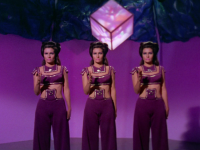
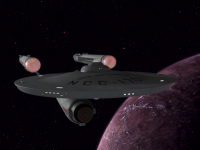
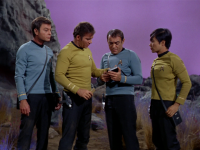
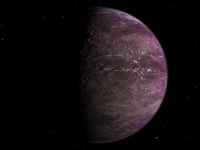
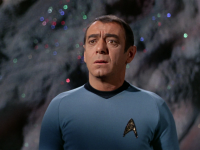
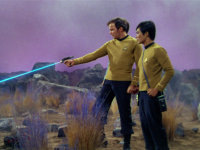
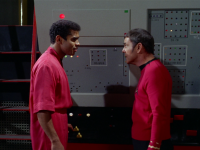
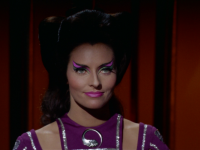
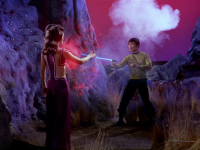
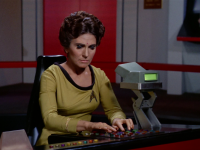
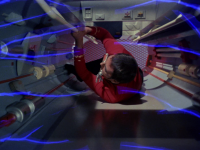
Star Trek TOS - 3x17 - That Which Survives
Originally Aired: 1969-1-24
Synopsis:
A deadly computer image protects a long dead outpost. [Blu-ray] [DVD]
Filler Quotient:
3, bad filler, totally skippable.
- Pretty lame episode with no significant long term continuity.
Problems
- Warp 14.1 (the maximum speed the Enterprise travels during this episode) is nowhere near fast enough for the Enterprise to travel 1000 light years in a single day. Even at warp 15 (~3375 times the speed of light), it still would have taken the Enterprise months to travel 1000 light years.
- The lieutenant at the helm measures the time it will take to arrive at the planet in "solar hours." What the hell is a solar hour?
Factoids
- The Enterprise travels at its fastest (natural) speed ever: warp 14.1.
Remarkable Scenes
- Uhura: "What happened?" Spock: "The occipital area of my head seems to have impacted with the arm of the chair." Uhura: "No, Mr. Spock, I meant what happened to us?"
- Kirk: "Mr. Sulu, if I wanted a Russian history lesson, I'd have brought along Mr. Chekov."
- Spock and Scotty's silly scenes.
- Sulu: "Terrible way to die." Kirk: "There are no good ways."
- Losira withstanding Sulu's phaser blasts as if they weren't there.
- Spock: "Beauty is transitory, doctor."
My Review
A planet even Spock can't explain! I giggled at such an amusingly goofy opening line and I enjoyed the scientific paradoxes presented by the planet. It's only a few thousand years old and the size of Earth's moon, and yet it has vegetation, significant atmosphere, and Earth-like gravity. Much like the mystery of the scientifically implausible planet, Scotty's near-suicide mission and the landing party's terrific command of survival skills in the sudden absence of the Enterprise were nicely done. I also was struck by how cranky Spock was all episode. I've never seen him so difficult to get along with!
The explanation that the planet was artificially created reasonably explains away all the paradoxes, but the story about the people who created it totally fails to deliver. As Losira slowly starts killing people, her inability to communicate anything resembling a motive gets more and more frustrating. In what is perhaps the longest Star Trek has ever dragged out establishing a character motive, Losira's motives only become apparent in the very last scene of the episode.
At the end we learn that her people, who are yet another alien race that looks exactly like humans, died out due to a disease they accidentally unleashed on themselves while creating that planet. The image of Losira attacking people was due to a computerized defense mechanism that was set to auto attack anyone in the vicinity not of Losira's people. Somehow Losira's personality was fused into the computer before she died, which explains her ambivalence to all the killing she did. The end of the story gave us a motive, but not a reason to care, resulting in quite a flop.
The following are comments submitted by my readers.
- From TashaFan on 2008-09-19 at 1:46am:
Another thing I noticed about this is how at the very end Spock shows up with one Redshirt(tm) and one quick phaser shot destroys the computer that was creating the artificial women. (Although it continues to spin in crazy patterns, just more slowly). An awfully quick solution so the danger certainly seems to have been manufactured and then conveniently disposed of once it's time to end the episode, I quite agree. So here's another supercomputer destroyed. But shouldn't Kirk have argued it to death? - From Arianwen on 2010-09-01 at 10:45pm:
Another remarkable scene - or rather sequence - from this episode: Scotty's time in the crawlway. The tension it generates is palpable and the final moments, when he's panicking over the magnetic probe ("it's stuck!") are pure gold. It feels very real; on the whole, a great episode for Scotty.
Also good to see a female goldshirt actually being efficient on the flight-deck, and doing her job, her whole job and nothing but her job. (With a little bit of panicking to keep the crew company.) - From Strider on 2012-07-01 at 4:48am:
I was also very excited to see the female navigator! That actor was also one of the Native American women from "The Paradise Syndrome." While she was portrayed as a competent helmsman, you could also see that she was new to bridge duty and probably to working with Spock, because she makes a few mistakes that a person used to this dirty wouldn't have made. Though it's true tat ST has a mixed record in portraying women, I found these details to be realistic and not necessarily based on Radha's gender.
I liked how big a role D'Amato played before his (inevitable) death--he really seemed to fit into the landing party, like he'd been with them before. And he got to offer some real expertise in his field, as well. Unlike all the doomed redshirts, I was sorry to see D'Amato go. He'd have been a good addition to the supporting cast. The actor who played him, Arthur Batanides, became a very accomplished television actor.
Spock is awfully "Spocky" in this episode, isn't he? None of the irritated humor of "The Mark of Gideon," and none of the stress we usually see when he's worried about Kirk. However, it's my observation that the more deeply Spock feels emotions, the more Vulcan he becomes in response. Also, in this episode, he has what's essentially a science problem to solve, and that's what he's best at.
Lots of good Scotty scenes in this episode as well. I loved when Scotty had just saved the ship against all odds (again) and Spock starts lecturing him on humans' need for gratitude, and Scotty just collapses in the crawlway in relief.
Otherwise this episode's plot is weak, and the disco ball/cube computer corny. And I wanted Spock to tell Kirk, "Dude, we got the Enterprise up to warp 14.1! It was AWESOME!" - From Alan Feldman on 2014-03-27 at 2:07am:
"THAT WHICH SURVIVES"
A solar hour is 1/24th of a solar day. A solar day is how long it takes the earth to rotate once relative to the sun. (Note that a sidereal day is how long it takes for the earth to rotate once relative to the fixed stars, which is about 23h56m. Since the earth has moved about 1 degree in its orbit over that time, the sun appears in a different place, and it takes about 4 extra minutes for the earth to rotate that additional degree.)
So a solar day is 24 hours long.
On a starship carrying humans it makes sense to emulate 24-hour days. In "The Conscience of the King" Kirk even says that's what they do. Hence, solar days on Star Trek.
I like the scene where Scotty saves the ship. But why doesn't Spock say thank you? He says that in other episodes. Anyway, it works here, so that's good.
Yeah, lame episode. What's the point of custom killer women who all look exactly the same? And the light-show computer? Bizarre.
What's with that additional piece of Miss America's costume covering up her belly button? Looks silly. It's purpose is just so blatantly obvious. Didn't we see Nichelle Nichols' navel in "Mirror, Mirror"? And Nancy Kovack's (Nona) in "A Private Little War"?
AEF, a.k.a. betaneptune
- From jeffenator98 on 2019-05-06 at 5:38pm:
Why didn't she have to say "I'm for you transporter room guy"?

Star Trek DS9 - 4x20 - Shattered Mirror
Originally Aired: 1996-4-22
Synopsis:
Sisko follows his son into a war-torn alternate universe after Jake is lured there by the living counterpart of his late mother. [DVD]
Filler Quotient:
0, not filler, do not skip this episode.
- This is the third DS9 mirror universe episode.
Problems
None
Factoids
- Mirror Kira "knows Breen icicles that are warmer than" Mirror Jennifer is.
Remarkable Scenes
- Jake walking in and seeing Jennifer sitting with Sisko.
- Mirror Bashir hitting Sisko back to settle the score from the previous mirror universe encounter.
- Mirror Worf, as a regent in the Klingon military.
- Seeing the Defiant under construction. Cool!
- Mirror Bashir and Mirror Dax evading the Alliance fleet.
- Mirror Kira: "You know I bet if we put our... heads together, we could create a little excitement for ourselves." Guard: "You sentenced my wife to death." Mirror Kira: "Isn't that a coincidence? I was hoping you weren't married!"
- The Alliance attacking the station.
- Sisko taking command of the Mirror Defiant.
- Mirror Kira murdering Mirror Nog even though he was on her side!
- The Defiant kicking some ass!
- Mirror Kira murdering Mirror Jennifer.
- Mirror O'Brien: "Shields are down to 40%! That cruiser has us in weapons range! Should we make a run for it?" Sisko: "We run all right, right at it!" Mirror O'Brien: "Ah, pattern suicide!"
- Sisko taking the helm.
- Mirror Bashir and Mirror Dax showing up at just the right time.
My Review
Picking up from where we left off in DS9: Through the Looking Glass, Bashir hits Sisko back. :) Okay, seriously, the rebellion has made progress. They captured Terok Nor, and moved it! (Bajor is no longer in the background.) O'Brien stole the plans for the Defiant during his last visit to DS9. Everybody's manipulating everybody in this episode. Jennifer manipulates Jake, O'Brien manipulates Sisko, Garak manipulates Worf, and so on. A complex web of drama ensues. In the end, we get a rather basic confrontation. The Defiant struts her stuff against a fleet of Alliance ships! Maybe it was all a cheap excuse to show us a completely inconsequential VFX battle, but it was a lot of fun to watch! Nothing like a mirror universe episode to to superfluously spice up a season. :)
The following are comments submitted by my readers.
- From Chris Wright on 2011-11-29 at 3:46am:
I liked this episode a lot, but it would have been nice if mirror universe Worf had confronted Sisko face to face. I also see this episode showing us how incredibly powerful the Defiant is. If the Federation can make one it can makes thousands and never worry about the Klingons or the Dominion. Loved the Bashir-as-Han Solo-you're all clear kid-moment. - From L on 2013-05-27 at 10:21am:
I missed the episode that set all this up due to a scratched library dvd. So in the alternate universe everyone's a jerk and inappropriately sexual? Got it. - From McCoy on 2017-01-21 at 12:32pm:
Well, that was a horrible episode. I really like DS9 more than other series (exept TOS - this one is my fav), but all the mirror episodes are just bad. However I like one moment in this episode - Worf: "Make it so!". - From Armsauce on 2018-07-15 at 7:05pm:
Mirror Nog is great

Originally Aired: 1996-5-6
Synopsis:
Tuvok and Neelix fuse into one. [DVD]
Problems
None
Factoids
None
Remarkable Scenes
- Neelix: "I've been studying Vulcan music, do you know that lovely tune that starts, 'Oh starless night of boundless black...'" Tuvok: "That lovely tune is a traditional funeral dirge." Neelix: "I know. But it was the most cheerful song I could find in the Vulcan database."
- Tuvix' appearance.
- Tuvix blurting out "sex" for seemingly no reason at the briefing.
- Tuvix, taking charge of the galley: "All right, everybody out!" Crewman: "On whose authority?" Tuvix: "Chief of security or head chef. Take your pick! Out, out out!"
- Janeway regarding Tuvix: "His cooking is better than Neelix's."
- Tuvix announcing he doesn't want to be separated.
- Tuvix and Janeway arguing over who should live and who should die.
- Kes admitting to Janeway she wants Tuvix to go through with the separation.
- Tuvix freaking out on the bridge when Janeway reached her decision.
- The doctor refusing to perform the surgical separation.
My Review
This episode is somewhat controversial. In one respect it's like Voy: Faces backwards, which is cool. It would have been nice if someone's lines made a reference to that episode given the similarities. I'm sure Torres and Tuvix would have had a lot to talk about. Some highlights, the actor selected for Mr. Tuvix was perfect. His voice indeed sounded like a merger between Tuvok and Neelix. In this episode, Janeway blatantly breaks the Prime Directive when she murders Tuvix. A decision which I wholeheartedly agreed with, though it made the episode no less tragic. Some people totally disagree with her. In fact, AFAIK, neither Tuvok nor Neelix were particularly popular characters when this episode was aired. Granted, Tuvok is my favorite character, I might have had some bias. I wanted them to be split. Though I was disappointed with how Tuvix met his end. Certainly it was realistic for him to try and preserve his life, but he could have gone out with more dignity. Another way this episode could have been better is if Tuvix was a recurring character. It would have been nice to see him in the place of Tuvok and Neelix for several episodes, perhaps even a season or two. It would make his demise so much more moving. Granted, what Janeway did is downright tragic, this episode seems a minor missed opportunity to me.
The following are comments submitted by my readers.
- From Remco on 2009-02-12 at 2:54am:
Damn, this is a scary thing for Star Trek to do. Janeway kills an innocent life form. I really like Tuvok and Neelix, but Janeway's act of involuntary euthanasia to improve the situation of two other people is just morally wrong. It brings to mind some Nazi imagery. They systematically killed elderly and handicapped. For the good of the country, they argued.
I wouldn't be too disturbed about this if Star Trek wasn't always about an almost perfect world, certainly where Starfleet is involved. This final decision is something you'd expect to happen in Battlestar Galactica, not in the highly moral world of Star Trek.
So, while this was an excellent episode emotionally, I have to question what the creators think of the moral issue. Do they think forced euthanasia is somehow justified in certain circumstances?
Maybe it's more acceptable to people who support the death sentence, which I don't. But hey, we're all biased.
Hard to rate, this one. - From JRPoole on 2009-03-24 at 4:04am:
Wow. If I'd known ahead of time that this episode was about a transporter accident fusing Neelix and Tuvok, I may have skipped it because it has all the makings of a really bad episode. As soon as Tuvix appeared on the platform, I was ready to give this one a zero.
However, they pulled it off. I like this episode precisely because the ending is uncomfortable. There really isn't a right decision here, and Janeway, to her credit, made a very hard choice. It's all too often that Trek is too moral for its own good, and it's nice to see an episode that presents a moral decision as a real challenge, not something that seems obvious from the beginning.
The only real quibble I have here is that there's no time to get Tuvok and Neelix's reactions to the incident. Nice work all around-especially by Kate Mulgrew, who acts this one perfectly--and definitely one of the best Voyager outings so far. - From Mark McC on 2009-06-06 at 11:12pm:
Having seen the synopsis before watching this episode, I was prepared for a lighthearted affair. Boy, was I wrong!
I disagree on the portrayal of the Tuvix character. I was expecting him to be a conflicting mixture of the two personalities but the combination of Tuvok's cool logic and subtle humour and Neelix's over-the-top emotional outbursts and irrating cheerfulness seem to have cancelled each other out. Tuvix to me was a bland character with little personality and no appeal.
I'm not sure what to think of Janeway's decision at the end. I may be wrong, but haven't we seen transporters being used to duplicate material before now (I'm thinking of duplicate Riker here) ?
If so, surely they could have found a way to restore Neelix and Tuvok while keeping Tuvix. Tuvix certainly didn't contain every molecule of both Neelix and Tuvok's bodies (he was definitely shorter than Tuvok) so the transporter must have had to replicate their bodies using Tuvix's DNA as a starting point. Why would this need to be a destructive process at all? - From siukong on 2010-08-09 at 7:38am:
Most of the time in Star Trek I'm willing to suspend my disbelief when it comes to other species being virtually identical to humans. In this case I can't really let it slide though. I tell myself that if I'm accepting teleportation I should accept anything, but as someone with a biological background I just can't. Hybrids just don't work that way.
The writers would have us believe that Vulcans and Talaxians - two species separated by thousands of light years - are so anatomically similar that something like this could happen with absolutely no complications. Which brings me to the second reason I dislike this episode: Janeway's final decision. If some sort of organ incompatibility was forcing her to bring back Tuvok and Neelix it would make sense, but as it stands I don't get it. It makes Janeway out to be very inconsistent. She apparently finds things like suicide and capital punishment to be abhorrent, but not this? This feels very out of place in context with the values espoused in the rest of Star Trek. - From penguinphysics on 2010-11-07 at 5:51am:
Just one question: How many lungs did Tuvix have and how many did Neelix have when they were separated? - From Pete on 2012-01-31 at 11:18am:
To siukong, did you ever see the ST: TNG episode "The Chase"? It basically makes it canon that all humanoid races in the galaxy are created from the same stuff and was populated by an "elder race." TOS' "Return to Tomorrow" also kinda hinted at this. On this basis, it's not that difficult to accept that such a merger as Tuvix could occur.
I see your point, though. - From peterwolf on 2015-06-26 at 3:04am:
THe whole story is ambiguous and comes to an inevitable end, in which both Tuvok and Neelix have to be restored. Something is wrong 9n the storyline. It seems that both Neelix and Tuvok have become quite weak and even cowardish when to decide to split or not to split. Certainly, it was the wrong approach for the story that janeway akes the tough decisions. It would have been much better, if Tuvix had decide on its own to split in the two persons again. Thus, Janeway showed no strength but mercilessness, which leaves just bad feelings afzer the episode. Wasted opportunities. - From Rick on 2017-04-28 at 12:34am:
"In this episode, Janeway blatantly breaks the Prime Directive when she murders Tuvix."
What? What does this action have to do with the Prime Directive? And please dont try to say that Tuvix is a new species and blah blah blah. This isnt related to the Prime Directive. - From Mike on 2017-07-04 at 1:42am:
This episode has an interesting parallel with DS9: Facets, when Odo and Curzon Dax decide they prefer to remain a single being. OF course, the main difference is that they are ultimately convinced to separate again, whereas "Tuvix" is separated involuntarily. But the fundamental problem remains: whose decision is it, really? Does the hybrid being have the right to continue to exist when the two beings that are part of the hybrid never had the intention of making the union permanent?
All the talk about murder and the ridiculous Nazi comparisons made above are pretty much out of line to me. Janeway was making a very tough call, and I love how the episode leaves you conflicted and not at all morally satisfied at the end. Judge all you want, but it was a difficult decision. Had Janeway agreed to allow Tuvix to remain, she'd have been overriding the desires of two people, neither of whom entered this arrangement voluntarily and certainly would have preferred to continue living their own lives. - From Martin on 2020-01-22 at 2:55am:
Loved the episode
Just one ditail: transporters can copy a patter and replicate it. We've seen that sort of thing in TNG episode where Ricker is splitted in to two identical people
what about copying Tuvix's pattern, separate it and bringing both tuvok and neelix, but also keeping tuvix life? 3 people could've been saved, not only one or two, exclusively
i'm i wrong here ?

Star Trek DS9 - 1x17 - The Forsaken
Originally Aired: 1993-5-23
Synopsis:
While an alien entity wreaks havoc with the station's computer, the irrepressible Lwaxana Troi sets her sights for romance with Odo! [DVD]
Filler Quotient:
1, partial filler, but has important continuity. I recommend against skipping this one.
- This is the first episode in which Lwaxana and Odo meet. She only appears in two more episodes, but if you watch any of those two episodes, make sure you see this one first. We get tidbits about Odo's past in this episode. He was discovered and "raised" by a Bajoran scientist. Odo's appearance is designed to mimic that scientist.
Problems
None
Factoids
- Lwaxana claims that Betazoids can't read Ferengi.
- Odo claims that Doptarians are distant relatives of the Ferengi.
- This episode establishes that Odo does not need to eat.
Remarkable Scenes
- Sisko handing off the duty of "handling" the ambassadors to Bashir.
- Lwaxana's appearance. I love how she calls Quark a troll. Good continuity with her previous Ferengi encounters.
- O'Brien having another fight with the computer. Reminds me a lot of Scotty. :)
- Bashir: "The 'young woman' over there has over 300 years experience."
- Lwaxana trying to seduce Odo.
- Lwaxana's thin beige line line.
- Odo discussing his "problem" with Sisko.
- Odo trying to avoid Lwaxana.
- Kira: "Great. Everything's in working order, but nothing's working!"
- Lwaxana telling Odo the story of her experiences in TNG: Menage a Troi.
- Bashir: "Nothing makes them happy. They are dedicated to being unhappy and to spreading that unhappiness wherever they go. They are ambassadors of unhappy!"
- Sisko taking "perverse pleasure" in giving Bashir this assignment.
- O'Brien trying to point out the subtle differences in the computer. "A different attitude."
- O'Brien: "Working with the Enterprise computer was like dancing a waltz. With this computer it's always been like a wrestling match."
- Odo describing his past.
- The main cast overloading the computer with commands. O'Brien "building a dog house."
- Bashir saving the ambassadors.
- Morn appearances; 1. Can be seen in the background when Bashir is talking to the ambassadors.
My Review
This the best episode since the pilot, simply because of the sheer wonderful humor. The alien probe plot thread isn't particularly interesting, but it is original and the way the crew deals with it is greatly entertaining. I most enjoyed the dialog between Lwaxana and Odo toward the end, where they finally begin to connect with one another. Lwaxana then protects Odo from leaking into the active current. Odo rarely places his life in someone else's hands and it's done well here. The thing that makes this episode both nice and unusual compared to other episodes aired so far is its wide use of characters and its number of plot threads. First there's the plot thread about Bashir and his ambassadorial duties. Then there's the plot thread about Lwaxana and Odo. Then there's the plot thread about O'Brien and the computer. Arguably another albeit short plot thread occurs when Sisko splits away from O'Brien to save Bashir from the fire. There's four separate stories going on simultaneously by the end of the episode. A nicely complex story compared to what else has aired so far.
The following are comments submitted by my readers.
- From Bernard on 2009-12-31 at 4:07pm:
Quite a sweet episode, everything seems to tuck into place neatly by the end. Marvelous performances by both Rene Auberjonois and Majel Barrett Roddenberry ultimately carry this episode to it's decent score from me, a 7. - From Fan on 2011-08-12 at 6:38am:
I was going to whine a little about how Odo being contained in the folds of Lwaxana's dress was unrealistic, but I figured it out - her dress would just have to be made out of some kind of non-porous or micro-porous material, and the whole matter would've had to have been kind of sloppy (which would actually add to the story some, because it works even better as a kind of double entendre for something else that's messy and private and involves trust and vulnerability, and also makes the whole event even more significant for Odo, with Lwaxana's active efforts saving his life).
Maybe some of this should've been hinted at in the actual episode instead of just having that shot of Odo melting into the folds of her dress?
Anyway, this episode was quite good. There was a lot of good humor, as the review suggests. Odo's facial expressions and body language in the elevator is priceless. O'Brian's plan to adopt the non-biological lifeform by creating a stimulating "doghouse" program - that was pretty great too. Oh yah, Bashir getting the commendations at the end from the "Ambassadors of Unhappiness" - also good - From Abigail on 2019-08-30 at 10:19pm:
I actually thought this episode was really boring. The Lwaxana/Odo interaction was somewhat entertaining, and we got some good backstory about Odo, but that was about 5 worthwhile minutes out of a 45-minute, generally dull and pointless, episode.
I do seem to be in the minority with this opinion, though, it appears!

Star Trek DS9 - 6x24 - Time's Orphan
Originally Aired: 1998-5-20
Synopsis:
While on a picnic, young Molly O'Brien disappears in a mysterious vortex, only to reapear as an 18-year-old woman. [DVD]
Filler Quotient:
1, partial filler, but has important continuity. I recommend against skipping this one.
- Worf's impassioned speech about his various accomplishments qualifying him to be a good babysitter is relevant to later Dax episodes. The line is in fact quoted in full at least once. If you haven't seen this episode, then you won't fully understand the reference. It is however a fairly minor detail.
Problems
None
Factoids
None
Remarkable Scenes
- Seeing O'Brien's family again. Keiko, Molly, Yoshi, and even Chester! Keiko hates Chester. :(
- O'Brien and Keiko helping Molly assimilate back into society.
- Worf: "I am a Klingon warrior and a Starfleet officer. I have piloted starships through Dominion minefields. I have have stood in battle against Kelvans twice my size. I have courted and won the heart of the magnificent Jadzia Dax. If I can do these things, I can make this child go to sleep!"
- Old Molly saving young Molly.
- Morn Appearances; 1. Is seen when Molly freaks out at Quark's.
My Review
Keiko's return! We haven't seen her since DS9: The Begotten and it's a welcome reunion. I'm kind of miffed that Keiko hates Chester, but I suppose it's only natural. After all, O'Brien "acquired" him without her consent. What a control freak. :( Getting to more serious topics, this is Molly's episode. An innovative and original premise to make Molly prematurely grow up. Michelle Krusiec does a superb job playing the older Molly, convincing the viewer that she was a feral child for the last ten years. The ending is the obvious best moment for the episode; there's no doubt in my mind that she knew what she was doing when she sent her younger self through the little time portal. That's one of those moments that makes you sad and happy at the same time. Well done.
The following are comments submitted by my readers.
- From Abigail on 2008-12-26 at 3:58am:
Maybe time travel isn't really supposed to make sense, but I never got a good explanation out of this episode for how the 8-year-old Molly and the 18-year-old Molly could end up in the portal simultaneously. If it was just because the 18-year-old was sent back a few moments after the 8-year-old arrived, that's not really a good enough explanation. If they had sent her back four years later, would she have found 12-year-old Molly?
Also, it disturbed me that Keiko and Miles were even willing to send the 18-year-old back. I didn't see that as the best option. However, since she ended up finding her younger self, it was still a satisfactory ending (minus the fact that I'm a little confused about how she found her younger self ...) - From Damien Bradley on 2013-02-18 at 7:56am:
Bah! Reset button episode. The whole time I was thinking, "they had better not get the 8 year old Molly back." ... but they did. That kind of ruined it for me. I thought it would be really cool to see how this new, 18 year old "feral" Molly would progress and re-integrate herself into society, but no, they of course found a way to magically get the original Molly back. I'm surprised you liked this episode, Eric; you mention reset buttons all the time and how annoying they can be. - From OmicronThetaDeltaPhi on 2014-06-30 at 2:14am:
It was an interesting episode. It was a moving episode. But one thing deeply bothers me about it: The outrageous attitude of the Federation Magistrate towards Molly.
He wants to take a frightened girl away from her parents by force, and lock her up in a "special care center". Without even seeing her. Without consulting her parents. Without even having a hearing.
What's the deal with that??!! Is this Star Trek, or "One Flew Over the Cuckoo's Nest"?
Fans usually target episodes like "For the Uniform" and "In the Pale Moonlight" as being anti-Roddenberry. But to me, it is episodes like this one which put the biggest stain on the utopian future that Star Trek is supposed to be.
- From ChristopherA on 2021-04-05 at 7:55pm:
@OmicronThetaDeltaPhi: I don’t remember it that way. The dialog is set up in such a way to make the protagonists sympathetic and the Federation official seem heartless. But actually, she is in jail for knifing someone, presumably she had a hearing but it is irrelevant since we know she is guilty, they don’t need her parents’ permission to detain her, in fact it would be inappropriate to just ignore the crime and release her to her parents. Moving her to a detention facility where she can actually get psychiatric help is actually far more helpful than just a normal prison.
The works into one of Abigail’s points, that even though the narrative is designed to support the O’Brians’ belief that the only solution is to return her through the time portal, that is pretty questionable. Sure, her parents tried to help her and failed, but maybe, just maybe, a staff of experienced psychiatric expert actually COULD help her acclimate where her layman parents could not. Humans are social animals, they could at least give it a try before they commit various crimes and muck around with time travel equipment they don’t understand in order to condemn her to a life of eternal solitude.
I thought the concept of the episode was worthwhile and interesting to think about, but it was kind of boring to actually watch, definitely not my favorite.

Star Trek Ent - 4x02 - Storm Front, Part II
Originally Aired: 2004-10-15
Synopsis:
With Silik's help, Archer hones in on the temporal operative who altered Earth's past and threatens to destroy all of time. [DVD]
Problems
- What was that huge fleet doing there at the end of the episde?
Factoids
None
Remarkable Scenes
- The teaser. Hilarious!
- Alicia regarding the transporter: "How does that thing work anyway? ...on second thought I'd rather not know."
- Silik masquerading as Trip.
- Silik helping Enterprise.
- Silik as a human!
- Silik bickering with Carmine.
- Silik taking out several Nazi officers.
- Silik being shot!
- Trip thinking Archer is Silik.
- The upgraded German dive bombers.
- Daniels saying goodbye to Archer, declaring the Temporal Cold War over.
My Review
And so the Temporal Cold War is over. Ent: Storm Front wasn't the best two parter, but consistent with Star Trek's lackluster season finales and premieres of late. I gave Ent: Storm Front, Part II extra points because the Temporal Cold War and hopefully all of Time Trek has finally been put to rest. I also gave the episode a higher mark due to Silik's involvement. I was really sad that they killed off Silik. I was really beginning to like him as a character, but the Temporal Cold War was just the wrong direction for the series and killing off the Temporal Cold War means putting Silik out of the picture. I'm sure the new direction the show is taking is due to the new showrunner, Manny Coto. One can only hope he finally kickstarts the Earth-Romulan wars and the conflict with the Klingons.
The following are comments submitted by my readers.
- From Edward on 2014-09-14 at 4:41pm:
I wouldn't mind another Nazi story if it wasn't so bad constructed:
The aliens kill Lenin in 1916 and Russia never becomes comunist. So in 1939, instead of the USSR Hitler split Poland with, there is the same Russia that fought the Germans in World War I.
How is that not a threat?
- From Dstyle on 2015-10-23 at 5:55pm:
Daniels: "Hey, this Temporal Cold War is heating up pretty fast! Looks like Vosk has been meddling about in 20th century Earth, messing up the whole time line! He needs to be stopped!"
Daniels' fellow Temporal Agent: "Agreed! So, should we send a ship from the 29th century to go deal with him?"
Daniels: "Nah, I was thinking maybe Archer and the NX Enterprise."
Temporal Agent: "Uh, Archer? The guy who is so crucial to the forming of the Federation that you're always trying to make sure he doesn't put himself in danger by going on missions himself? You're thinking you want to send him and his 22nd century star ship? The one with 'hull plating' for shielding? The one that can barely do Warp 5?"
Daniels: "Yup, if anyone can do it, Archer can!"
Temporal Agent: "Well, I can think of a few better candidates for this mission: people who are trained and prepared for temporal incursion, like..."
Daniels: "Sorry, gotta run! I want it to be a surprise!" (disappears into a time tunnel or whatever)
Okay, the whole premise of this double episode is absurd if you think about it for longer than 10 seconds, but I can look past that if it finally ties up this Temporal Cold War. The thing that really bothers me are the Nazis. The damn Nazis. Seriously, Enterprise? Why not just give the Nazi aliens glowing red demon eyes while you're at it? Oh, right, you did.
HEY VIEWERS! THOSE RED EYE ALIENS ARE EVIL! LIKE, SERIOUSLY EVIL! LOOK, THEY'RE EVEN WEARING SWASTIKAS AND EVERYTHING! WHAT'S THAT? 'WHY AM I YELLING?' I'M NOT YELLING! WHAT ARE YOU TALKING ABOUT? I'M BEING SUBTLE!
It's annoying, sure, but it also does the narrative a grave disservice. There's that scene where Vosk is talking to Archer about how his species has a very different view of time travel technology than the view laid out in the temporal accords: how it can be used carefully and judiciously to make improvements in the timeline and help better your civilization. It could have been an interesting and nuanced way of looking at the issue of time incursions from a different angle, but, NOPE! Dude is dressed like Hitler! Can't take any of the shit he says seriously!
I mean, I suppose the implication could be that, in the wrong hands, time travel technology could lead to catastrophic outcomes (LIKE IF THE NAZIS HAD THIS TECHNOLOGY! SEE WHAT WE DID THERE?), but it would have been much better if the writers had trusted their viewers (and Archer, for that matter) to come to that realization on our own.
- From MJeffries on 2016-10-08 at 1:59am:
Dstyles
I have been reading star trek reviews and comments for some years now and never once commented myself but your fictitious conversation between Daniels and other is so hilarious that I could not resist. it made my night, good job - From Zorak on 2016-10-15 at 3:57am:
So at this point there is someone new running things huh? Interesting. I certainly didn't hate Enterprise up to this point. It just had so many ups and downs. Long stretches of good episodes and long stretches of bad episodes.
This whole Nazi thing was definitely pretty ridiculous. It wasn't really boring though. They could have done a worse job killing off the Temporal Cold War. A decent set of episodes for getting rid of an unwanted problem.
I'm with you. The whole temporal cold war was a poor decision for this series.
I look forward to seeing the new direction they take things from here.
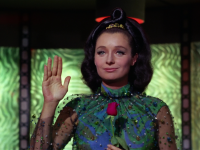
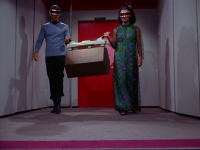
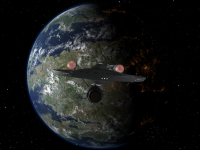
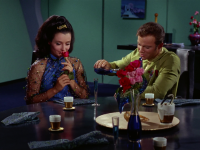
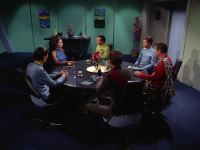
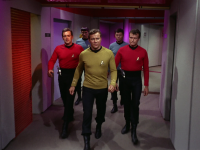
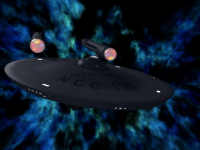
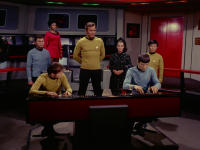
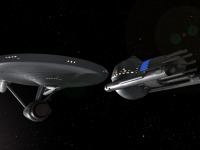
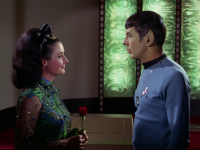
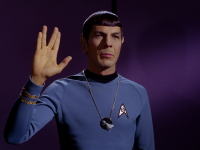
Star Trek TOS - 3x05 - Is There In Truth No Beauty?
Originally Aired: 1968-10-18
Synopsis:
The sight of a Medusan ambassador causes insanity. [Blu-ray] [DVD]
Filler Quotient:
3, bad filler, totally skippable.
- Pretty lame episode with no significant long term continuity.
Problems
- When they cross the barrier at the edge of the galaxy, Spock says: "When we exceeded warp speed factor 9.5, we apparently entered a space-time continuum." As if they weren't in one to begin with? What a poorly written line.
- At the end when Miranda and the Medusan ambassador beam off the ship, Spock puts on his protective visor, but Kirk does not.
Factoids
- This episode contains the first display of the Vulcan symbol of IDIC and the mention of its philosophy.
- Diana Muldaur, who plays Miranda Jones in this episode, has previously appeared as Ann Mulhall in Return to Tomorrow.
Remarkable Scenes
- Scotty realizing he's in the same room with the attempted murderer.
- McCoy: "He's dead, Jim." Count 7.
- The revelation that Miranda is blind.
- Spock becoming the alien ambassador.
My Review
An episode with a lot of intriguing ideas but so poorly executed that they fall flat for the most part. The delightful actress Diana Muldaur having already played Ann Mulhall in Return to Tomorrow returns to Star Trek for a second time to play the blind telepath Miranda Jones in this episode. This time around she is given a much stronger character to play, but unfortunately while Miranda was well conceived and stunningly original, her central motivation of jealousy wasted much of her terrific potential.
Adding to the list of disappointments was the entire concept of an alien that is quite literally too ugly to be observed. While I'm glad the writers attempted to do a truly alien alien, their goal for this plot point of trying to make a commentary about human vanity didn't quite play, as in order for the concept of insanity induced by the mere sight of something to make any kind of sense at all, we have to assume the harmful exposure somehow induces some kind of neurological damage rather than the insanity being caused simply by some component of human shallowness as the episode repeatedly tries to imply.
In that regard, introducing a character like Larry, a man who participated in the design of the Enterprise, was a wasted opportunity. Aside from some quick lines of admiration from Scotty, Larry turns out to be little more than a throw away character to make the Medusan ambassador and Miranda seem dangerous. He spends much of the episode acting clingy toward Miranda in ways that stretch the character's authenticity to the breaking point.
I can certainly see why Miranda wouldn't want to return the affections of a man acting like that, but she acted nearly as irrational throughout much of the episode too, which came as a surprising disappointment for a human character so well versed in Vulcan mental discipline. Especially disappointing was the scene when she misinterpreted Spock's display of the Vulcan IDIC as some kind of personal attack. From that moment forward, her character started to go downhill.
The climax of absurdity for Miranda's character is the moment when Kirk resigns himself to distracting Miranda in the garden while Spock attempts to merge with the Medusan ambassador. The whole scene is premised on the idea that everyone expects Miranda to be too overpowered by her jealousy to allow Spock and the Medusan ambassador to save the lives of everyone on the ship. Once again, like the children from the previous episode, I'm wondering why they didn't just phaser or sedate Miranda if they were so afraid of her presence being that disruptive in a crisis situation.
While I enjoyed that Miranda's layers of complexity were revealed slowly over the course of the plot, the cleverly late revelation of her blindness in particular, her character flaws ended up being flaws in the story rather than the successful establishment of a tragic character. By the end, I felt that the rose metaphor applied more to the episode itself than to the character of Miranda as the writers intended. It's the episode itself that had the beauty and potential for profundity but was marred by the thorns of poor plotting.
Aside from the mixed impact of Miranda, another notable detail was the unusual cinematography of the episode. The Spock POV fight scene was especially interesting to watch and there were a few other similarly oddly shot scenes throughout the episode too. But unfortunately not all of them worked. Much of it felt as though the trippy cinematography was an attempt to distract the audience from a story that verged on incoherence at times.
Last but not least, I'm left to wonder what is it with telepathy episodes and the ludicrous fictional barrier at the edge of the galaxy? This annoying barrier first featured in Where No Man Has Gone Before makes an unwelcome recurrence in this episode, complete with new annoying details to further assault the realism of the story, such as the fact that only a few minutes moving past warp 9 was sufficient to take the Enterprise past the barrier. They must have coincidentally already been pretty close to the edge of the galaxy already for that to happen.
When they cross the barrier, Spock utters perhaps the most ridiculous line ever written for him, when he says, "When we exceeded warp speed factor 9.5, we apparently entered a space-time continuum." Seriously? Something tells me the writers didn't know what a space-time continuum is and were hoping the audience would share their ignorance about one of the most basic concepts in theoretical physics.
Anyway, while this episode definitely has some fun concepts, it could have used a lot more polish before it ever got in front of cameras. A shame.
The following are comments submitted by my readers.
- From Mike on 2008-08-13 at 5:24pm:
Re-watch the film, and pay attention to the extraordinary music and crazy direction. While there are clearly stupid/silly sides to this episode, the filmmakers of ST are still taking things VERY seriously. You can't see filmmaking this crazy outside of avant-garde filmmaking in the 1960s; not even Twilight Zone. - From Orion on 2011-03-16 at 5:26am:
The story could have used a few rewrites. It just jumps from situation to situation and ends up being a typical "get the ship out of danger" episode when it could have been something a whole lot deeper. - From Deggsy on 2012-02-28 at 1:25pm:
Was it established that this was the Great Barrier we've seen in previous episodes? I assumed that it was just a re-used shot, and that the Enterprise has slipped into a pocket of subspace similar to the Chaotic Space in the Voyager episode "The Fight", and so needed assistance to navigate out of.
The one factor of this episode I cringed at the most was how everyone (okay, the men) fawned over the character, declaring her to be so beautiful. It's what the Jabootu website calls an Informed Attribute, where the characters tell us about it rather than show it. Diana Muldaur is a handsome woman, but you'd think these men didn't see women all the time onboard... - From Old Fat Trekkie on 2012-02-29 at 1:28am:
Well Deggsy, I can see you haven't made your way to "Mudd's Women" yet. In that episode the men didn't fawn, they actually drooled. And, yes, it is the same barrier – and of course, in both episodes it is quite idiotic. If it actually did exist, how could one ever see anything outside of the Milky Way? Let’s just chalk it up to less than perfect writing. But, then again, who would have ever thought at the time there would be fifteen thousand PhD theses picking the series apart, or that folks wold be doing exactly what you and I are doing right now.
Keep on Trek’en,
Old Fat Trekkie - From Alan Feldman on 2013-04-06 at 3:56am:
"Is There in Truth No Beauty?"
Problem: If the Medusan is too ugly to look at, why are we, the audience, given any glimpse of it at all? If it doesn't make us go mad, why should it be able to make any of the characters do so?
AEF, aka betaneptune - From Stefan on 2013-04-10 at 10:35am:
Apparently this episode was subject to "executive meddling" after shooting was done, according to the director. http://senensky.com/is-there-in-truth-no-beauty/ - From jd_juggler on 2015-03-26 at 8:51pm:
This episode establishes that people still play tennis in the future.
It also shows the rare (if no completely unprecedented) instance of Kirk being completely unsuccessful in his efforts to seduce a woman. She gave him absolutely no encouragement but he still tried to kiss her. - From Farfle on 2016-09-02 at 4:42am:
There were some funny moments. The first, while perhaps not intentional, I couldn't help but chuckle:
1. Right after Kirk was trying to seduce her in the garden, and she was having none of it, they then find out she was blind, and immediately Kirk says "Well that makes perfect sense!"
2. On the bridge right after the Ambassador inhabits Spock's body, Spock starts talking all weirdly and Bones turns to Kirk and says "That's not Spock", Spock then makes a deriding reply to him, in which Bones turns to Kirk again and says "That's Spock!" with a smile on his face.
As I'm watching the whole series through, when I get to episodes like this that are original, I'm finding myself enjoying them more and more even if they do have their problems. Give me ones like this any day (as well as Spock's Brain) vs the same crappy reused stories and ideas Gene Roddenberry bludgeoned us with back in Seasons 1 and 2. - From Peterwolf on 2020-06-26 at 8:46pm:
Contrary to most other comments, I think that this episode is truly beautiful in many ways. The dialogues are very well written, some camera scenes are excellent like in the best art films of the 1960s, perfectly accompanied by the uncommon music and the acting is on a higher level than in most other TOS episodes. The marvellous sparkling lights suggest that the Medusan Kolos could be too beautiful and not too ugly to see him without getting mad ... Miranda is an exceptional female character, which is realized by distinct and specific relationships to four men: The unfortunate rejected lover Larry, McCoy, who admires her, Kirk, who respects her, but tries to trick her, in order to give Spock an opportunity to prepare the mind link with Kolos and Spock as rival. Miranda tells Kirk "you are a complicated man", which shows a deep understanding of Kirk's ever emerging inner conflicts throughout the whole TOS series. That much about continuity. Above all, Miranda and Spock have to solve the most serious conflict. The merged Spock-Kolos character speaks some of the most beautiful and poetic sentences in all Star Trek series. There are so true words about human nature, spoken with emotion and wisdom. Eventually, the opposing characters Spock and Miranda end up in a mutual mind-meld, which solves the conflict in a rather serious happy end. Seemingly, this episode had too little action, like starship phaser battles, but too much psychology and philosophy in it. I give 12 points or more.

Star Trek TNG - 3x19 - Captain's Holiday
Originally Aired: 1990-4-2
Synopsis:
Picard's vacation is interrupted by time travelers. [DVD]
Problems
None
Factoids
- Max Grodenchik, who played Sovak in this episode, goes on to play Rom in DS9.
Remarkable Scenes
- Everyone pressuring Picard to take a vacation.
- Picard annoyed at everything during his visit initially.
- Picard insulting the Ferengi.
- The time travelers' appearance and Picard's sudden interest in the mystery.
- Picard thoroughly enjoying punching the Ferengi.
- Vash and Picard flirting.
- Vash's deception to Picard regarding the treasure.
- History fulfilling itself by Picard destroying the treasure.
My Review
Welcome to Risa. The infamous pleasure planet. Vash, Sovak, and the time traveling aliens provided a most entertaining story, though It was all a little too silly. A fairly average episode.
The following are comments submitted by my readers.
- From Whoa Nellie on 2007-04-15 at 8:45pm:
This episode is a perfect 10. It was marvelous to get to see the relaxed, off-duty Jean-Luc Picard suavely romance the beautiful, lady archaeologist. Wonderfully written by Ira Steven Behr, this episode is an homage to the great romantic films of the 40's. Vash is Bacall to Picard's Bogart. Watch Bogart and Bacall in the classic movie "To Have and Have Not" and then watch "Captain's Holiday." Vash's brazenness complements Picard's more sedate personality perfectly. Picard and Vash have a very compelling 'battle of wills' dynamic to their relationship. The characterizations and relationship dynamics between Picard and Vash makes this episode a pure joy to watch this episode.
- From DSOmo on 2007-07-28 at 4:27am:
The Uthat is located in a cave that is twenty-seven kilometers from the resort. It takes Picard and Vash two days to get there. Yet when they leave, they leave their backpack behind. The backpack had their food, drink, and bedding. Did they steal Sovak's transportation? Did they "rough it" all the way back? - From JRPoole on 2008-04-10 at 11:56pm:
This is a fun episode, but not a truly great one. I agree with the review above in that it's great fun to watch Picard off of the Enterprise, especially when he "pulls a Kirk" and hooks up with the guest star of the week. I also like the alusions to the films the reviewer above mentions, and the whole episode is good entertainment.
The result of all this, however, is that it's hard to take this episode seriously. If the Uhtat is all it's cracked up to be, it could have been the subject of a seasons-long plot arc. As is, it's largely tossed off. This brings me to another gripe. If the Vorgons are really time travellers from the 27th century, why can't they just time travel again, back to five minutes before Picard destroys the Uhtat now that they know how, when, and where he does it? Like the aliens in "Allegience" a few episodes earlier (who, by the way, look very simliar)
And the Uhtat itself is a little problematic. A crystal? Really? Come on.
All that aside, this is a solid episode if you don't think too much about it. The interaction between Picard and the crew is hilarious, especially at the end, and we weren't subjected to a lame sub-plot about what was going on onboard the Enterprise during Picard's absence. - From KStrock on 2009-03-09 at 3:39am:
Why does Riker mention Risa like Picard's never heard of it? Even Archer and crew were well aware of Risa's reputation. - From Inga on 2012-01-21 at 6:29pm:
The dialogues between Picard and Vash were terribly cliched. - From Ggen on 2012-03-25 at 1:48am:
Enjoyable and quite amusing, with an excellent guest character (Vash), but a bit on the silly side. I question the mish-mash of elements composing the main plot: a legendary artifact, star-killing technology, and alien time travelers from the future. Was all of that really necessary to let Picard play Indiana Jones with a sexy woman for a little while?
And what was up with that Transport Code 14 business...?
Some redeeming features to be sure (the Horgon thing was hysterical), but the whole episode could've been streamlined and simplified and polished up a bit. - From jeffenator98 on 2019-12-03 at 6:11pm:
I would marry Lwaxana Troi and have 7 kids with her before spending 2 minutes with Vash.0/10 - From Chuck the Canuck on 2023-05-20 at 3:32am:
When I was younger, I mistook the Vorgons in this episode for the Vogons from "Hitchhiker's Guide to the Galaxy" and thought this was some kind of crossover episode. I feel like that would've been more interesting.
It's not bad, though. I enjoyed the crew's efforts to get Picard to go on holiday. I laughed at how annoyed Picard was getting while trying to relax. And it was a more adventurous episode, kind of in the vein of TNG: Starship Mine in a later season. Nothing wrong with that.
Vash is a great character and I'm glad she reappears again later in TNG and DS9.

Star Trek DS9 - 2x13 - Armageddon Game
Originally Aired: 1994-1-30
Synopsis:
Bashir and O'Brien work to rid two alien races of deadly weapons, unaware that their hosts intend to sacrifice them as part of the peace process. [DVD]
Filler Quotient:
2, filler, but an enjoyable episode nevertheless. You can skip this one, but you'd miss out on some fun.
- There's no essential plot or exposition in this episode that renders it unskippable, but it's a decent episode, even though it could have been better.
Problems
None
Factoids
None
Remarkable Scenes
- O'Brien and Bashir discussing women and marriage.
- Bashir offending O'Brien by mentioning his marital problems.
- Dax describing reading Bashir's journals.
- Quark's tribute to Bashir and O'Brien.
- Keiko discovering the recording a fake.
- Sisko faking out the aliens with the other runabout.
- Keiko realizing that her coffee clue was nothing but good luck because O'Brien does indeed drink coffee in the afternoon.
- Rules of Acquisition; 57. Good customers are as rare as latinum. Treasure them.
My Review
This episode facilitates more bonding between Bashir and O'Brien, due to their being stuck on a desolate planet with O'Brien slowly dying. Unfortunately, the reason for their misfortune was terribly conceived. The plan to kill Bashir and O'Brien just because they possess knowledge of the harvesters was simply ridiculous. As Bashir and Sisko said, what's the damn point? Oh well, despite the annoying premise, the good moments between Bashir and O'Brien do well to brighten up the episode.
The following are comments submitted by my readers.
- From djb on 2009-01-24 at 10:28pm:
A few comments --
One is just a gripe about a rather consistent habit in Trek to make all people of a certain race have the same hairstyle. The Romulans, for example, always have black hair (except Sela), and always have it in a short bob with bangs (sometimes with a peak in the bangs). Is this realistic? It's not always like this. Probably just a budget issue, and a desire to differentiate different aliens from each other.
The other is that I liked seeing Quark's generous side. Nice touch.
Overall I kind of liked this episode. I liked seeing further development between Bashir and O'Brien, and the twist at the end about the coffee made me laugh out loud.
Also, I liked seeing Keiko's reaction to the news of her husband's death. She was obviously distraught, but she didn't burst into tears uncontrollably. Maybe it's something to do with her Japanese heritage. Also, you could tell (great acting, Rosalind!) that she never quite believed it--call it intuition or whatever--you could see just a hint of doubt on her face when she receives the news. Anyway, another nice touch.
The whole thing of killing everyone involved with the harvesters was kind of dumb. Once the jig was up, and Sisko knew of the plot, the aliens didn't really take seriously that killing two starfleet officers was an act of war that would carry serious repercussions. They're just like, "no everyone involved has to die, blah blah blah," as if there were ever a chance that even if O'Brien and Bashir knew enough about the harvesters, they would misuse that information. Pretty audacious! - From Bernard on 2011-03-07 at 9:14pm:
Another episode devoted to the unlikely pairing of Bashir and O'Brien. That is not such a bad thing though, as the pair have an obvious chemistry that works for both conflict and camraderie.
The plot is fairly basic and uninspiring with easy solutions all around. That and the fairly slow pace drag this episode down to below average. - From Jeff Browning on 2011-10-19 at 5:04pm:
Sorry, guys, but this episode makes no sense.
We are told at the beginning that these "harvesters" are terrible, devastating weapons that must be wiped from the face of the galaxy. The current crop of aliens is literally willing to kill to rid the universe of this weapon.
Two issues, one minor and one huge:
First issue: Clearly, since O'Brien is infected with the harvesters, the last batch was not successfully destroyed. Some of it clearly remains. There are ways to deal with this, but it is never explained.
Second issue (and this is the biggie): O'Brien is actually infected with the harvesters. And what happens? Does he die a horrible lingering death? Not at all! Several days later, while seriously sick, he is still strong enough to stand. And then when he makes it back to the station, Bashir fixes him up just fine!
Given the fact that the Federation obviously possesses the technology to counter the harvesters, why destroy them at all? They are obsolete. Instead of destroying them, simply make the cure available!
And any putative grasp at the Prime Directive would be useless: The Federation is already interfering by assisting in the destruction process. Why stop at half measures? Simply make the weapon irrelevant.
This creates a logical,issue big enough to drive a truck through. - From Abigail on 2019-09-15 at 9:51pm:
I was mostly annoyed by how amazingly easy it was to cure O'Brien after he was infected by the harvesters. The whole episode was about how dangerous these things are, how they must be destroyed, how everyone who knows about them must be killed -- and then when O'Brien gets sick, no worries! It's no problem whatsoever to find a cure -- not even really a plot point. We'll fix him right up!
Kind of ruins the premise of the episode. - From ChristopherA on 2020-07-19 at 4:36am:
I had no issue with the idea that the aliens wanted to kill everyone who knew anything about the harvesters, I thought it was a clever surprise. Exploring the idea of aliens who think very differently from humans is classic Star Trek. But the handling of the harvesters is terrible, I agree with previous commenters that it makes little sense for the aliens to launch their plot before the final harvesters are destroyed, and the main point of the episode is nerfed by making the harvesters be so easily cured. - From Abigail on 2021-06-11 at 7:02pm:
I just logged in to review this episode after watching it, only to find that I received it in 2015 and said the same thing, haha. I stand by my previous review. The fact that they could so easily cure O'Brien after being infected by these oh-so-deadly harvesters made the entire episode pointless. Why would you need to make such a big deal about destroying a biological weapon (and everyone know who knows about it) that leads to an easily curable disease??

Star Trek Voy - 1x08 - Ex Post Facto
Originally Aired: 1995-2-27
Synopsis:
Paris is convicted of murder. [DVD]
Problems
- The judicial system of our aliens of the week is a little strange. Seems to me, forcing someone to relive their victim's death once every 14 hours will just further desensitize a murderer, making him more dangerous, rather than discourage further crime.
Factoids
None
Remarkable Scenes
- The Doctor discussing the choosing of his name with Kes. One of the names the Doctor was considering was Spock. :)
- Paris: "Smoking is a bad habit. My species gave it up centuries ago when we finally got it into our heads it was killing us." Lidell: "You must be a very superior species." Paris: "That's not what I meant." Lidell: "Maybe I kill myself slowly because I don't have the courage to do it quickly."
- Chakotay's "play dead" trick.
- Neelix, regarding Tuvok's proposition of mind melding with Paris: "A, a what? What, what did he say? A mind what?"
- The Doctor's objections to Tuvok's mind meld idea. The Doctor: "Believe it or not, I know more about mind melds than you do!"
- Paris regarding taking another man's woman: "Some day it will be you Harry. You'll meet her and you'll know it's wrong from the first moment you see her. And you'll know there's nothing you can do about it.'"
- Tuvok uncovering the Numiri plot.
- Tom's way of expressing his gratitude to Tuvok.
My Review
This episode uses the classic "flashback" story template. Meaning, we see the effects of the story (Paris' sentence) before the cause (the story of the murder). Fortunately, it doesn't dominate the story, like certain other episodes do. So only parts of the story are wasted, which is mostly the beginning. So the episode gets off to a bad start, but eventually becomes interesting when Tuvok begins his criminal investigation. Tuvok is my favorite character on Voyager, and it's nice to see him shine here. As nice a job as Tuvok did though, the Numiri couldn't have done a worse one. Surely there would have been easier ways to transmit intelligence info than to encode military secrets in someone's mind, set this person up for a murder conviction, and then steal the prisoner? The episode has weak points, but overall comes off as pretty solid, so I don't take off too many points.
The following are comments submitted by my readers.
- From Pete Miller on 2006-06-14 at 8:21pm:
I tend to enjoy the flashback story template. This one was good; however, none of the flashback episodes can compare to DS9 "Whispers", which is absolutely wonderful. - From JRPoole on 2009-01-08 at 3:33am:
Okay, so the aliens of the week don't look (quite) exactly like humans, but they have DOGS?
Here's my observation on Voyager up to this point: the character development B plots are almost always very good, while the alien or anomaly of the week A plots are generally lame.
The one notable exception is the Romulan temporal plot in "Eye of the Needle," which is excellent. Other than that, we get re-hashed space entity cliches, an awful time travel episode, and this mess about Paris' troubles, which are strikingly similar to the trouble Riker managed to get himself into in "A Matter of Perspective."
The characters, however, are all getting good treatment. I love the interaction between Neelix and Janeway when they lock horns, and the Doctor is proving to be pretty interesting.

Star Trek Voy - 5x10 - Counterpoint
Originally Aired: 1998-12-16
Synopsis:
Janeway falls for a man who may be using her. [DVD]
Problems
None
Factoids
- Voyager gives away two shuttles in this episode, and we see a new set depicting the shuttle bay. We are forced to conclude that Voyager has two actual shuttle bays (perhaps the smaller one is on the ventral section of the hull) and that they can construct replacement shuttles (along with torpedoes) whenever they need them.
- Randy Oglesby, who plays Kir in this episode, played Silaran in DS9: The Darkness and the Light, the twins in DS9: Vortex, as well as one of Riva's chorus in TNG: Loud as a Whisper.
Remarkable Scenes
- Kashyk: "Your culture has many contradictions. Violence and beauty, science and faith, all somehow mingled harmoniously, like the counterpoint of this music. Mahler, Symphony No. I, am I correct?"
- Professor Torat: "Federations, Imperiums, why do you people feel such a need to align yourselves with monolithic organizations?" Janeway: "I'd be glad to discuss that and any other philosophical issue you care to raise if you would just slow down and talk." Professor Torat, sarcastically: "Sorry, can't do that. I'm late for a very important conference!" Kashyk: "This is a waste of time. Disable his ship." Janeway: "That's what we call overkill, inspector." Janeway beams Torat to the bridge.
- Kashyk insulting Torat. I love Torat's pump-up nose.
- Kashyk betraying Janeway.
- Janeway to Kashyk after he realizes Janeway had fooled him: "Computer, change music selection. Mahler's Symphony No. I, Second Movement... maybe this will help you relax."
My Review
This episode is quite original; most remarkable is the music played throughout the course of the episode. The Classical symphonies of Mahler and Tchaikovsky create a surreal atmosphere surrounding Janeway and Kashyk as they both attempt to manipulate each other. The counterpoint in the music symbolized the counterpoint of Janeway and Kashyk's evolving "relationship" throughout the episode. Another feather in the episode's cap was the briefly shown Professor Torat. He was just the kind of alien I wish we could see more of. His few scenes were not wasted, the guy was hilarious. I just wish he got more time and Kashyk got less as the pseudo romance that evolved between Janeway and Kashyk was on the verge of becoming offensive. Overall though the episode presents a successful story depicting mistrust, innuendo, and deception.
The following are comments submitted by my readers.
- From carsonist on 2010-01-19 at 10:22pm:
This plot would have worked much better if there had been any chemistry at all between Janeway and Kashyk. I could see they were implying a relationship when they were working together, but there was no spark whatsoever. When they kissed, I was surprised because it simply made no sense. - From Lennier on 2010-06-14 at 4:26am:
Doesn't Kashyk's organization massively resemble the Psi Corps from Babylon 5?
So the episode has some originality regarding the music choices but also some striking unoriginality there.
"Black uniforms, jack boots, giving orders... Some days, they scare the hell out of me." - Michael Garibaldi - From Kenobie on 2011-04-10 at 9:01am:
There seemed to be 2 glaring mistakes on this episode. #1: when they found out about the location of the worm hole in the solar system, it was said that it was 8 Light years away, the enemy commander said that there was a problem with the solar system, as it has a sensor array that would pick them up. It had a sensor range of 10 Light years. Would that not mean they are already in range?
#2: At the end when the telepaths leave in the 2 shuttles.the commander, gives the ship back to Jane-way, as the telepaths are gone and the failure would look bad. Where are the Vulcan Tovok and the engineer. surly they did no leave too! - From plus on 2011-11-01 at 7:29am:
Holy crappoly... this just ranked itself into my short list of favorite voyager episodes. It has an almost magical elegance to it. Everything flows smoothly, one scene to the next - unlike some episodes which seem jerky and abbreviated, like a movie trailer.
I love the complexity of the relationship between Janeway and her counterpoint, Kashyk.
Mahler and Tchaikovsky make for a great soundtrack as well.
I could probably say more but the point is, this is a very well written and well directed episode. - From Rick on 2013-01-08 at 6:46am:
I agree with an above poster: where the hell were Tuvok and the other vulcan at the end of the episode? I guess held in transporter suspension in a different part of the ship?
And on a separate note, relating to the entire series: is voyager the slowest ship in the quadrant? because it sure doesnt seem like they can ever outrun anyone. It wouldnt matter too much if you were outgunned by 10 warships if you could just outrun them, but obviously that wouldnt make fore very good episodes. - From TheAnt on 2013-10-12 at 10:13pm:
"The Sting" episode.
The story is excellent, and told with a good flow without interruptions this time. Almost like one actual movie.
Professor Torat made for one very good alien, and not just another humanoid with nothing more than a funny bump on the forehead, and good acting there as well.
@carsonist: I hope you read this and go see the episode again, the attraction between Janeway and Kashyk is so strong I expected they would jump each other any second. Even though it turned uot it were faked by Kashyk, it rather did show good acting and quite a sign that his character were supposed to have one heck of an ability of manipulation.
But yes there's one inconsistency, the whereabouts of Tuvok and the Vulcan from engineering named Vorik is unaccounted for.
Also I have to chime in with a tumbs up on the selection of music, good choice and very nice to have one departure on the variations of Gustav Holst "The planets" which we hear so many times on Voyager.
So why do I call this episode 'The Sting' well like in that film the viewers are kept in the dark on several details - first the whereabouts of 2 crewmembers and the fact that Voyager hold refugees. But also in the conclusion, that Janeway and the crew created a what appeared to be a wormhole in the predicted location - which were false, and that the telepaths already were on their way to escape in another location in space.
A solid 10. - From Dstyle on 2015-06-24 at 5:02pm:
So Kashyk let Voyager go because... wait, why did Kashyk let Voyager go? As far as I'm concerned this is the end of the series. Voyager is impounded by the gestapo aliens and the crew is sent to a detention camp, where they languish and die. Kashyk's "Let's just pretend this whole failure never happened" thing is ridiculous. And then Voyager, I guess, just leaves their space, which isn't apparently all that large, at least not compared to species like the Kazon or the Malon who seem to control vast reaches of the Delta quadrant.

Star Trek TNG - 6x24 - Second Chances
Originally Aired: 1993-5-24
Synopsis:
Riker encounters an identical double of himself. [DVD]
Problems
None
Factoids
- The uniform Lt. Riker wears is accurate for the time period. Nice.
Remarkable Scenes
- Riker being "saved by the bell."
- Lt. Riker's meeting with Deanna.
- Riker and Riker discussing their father and the different decisions they've made.
- Troi going on her scavenger hunt.
- Riker and Riker arguing about the away mission.
- Riker and Riker playing poker with each other, making large bets against one another with the Commander ultimately winning. Lt. Riker: "You always had the better hand. In everything."
- Data and Worf discussing Riker and Riker.
- Thomas Riker making his exit.
My Review
This episode is both fantastic and annoying both at the same time. One annoying thing is that the new Riker character is largely wasted. We do see him again, but as a disgruntled example of how Riker went bad. That said, this particular episode does feature some cool things. My favorite detail is how much attention they paid to continuity. Previous episodes are nicely referenced all through this episode and both Lt. and Commander Riker are perfectly in character. What I liked most is the developing rivalry between the two Rikers. It's certainly not the ideal situation, but it's most definitely realistic. I like how Commander Riker seems to have decided many things in Lt. Riker's place. He rejected Troi in his place, he came to terms with their father in his place, and he rejected starship commands in his place. Lt. Riker questions all of Commander Riker's life decisions since the incident and Commander Riker feels that he has to prove that he's the better of the two as a result. The poker game is the best of these scenes of course, very thrilling to watch. Overall, another fine episode.
The following are comments submitted by my readers.
- From JRPoole on 2008-09-29 at 3:01pm:
Two Rikers = way better than two Kirks.
I love this episode, and I rate it higher than most here. While it is a little annoying that we don't hear from Thomas Riker very much after this, it's pretty realistic. They both seem to want to go their separate ways, and they do. This was an interesting idea for an episode. How weird must it be for Riker to watch his double/former self hooking up with Deanna?
I also like this episode for the back story it gives on Troi and Riker's relationship. It's always seemed that they split up amicably with little drama (though it's also clear that they still hook up from time to time) and finally we get the real story. Will broke Deanna's heart. Awww. - From djb on 2008-11-26 at 9:39pm:
While I disagree with the idea that someone can be duplicated like this (which betrays a purely materialistic and mechanistic view of the universe), I really like the issues that this episode brings up.
Lt. Riker is basically Riker from eight years ago. We can see how much Commander Riker has matured in that time, and naturally his other self has not, being stuck alone for eight years. What would you do if you met yourself from nearly a decade ago? Would you not get a little impatient and condescending at your own immaturity? Conversely, would your past self not feel intimidated or condescended to by your older self, or perhaps resentful of the decisions he made? This very matter is well-written and well-acted.
I love how they get into some back story about Riker and Troi, which was nice as there are far too many episodes where we see hardly anything of Troi. Interesting that Lieutenant Riker acts as if Commander Riker is a different person and made different decisions than he would have; of course that is not true. They are one and the same person, and therefore both would have made the same decision. I imagine that that is something that Lt. Riker doesn't wish to face in himself: that he was willing to leave the woman he loved for the sake of his career. The only way he can cope with that is by acting as if they are different people.
The only problem I had with the execution of this episode was that when they found the marooned Riker, he had the same haircut and facial hair as the Commander. One would expect his hair to be long and his beard to be big and scruffy. True, he might have been able to fashion some kind of razor from whatever equipment there was down there, but he still would most likely have a different appearance. Maybe their makeup budget fell short!
A strong episode; I'd give it a 7. - From Mark McC on 2009-02-12 at 12:52pm:
An interesting episode, but the premise opens up a lot of questions about the use of transporters. If it's so easy to duplicate someone, complete with all their memories, personality and experience, what's to stop someone doing this deliberately?
People could keep backup copies of themselves before going on dangerous away missions. Or an evil person planning to commit a crime could duplicate themselves, have the clone commit the crime while they set themselves up with an alibi, then kill the clone (or maybe the clone would have the same idea and try to kill them!)
What happens in cases like this if the person duplicated has a husband/wife and children? If Riker's relationship with Troi caused problems, imagine how difficult it would be in a family situation to suddenly have two mothers wanting to care for one child.
Good to see that Dr Crusher is always updating her medical knowledge. In the previous episode she had no way at all of telling that Khaless was a clone of the original. Here she simply has to point her tricorder at Lt Riker for a few seconds before declaring that the telltale <technobabble> patterns indicating whether he's a clone aren't present (or maybe it only works for humans). - From J Reffin on 2009-08-05 at 5:59pm:
This episode has made me reflect on what it must be like to have an identical twin. The differences to the "two Rikers" is not that great - same DNA and (usually) very similar upbringing and experiences until early adulthood. In my experience, identical twins tend to get along fairly well - but then they have had rather longer to get used to the idea.
A good episode though once again poor Troi gets put through the emotional wringer. - From Bernard on 2009-12-09 at 6:33pm:
Happened by this episode a couple of nights ago by way of TV reruns. I enjoyed it so much I dug it out and watched it again!
All of Jonathan Frakes' scenes are remarkable in this episode. He really got it spot on in terms of how both Rikers must be feeling. Hats off to him.
I know it's an interesting premise created by the plot device that sets up so many episodes, the transporter, but who cares. It's the storytelling that gets you past minor problems like that.
Like other reviewers before me, I too wish they had used Thomas Riker more frequently after this. Definitely worth an 8 though for me. - From Mike on 2010-12-01 at 8:25am:
If you watch when Com. Riker grabs Lt. Riker on the shoulder (about 17 minutes in) it's really obvious that they're using two different arms. In fact, his arm almost looks like a muppet. Otherwise though, I thought the special effects were pretty good, and that the episode was pretty enjoyable over all. - From ChristopherA on 2019-04-18 at 5:21pm:
I think this is an excellent episode, I would rate it higher than a 6. I don't see how you can rate this episode down because you don't like what is done (or not done) with the character in later episodes.
The only thing holding this back from for me is that I still feel Riker feels a bit flat compared to the other characters; I don't feel I got as much from his acting as I get when I watch episodes focused on other characters. - From jeffenator98 on 2019-10-03 at 5:05pm:
God awful. 2/10 - From Chris Long on 2020-06-13 at 1:44am:
I get very irritated with a lot of TNG episodes due to all the 'mysteries' that seem to occur throughout the series... stuff happening in crew quarters that can never be verified because of some imaginary privacy this that appears to dominate. I call BS on any of those notions. Further, several years ago I saw a science episode about the brain where they could almost read a man's mind!
It was flaky but convincing enough to illustrate how close humanity and its science is to really be able to read someone's mind!
That has nothing to do with any complaint about this episode because I really love it!!!
I saw a dimension of Frakes' acting that I never saw before. He has always been so businesslike but his humanity really shone through when he and Troi were talking in 10-Forward. I was truly moved.
A great episode all around!

Problems
- How could Ru'afo and crew not notice *immediately* that they were beamed to the holoship? Being transported is not synonymous to seeing a big flash of light!
Factoids
- The Son'a are known to have produced mass quantities of Ketracel White, presumably for the Dominion.
- Data's legs are 87.2 centimeters in length.
- This film was nominated for the 1999 Hugo Award for Best Dramatic Presentation.
Remarkable Scenes
- Data freaking out at the Ba'ku village.
- Picard lamenting about the Enterprise no longer being a ship of exploration but a ship of diplomacy instead, because of the Dominion war.
- I love the way they handled introducing Worf into the Enterprise crew again. You can't hear a single word of his explanation because Riker talks over him. But does it really matter? :)
- Picard hating every moment of the party.
- The shuttle battle.
- The whole singing thing.
- The docking.
- Worf deactivating Data.
- The kids playing haki sack. Extraordinary coordination there.
- The revelation that the Baku have warp capability.
- Picard and Geordi waking up Data.
- Data: "I am the personification of everything they reject."
- Data just casually walking into the lake.
- Data: "In the event of a water landing, I have been designed to serve as a flotation device."
- Picard: "Have you been in a fight, Mr. Worf?" Worf: "No sir, it is a gorch." Picard: "Gorch?" Data, whispering: "A pimple, sir." Picard: "Oh, well, it's uh, hardly noticeable."
- A clean shaven Riker!
- Riker regarding Worf's pimple: "Klingons never do anything small, do you?"
- Picard: "Some of the darkest chapters in the history of my world involve the forced relocation of a small group of people to satisfy the demands on a large one."
- Dougherty: "We're only moving 600 people." Picard: "How many people does it take, admiral, before it becomes wrong? Hmm? A thousand? Fifty thousand? A million? How many people does it take, admiral?"
- Seeing the Captain's Yacht.
- The Baku running from their village and the sequential beam outs.
- The whole time slowing down scene between Picard and Anij
- Riker: "A photon torpedo. Isn't that the universal greeting when communications are down?" Geordi: "I think that's the universal greeting you don't like someone."
- Worf: "I have an odd craving for the blood of a live Kolar Beast." Data's response, attempting to imitate Troi's and Beverly's conversation: "And have you noticed how your boobs have started to firm up?"
- The Enterprise battling the Son'a ships.
- The Enterprise dumping the warpcore.
- Daniels: "We did it commander! The tear has been sealed!" Geordi: "Yeah, but there's nothing to stop them from doing it again and we're fresh outta warpcores!"
- Riker: "We're through running from these bastards."
- The "Riker maneuver."
- Picard revealing that the Son'a and the Ba'ku are the same race.
- Ru'afo murdering Dougherty.
- Data attacking Ru'afo's ship in the Captain's Yacht.
- I love Ru'afo's blood curdling scream of failure.
- Picard's showdown with Ru'afo and the Enterprise's showdown with Ru'afo's ship.
- Worf: "Captain, the Son'a crew would like to negotiate a cease fire. It may have something to do with the fact that we have three minutes of air left."
My Review
A stunningly beautiful film that has the best combination of landscaping, visual effects, and directing shown so far. Everything from the once again marvelous musical score by Jerry Goldsmith, to the Ba'ku planet, to the external view shots of space in the Briar Patch were just overwhelmingly gorgeous. In my opinion, Insurrection is the first Star Trek film to take a truly artistic approach to telling a story since TMP. In accordance with that ideal, the film is portrayed from a very unique and appropriate standpoint. The Federation in alliance with the Son'a want to move the Ba'ku, population 600, off their planet so they can exploit its natural resources. Admiral Dougherty said, "it's only 600 people!" But as Picard said, "how many people does it take before it becomes wrong?" And so the point of the film is well made. 600 people have just as many rights as the entire Federation itself. The overall plot isn't very complicated, if anything it's a rehash of TNG: Homeward from a slightly different perspective. Some negative things, it's pretty absurd that in a film with the budget they had that the Ba'ku should look exactly like humans. Also, some of the fight, stop, rest, fight repetition started to feel a bit redundant after a while, the film would have been better served to teach us more about the Ba'ku and the Son'a's history and spend less time on the fighting. A lot of fans complained that Star Trek IX was not "First Contact Part II" or a depiction of the Enterprise in a showdown with the Dominion, and in some ways I agree with that complaint. But in reality, Insurrection just isn't that kind of a film. Insurrection is an art film, trying to send a profound message against racial discrimination and force relocations. And I think when looked at it from that perspective, it is one of the most successful Star Trek films ever written.
The following are comments submitted by my readers.
- From Paul on 2010-08-31 at 10:09pm:
I thought it was a little disappointing that the aliens were exactly like humans, but I guess it's possible that they had ridges on their bum or something instead of their nose /forehead :)
However I thought the son'a aliens were very effective, I liked the creepiness of their stretched skin and the bodyshop procedures they had to endure.
- From Nick on 2010-09-01 at 1:03am:
The worst trek film by far. The way it systematically converts the Next Generation cast into comic relief is so disrespectful.
Not to mention how much of a hypocrite Picard's character becomes. Remember, in the series he was forced to relocate another alien species whose planet fell under Cardassian territory. He went along with his orders, begrudgingly, because they all would have just been killed by the Cardassians if he hadn't.
In this case the Baku planet fell under Sona'a territory, and even though Picard thwarted the few ships they had in the Briar Patch at the time, they could have easily sent in a whole fleet afterwards, killed the Baku, and used the planet's rings or whatever to develop a cure for aging. The Sona'aa were allied with the Dominion, just like the Cardassians. It's not like the Federation could just flick them away... they were a very hostile spacefaring race.
(It looks even worse when you consider the planet on the show had a bunch of Indians, and in Insurrection the Baku were a bunch of white people... hmm....) - From George on 2010-12-25 at 3:51am:
Not to quibble with what Nick said, but the Baku planet was not in Son'a territory. Admiral Dougherty has a line to the effect of "we had the planet, they had the technology" or something along those lines. It was a Federation planet which they teamed up with the Son'a to exploit. For that reason, there's a distinct difference from the TNG episode Nick referenced. I thought Picard's stand was pretty good on principle, but ultimately I was slightly overwhelmed by the movie as a whole, no disrespect to our erstwhile webmaster. Still a good flick. - From MJ on 2011-02-25 at 9:26pm:
What bothers me most about this movie is how easily Picard and his crew come to their decision to take off the uniforms and go against the Federation's plans. The real struggle in this movie belongs entirely to Admiral Dougherty, who is trying to weigh the benefits of this new resource to the Federation against what it will cost the Bak'u. For him, it is a moral struggle. Not so for Picard, who takes the apparent moral high ground with ease and has little, if any, hesitation. This from a man who has agonized over decisions to violate or uphold the Prime Directive on many occasions, not to mention other situations that involved ethical dilemmas. This movie robbed TNG of its greatest strength; that being situations in which there are multiple points of view, each of them valid and justifiable, and yet irreconcilable with each other. Usually, an entire TV episode is devoted to flushing out all these points of view. Here, the position of the Bak'u is quite clearly portrayed as the "correct" one, and the Son'a plan is sinister; Dougherty's struggle between the two is shown to be a sign of weakness and ultimately, he makes the "wrong" choice.
Obviously, the movie provided what a TV episode cannot: stunning visual effects, interesting costume design and make-up, unique and high quality camera shots, and humor and jokes that have a wider appeal. All of this helps the movie tremendously, but does not completely make up for the fact that something went fundamentally wrong in the transition from the TV to the movie screen in TNG. - From Tallifer on 2011-04-22 at 10:30pm:
The plastic surgery aliens were the only really good thing about this.
Despite a few good moments, this whole movie is a failure because all of its premises are mistaken:
1. There are only 600 people on a huge planet. Why not just establish several unintrusive colonies? Negotiate with the natives, especially when we learn that they are not ignorant savages, but warp-capable geniuses.
2. Why would the Sona bother with niceties? The Federation is involved in a war for its life. Just insert some covert commandos and wipe out the tiny village. By the time the Federation notices, it will be too late, and the negotiations can begin.
3. The crew of the Enterprise received the benefits of the radiation even while in orbit: just allow tourists to fly through the rings.
- From EvanT on 2011-06-24 at 11:30pm:
I absolutely loathe this film. It's like a negative of "Journey's End" and a rehash of the same episode, all in one.
In "Journey's End" we had Federation Citizens not wanting to leave a planet they had lived on for generations that the Federation just gave up in a treaty. Wesley tries to help them and gets shot down by Picard ("as long you wear that uniform, you'll follow orders!") and Wesley resigns.
Here we have a group of 600 non-indigenous(!) people (warp-capable too) trespassing on a Federation planet which holds a precious resource and hogging it (their longevity isn't even natural) Now Picard is adamant that they must be protected, orders be damned. Gee, I wonder why? Could it have something to do with that Baku lady?
Is it me or is he ridiculously out of character? (and most of this happens before he gets affected by the radiation)
As RedLetterMedia put it, I doubt Picard would have an insurrection for that old indian guy :P in "Journey's End". They should call the next film "Star Trek; His Erection" (he's got great reviews of all TNG films).
I agree that the concept and the basic morals the script tries to send across are good and solid for Star Trek, but the execution is dreadful, full of holes and riddled with continuity errors (not to mention logical inconsistencies). I can't give this more than 3/10. - From Sean on 2011-08-10 at 9:22am:
For a long time, "Insurrection" was always the weakest TNG film for me. I only saw the film once in theatres, but I found it slow and boring. However, I think the problem for me (and a lot of other people) was that they were expecting First Contact II. The film's marketing campaign really did not help, making it look much more action-packed than it really was (even re-using footage from ST:FC in the trailers!).
So, I re-watched "Insurrection" with an open mind, and I liked it. I've heard it compared to TNG: Journey's End, where Picard makes exactly the opposite decision that he does in "Insurrection", and whine that this is out of character. However, I think what this film subtly does at the beginning is remind the audience that the Federation is not what it once was. The Cardassians, the Borg and especially the Dominion are crippling the once mighty Federation. In fact, when the Evora are accepted into the Federation, the cast mention that the Federation needs all the friends they can get. To me, in TNG: Journey's End, Picard rationalised moving the Native Americans because the needs of the many outweighed the needs of the few. Now, several years later, and with the Federation in the middle of a bloody war, Picard has come to the realisation that if the Federation is to survive, they can't be seen as oppressive and dominating - and above all else, they cannot play God (hmm, does that sound like the Prime Directive?). "Who the hell are we to determine the next course of evolution for these people?", indeed. I actually prefer the outcome of this movie to TNG: Journey's End.
Also, it's nice that all the crew get something to do other than just "yes sir!", and it's obvious they were having a lot of fun while shooting this film. It's not as masterful as "First Contact", but it's still a fine film. - From Jake on 2012-12-01 at 3:55am:
wasn't there a reference to Data falling into a lake and having to walk for miles to the shore in one of the episodes? Why didn't he inflate? - From Rick on 2013-05-13 at 4:32am:
In response to everyone comparing this to the tng native american relocation episode: they are quite different.
Insurrection is about a planet within the borders of the federation that is being sold out to highest bidder in order to benefit others. The tng episode is about a disputed planet that is eventually determined to be cardassian as a part of treaty to avoid a war. In fact, during the episode I think that Picard even said they knew the planet was disputed when they settled there. - From Axel on 2018-08-05 at 2:19am:
I think a lot of fans forget that in order for movies to achieve the financial success the studio wants, they have to appeal to a wider audience. It's not enough for the production to simply create a movie-screen version of a TNG episode; it has to appeal to a much larger, and indeed international, audience. So while it's annoying for fans to see Worf become little more than the comic relief of this movie, or the movie to only make brief mentions of the Dominion War that hardcore fans have been watching on TV for years, the film has to be a standalone story that everybody can watch.
Looked at that way, I think it's a good movie. Not as good as First Contact, but definitely the second-best TNG movie. And it included enough TNG backstory to appeal to fans of the show: we see Troi and Riker get back together, Geordi have a touching moment with his eyesight, and of course, fan-favorite Data in action.
I agree the visual elements are incredible and that the Bak'u could look at least a little alien. Overall, though, I did enjoy this one. Or, maybe it just looks better in hindsight compared to the absolute trainwreck of a TNG movie that'd watch a couple years later called Nemesis. - From Graham Bessellieu on 2019-07-25 at 5:08pm:
I'm in agreement with Kethinov here, "Insurrection" is not only one of the most beautifully shot Trek films, I now consider it one of the most successful "Trek" films at its heart. By that I mean, while "First Contact" is an excellent film, thrilling and bold, it lacks the principled themes which define the heart of Trek, such as the ethics of cultural imperialism explored in this film.
One could argue the regenerative / medicinal theme of the Ba'ku to be underdeveloped, the "face-stretching" of the Son'a awkward, Picard's love interest a bit cliche, or the frequent comedic one-liners to be contrived, but I'm willing to overlook these, for the most part.
It's lovely to see Riker and Troi rekindle their romance, Data's relationship to the Ba'ku boy is endearing, and the overall mystery of uncovering what's going on between the Federation and the Ba'ku keeps the viewer curious.
While "Insurrection" may be akin to a TNG episode, in many respects, perhaps that is its very strength. - From Azalea Jane on 2021-09-12 at 6:38am:
I know I saw this movie once before, because I remember the Riker/Troi bath shaving scene. But it must have been when it came out, because I had forgotten virtually all of it!
I was pleasantly surprised to come away from this film feeling pretty good about it. Clearly, it's not universally loved, but I went in with basically no expectations, so it wasn't hard for it to let me down. It wasn't a sweeping epic with huge stakes like the other TNG cast films. No destruction of the Enterprise or Kirk dying, no near-assimilation of Earth, no Romulan political intrigue. It feels a bit more like a long, expensive, cinematically-shot episode. But honestly, that's fine. After First Contact, it makes sense to switch gears a little bit. As Kethinov pointed out, it's a really beautiful film. The fact that Jonathan Frakes directed both this and First Contact speaks to his range as a director. The film has a lot of nice moments, but one that particularly moved me was Geordi getting to see with real eyes for the first time. Oh, Geordi. You deserve it.
All that said, I think the various criticisms and plot holes are valid observations. It's true that many of the implications are not fully thought-out. Why can only 600 non-indigenous people live on a whole planet? How did the Son'a come to produce Ketracel White? Why don't we see the rings of the planet from the surface? Shouldn't the features of the Briar Patch be visible at night? Also, the "boobs getting firmer" exchange was dumb. Sorta funny, but annoying and undermines the film. Data would know that Worf doesn't have boobs. (eyeroll) Unfortunately, the women of the regular cast have comparatively little to actually DO in this film aside from sort of just ... be there. At least they were good shots with the phaser rifles. *sighs in cynical feminist* I know, it was '98. A different time. I reserve the right to be salty!
Even though it's pretty self-contained, I think this film does also add some important plot development regarding the decline of the Federation -- likely much to do with the Dominion War, but continuing well after. We see this tackled head-on in Picard (of which I've only seen five episodes at present). I'm reminded of Picard's line in the premiere, telling why he resigned (which he did only ten years after the events of this film): "Because it was no longer Starfleet!" While not all fans might like to see the Great and Lovable Federation lose its moral compass, I think that's a great way to explore how the Federation and Starfleet could eventually be redeemed, and perhaps become even stronger and more morally upright than it was before. In past TNG episodes, there have often been individual problematic admirals, but rarely is the Federation as a whole implicated.
It was nice seeing Riker and Troi rekindle their romance. I've always loved their relationship. It didn't need to go this direction, but it did. I'll say too, Riker looks much better beardless here than he did in Season 1! I'm not sure if it's his age or that Frakes has gotten more comfortable playing the character.
For a film, it's a beautiful and solid episode!

Star Trek DS9 - 7x07 - Once More Unto the Breach
Originally Aired: 1998-11-11
Synopsis:
Worf is surprised to be paid a visit by Kor, an aging Klingon war hero. [DVD]
Filler Quotient:
0, not filler, do not skip this episode.
- This is Kor's final episode and one of the finest episode of all of DS9.
Problems
None
Factoids
This episode is a candidate for my "Best Episode of DS9 Award."
Remarkable Scenes
- The Davy Crockett conversation.
- Martok's decidedly negative reaction to both paperwork and Worf's mentioning of Kor.
- Martok: "Clear the bridge!!"
- Martok: "I would not give that man the gnawed bones of my last meal!"
- Martok: "You can wound a man without ever seeing his face."
- Martok telling his story explaining why he hates Kor.
- Ezri and Kira discussing Kor.
- Quark drawing the wrong conclusion after partially eavesdropping on Kira's and Ezri's conversation.
- The battle.
- Kor taking command when Worf and Martok fell.
- Kor's poor decisions.
- Quark confronting Ezri.
- Kor: "Savor the fruit of life, my young friends. It has a sweet taste when it is fresh from the vine. But don't live too long. The taste turns bitter after a time."
- Kor going in Worf's place.
- Martok and crew drinking and singing to Kor's success.
- Morn Appearances; 1. Is seen during the Davy Crockett conversation. 2. Seen at the bar after Quark eavesdrops on Kira's and Ezri's conversation. 3. Is in the bar when Quark confronts Ezri.
My Review
A story to wrap up Kor's involvement in DS9. Kor's final cameo couldn't have been done better. It wasn't just the bland and obvious "I want to die an honorable death" story either. It examines real issues with the Klingon aging process, showing us an old Klingon who's losing his memory. The episode has nicely pointed dialog all around, and I'm most fond of Martok in this episode. Despite this episode focusing on Kor, Martok shines. I love watching him go from bitter, to sympathetic, to proud regarding Kor. And I loved watching Kor slowly begin to realize his failings. DS9 proves to us once again that a Klingon centric story taking place on a Klingon ship is a wonderful setting for a story, and this episode reinforces our impression of the deep and honorable culture of the Klingon Empire. Another spectacular episode.
The following are comments submitted by my readers.
- From S. Egil on 2009-08-17 at 12:21am:
This episode cleverly links the idea of Davy Crockett's heroic death with the lament of Cor, who has been denied such a glorious end. Cor's complaints sound remarkably like those found in the old Norse epics. Some modern viewers reject the warrior ethos entirely, but the episode convincingly expresses and even defends it, ending with the traditional and appropriate violence and sentimentality. As Worf says in the prologue, if you belive in the legend (of Crockett), you will believe he died a hero. Worf and the other Klingons would know that a tribe (or nation) that stops believing in its heores is doomed to extinction: an imbedded message in this episode? - From MJ on 2011-08-04 at 8:57pm:
I think this is the best episode of Season 7, and one of my favorites in all of DS9. It's got everything you could want in an episode: action, drama, conflict, depth of character and meaningful interactions...and they managed to unfold everything perfectly. You really feel for all the main characters here. Martok, whose hard work and family sacrifices were crushed because he wasn't of noble birth, is consumed with bitterness after hearing Kor's name...at first, of course. Worf, who is trying to do a favor to a revered friend. And of course, Kor, who just wants what every Klingon wants: an honorable death in battle. His quote about savoring the fruit of life was quite a powerful moment. I also loved the character of Darok, the old aid to Martok. He had a couple of funny lines, and his conversation with Kor at the end where he reveals Worf's plan knowing that this will be the opportunity Kor has been looking for was a brilliant way to bring about the end drama. I also like when he offers up blood wine on the bridge, perhaps harkening back to the days when Klingon warriors drank whenever they pleased.
Martok, who is my favorite Klingon character in all of Star Trek, is shown once again why he is a natural leader. He has all the qualities one would want, and most are brought to bear in this episode: a smart plan of attack, fairness in hearing Worf's reasoning and granting his request despite his bitterness toward Kor, and ultimately of course, realizing that seeing Kor a senile old man brings him no real satisfaction, and although he never says it outright, forgives and even honors Kor.
This was DS9 at its best. A well deserved 10. - From Jim Mumford on 2014-01-26 at 2:20pm:
- Kor: "Saver the fruit of life, my young friends. It has a sweet taste when it is fresh from the vine. But don't live too long. The taste turns bitter after a time."
Aint dat the truth ! - From Thavash on 2019-01-06 at 7:48pm:
Fantastic episode. When Kor delivers his “fruit of life” quote it’s one of the best scenes of the season

Star Trek Ent - 1x26 - Shockwave, Part I
Originally Aired: 2002-5-22
Synopsis:
After apparently causing the obliteration of an alien colony, Enterprise is ordered to return to Earth, until a surprise visitor offers Archer startling evidence about what really happened... [DVD]
Problems
None
Factoids
- This episode establishes that Daniels comes from the 31st century.
Remarkable Scenes
- The shuttlepod igniting the atmosphere of the mining colony.
- The resulting confusion after the shockwave.
- Reed denying pilot error at all costs.
- Archer announcing the mission's been canceled.
- T'Pol trying to cheer up Archer.
- Trip venting to Phlox.
- Archer waking up in San Francisco in his past.
- Daniels revealing that the explosion at the mining colony wasn't caused by Enterprise.
- Archer confusing Trip with technobabble.
- Enterprise revealing a cloaked Suliban vessel.
- Archer, T'Pol, and Trip performing their heist.
- The shuttlepod ripping away its docking interface.
- T'Pol: "As I've told you, the Vulcan Science Directorate has concluded that time travel is impossible."
- Trip regarding the Suliban ships: "It looks like we're in a swarm of cloaked bees!"
My Review
At first it looks like the crew of Enterprise made a major mistake costing the lives of thousands of innocent colonists. But as it turns out, Enterprise didn't cause the shockwave, but a cloaked Suliban vessel toying with the timeline did. The Temporal Cold War arc comes to a head here. Archer's "noble sacrifice" and departure of the ship, only to have Daniels interfere, Enterprise attacked, and Earth's future devastated leave us with a major cliffhanger. Personally, I'm not so fond of the Temporal Cold War arc, but at least it was well used here. I'm hoping part II finally gives us some progress after a total lack of progress in the previous episodes dealing with this arc. One thing I liked a lot about this episode was the running fear, uncertainty, and doubt concerning Enterprise's mission after the shockwave that ignited the mining colony's atmosphere. The cancellation of Enterprise's mission could easily spell disaster for all of humanity. Which brings up another point. Is this Temporal Cold War intended to be an excuse to alter continuity permanently? Is Enterprise the start of a new Trek timeline set in a parallel universe? I sincerely hope the answers to these questions is no.
The following are comments submitted by my readers.
- From Pete Miller on 2006-12-18 at 6:22am:
The temporal cold war was just a bad idea. WTF are they thinking doing a prequel like this and then going around all cavalier-like and fucking things up?
The whole "We can't get you back to your own time" thing was dumb. Of course he gets back to his own time. Not convincing.
That faceless bad guy is soooo stereotypical. He reminds me of a James Bond bad guy or something. "Do you remember what happened the last time you failed me?" What is this guy, Darth Vader? - From Zorak on 2016-09-26 at 3:21pm:
Like most episodes of Enterprise, this was well done and enjoyable despite it's glaring flaws. I definitely agree that the Temporal Cold War stuff really doesn't belong, but it's never the plot that really grates on me. Instead it's usually a combination of Archer being Archer and one specific scene.
Putting the Archer stuff aside (I mean come on, despite all evidence to the contrary he is 100% certain his actions destroyed the colony and refuses to consider any other possibilities), it's the boarding of the Suliban vessel that bothered me in this one.
This scene is far too Star Wars-y for my taste. Archer, T'pol, and Trip are not Han, Luke, and Leia. They shouldn't be running through the Death Star and taking out battalions of storm troopers despite all odds. Star Trek isn't a space opera. It's sci-fi with a heavy focus on social commentary and characterization. Even with support from stun grenades and the Enterpirse, it's completely illogical for 3 officers (the senior most officers at that)to attempt a boarding action against all odds for the sake of action scenes.
I guess the core of what bothers me is the writers relying on Archer making poor decisions to drive the plot and action forward. It makes it very difficult to root for Archer and like him as a captain.

Star Trek Voy - 7x01 - Unimatrix Zero, Part II
Originally Aired: 2000-10-4
Synopsis:
The crew infiltrates Unimatrix Zero. [DVD]
Problems
- Tuvok's birth date of stardate 38774 isn't correct.
- Tuvok having been born on "Vulcanis Lunar Colony" would seem to contradict Spock's assertion that Vulcan has no moon. Perhaps "Vulcanis Lunar Colony" refers to a moon orbiting some other planet in the Vulcan system.
- Janeway orders Torres to "download" the virus when she meant to "upload" the virus.
Factoids
- Tuvok's daughter Asil was born in the city of T'Paal.
Remarkable Scenes
- Janeway and Torres deploying the virus.
- Voyager getting pummeled thanks to the Borg having Tuvok's access codes.
- The Borg Queen self destructing ships with drones she cannot hear.
- Borg Queen: "Assimilation turns us all into friends. In fact, it brings us so close together we can hear each other's thoughts." Boy: "Is that fun?" Borg Queen: "Yes. It's fun."
- The Borg Queen self destructing her long range tactical cube, trying to kill Janeway.
My Review
The episode ends much as you'd expect it to. Janeway finds a way to use Unimatrix Zero to attack the Borg Collective. She also finds a way to get her and her crew unassimilated. The whole episode was much too routine. It lacked the danger that episodes like TNG: The Best of Both Worlds, Voy: Scorpion, or even Voy: Dark Frontier offered. The Borg resistance was a good idea, but isn't sufficiently elaborated. Overall, between its numerous flaws and lack of originality, this episode felt more like a routine action episode than the stunning season finale / premiere that it should have been. It was quite entertaining as a two part episode, but most disappointing as a season finale / premiere.
The following are comments submitted by my readers.
- From g@g on 2012-01-31 at 6:24am:
Here are a few more problems:
A) Wtf is up with the queen's drones being able to go into Unimatrix Zero (and presumably retain their connected to the hive)? It doesn't really square, does it? Isn't that the whole point - that when you go there, you maintain your individuality? If the queen figured out a special means, or constructed a special piece of hardware, that might be understandable, but there was no mention of such a thing.
B) OK. Wtf is up with the queen's counter-plan to release her reprogrammed virus *within* Unimatrix Zero? If it's possible to release the counter-virus within Unimatrix Zero, why did Janeway and Tuvak and Voyager's pregnant chief engineer risk their necks (and then some)? Why didn't Seven just "take a nap" and release the original virus that way? If there was an explanation, it should've been shared with the audience.
C) Why did Janeway embark on this madness in the first place? This has got to be one of her craziest plans ever. To expose herself and two of Voyager's most critical senior officers (one of them with a baby on the way) to assimilation, was pretty much *insane* - experimental neural suppressant notwithstanding. Going Borg and coming back is no small matter, as we've been reminded over and over again (think: 3x17 Unity, with the ex-Borg who'd lost limbs and were otherwise horribly deformed; 6x2 Survival Instinct, with the hopelessly linked ex-Borg "Triad"; and any number of traumatic Seven of Nine episodes starting with 4x6 The Raven, in which she had a frightening relapse and started sprouting new Borg implants like they were acne, but including also 7x2 Imperfection, when her cortical implant failed and almost took her with it, and, in hindsight, 7x18 Human Error, when she encountered her Borg "fail-safe" device.) The point is, assimilation isn't something to fool around with! You don't just visit the Collective for a weekend and come right back. This should've been obvious to Janeway. It was an utterly insane tactical decision, even for her. It made for some interesting aesthetics, but not very thoughtful command. How the doc pieced them back together is beyond me. - From g@g on 2012-02-01 at 3:34am:
I just thought of another problem. The residents of Unimatrix Zero apparently have some Neo-like control over this Matrix-like pseudo-existence. This is hinted at when Seven is informed that she "doesn't have to look like that here," meaning she can change her appearance and get rid of her remaining Borg implants (which she does, and manifests some new threads also).
How this is done, and how far it extends, is simply not discussed, which presents plot problems later on. If they can change their appearance within Unimatrix Zero, if they have "supernatural" control over their environment, or perhaps only of their own forms, why were they such easy prey for the Queen's drones? Couldn't they have altered their appearance to, say, become twice as large, or turn into species 8472?
(Or into tigers or machine gun wielding, trenchcoat wearing kung fu masters?)
The Matrix-like dimension of the matter could've given the episode a bit more depth. If this was essentially a dreamworld, where were the lucid dreamers? - From Abigail on 2013-06-30 at 12:01am:
One of g@g's thoughts above also occurred to me and really bothered me during this episode. I was bothered a lot by the fact that the Queen was purportedly able to release the counter-virus within Unimatrix Zero. Like g@g said, then why couldn't the initial virus be released that way?! I had trouble getting past that during the episode.
I hadn't thought about the last point he made - that they could change their appearance, so why not make themselves "tigers or machine-gun wielding, trenchcoat-wearing kung fu masters"? :) Another good point! - From Dstyle on 2015-07-30 at 4:48pm:
Borg Queen: "There are 50,000 drones on that cube, but I can no longer hear 3 of them. <cube self destructs, image is replaced by Borg sphere> There are 2,000 drones on this sphere, but only one of them is silent to me. <sphere self destructs> Need I go on? Do you want me to stop?"
Janeway: "No, by all means, please continue. You, ah, you don't really understand how war works, do you?"
Neither, apparently, does Janeway.

Star Trek Ent - 1x24 - Desert Crossing
Originally Aired: 2002-5-8
Synopsis:
When Archer and Trip are invited to a desert-like planet by an alien leader, they discover he is a terrorist who has lured them there under false pretenses. [DVD]
Problems
- So in Ent: Detained, shuttlepods had phase cannons. Now they have plasma cannons?
Factoids
- Clancy Brown who plays Zobral in this episode played the Kurgan in the Highlander film.
- It's been said that three of the extras seen in engineering in this episode are sailors from the real life United States Aircraft Carrier Enterprise.
- There are eight major components to a warp engine.
Remarkable Scenes
- Enterprise's trip to Risa being interrupted... again!
- Archer citing the events of Ent: Silent Enemy as the only time he ever seriously thought about turning back to Earth.
- The Geskana match.
- Archer and Trip crossing the desert.
- T'Pol, Reed, and Zobral rescuing Archer and Trip.
- Archer: "The irony is I have a feeling his cause is worth fighting for."
My Review
I loved the guest star Zobral in this episode. Magnificent actor who played his part very well. This episode features great continuity with Ent: Detained too. I loved how Zobral heard things about Archer from the Suliban who escaped their imprisonment thanks to Archer. Zobral said he heard that Archer was an explorer who was also a great warrior and as a result of this impression he wants to enlist Archer and his crew into his fight by any means necessary. Archer is finally learning that there are consequences for his actions. It's interesting that even after his ordeal, Archer remains sympathetic to Zobral's cause, even if he doesn't agree with his methods. Not only is Archer learning there are consequences for his actions, he's learning that the Vulcan non interference policy makes a lot of sense. Maybe the episode was yet another annoying rehash of the Enterprise crew gets involved in an alien conflict plot, but this episode used it well. We got some real character development for Archer and Trip, and the desert scenery was a nice change of pace. I especially liked the Geskana match.
The following are comments submitted by my readers.
- From Pete Miller on 2006-12-11 at 5:17am:
Injecting that water into Tripp intravenously would be a VERY bad idea!
Again with this "chef". Do we ever get to see this person? - From Chris Wright on 2011-11-22 at 6:42pm:
Zobral's accent sounded like a really bad, overdone Eastern European/Russian one. You should also recognize the actor who played him as the drill sgt. In Starship Troopers. Love this site btw! - From Dstyle on 2015-09-05 at 6:17pm:
I'm really enjoying this show a lot, but I feel like the make up department had really been phoning it in with the last few humanoid aliens we've met. I can just imagine the descriptions in the scripts: "Yeah, so these aliens are basically just white guys with, uh, I don't know, give them scaly patches on their temples or chin tattoos or something." - From Zorak on 2016-09-25 at 8:27pm:
I don't have any strong opinions on this episode, but it is nice that Archer is starting to see some consequences for the (completely out of line in my opinion) actions he has taken. I'm hoping they'll run with it and not just hit the reset button on this development for Archer. I'd really like to see them tone down on this savior complex Archer seems to have. - From Hugo Ahlenius on 2017-05-31 at 5:10am:
The ep felt quite padded, with not much actual story, and the scenes with the guys in the desert were too long... !

Star Trek TNG - 5x15 - Power Play
Originally Aired: 1992-2-24
Synopsis:
Troi, Data and O'Brien are possessed by spirits. [DVD]
Problems
None
Factoids
- The scene where lightning strikes down Riker, O'Brien, Troi, and Data was done with no stuntmen. It's been said that Troi hurt herself performing that scene.
Remarkable Scenes
- Data acting weird.
- Troi, Data, and O'Brien attempting to take over the ship.
- Data brute forcing the forcefield.
- Troi, Data, O'Brien shrugging off phaser hits.
- Data trying to get Worf to fight him.
- The attempt to disembody the spirits.
- O'Brien catching their shuttlecraft transporter trick.
- Data's obsession with Worf.
My Review
A decent hostage episode with a number of interesting high points. I was particularly fond of Data's obsession with wanting to kill Worf along with the game of misdirection that the bridge crew was playing with the aliens. Unfortunately, the cover story for the aliens was much more interesting than their real story. I would have liked to have seen the remains of a real Daedalus class ship and I would have liked to have gotten a look at a crew of that era. Nevertheless, the episode stands well enough on its own even if it doesn't reach its maximum potential.
The following are comments submitted by my readers.
- From Pete Miller on 2006-04-23 at 1:43am:
GOD the phaser scenes in this episode are cool. I love seeing people fly across a room!
How hard is it for picard to restrict all access to the computer to himself and riker???
Data's inhabitant seems to be a very angry person - From Dean on 2007-05-30 at 11:02am:
Why didn't Data simulate Riker's or Picard's voice, so they would have control over the ship? - From DSOmo on 2007-09-28 at 7:44am:
- During the shuttle trip down to the planet, Troi sits in the back bench seat. After the crash, Riker blows an escape hatch from the back end of the shuttle, and they climb out. Evidently the designers put the escape hatch behind a wall that is blocked by a bench seat. Does this seem like a reasonable location for an escape hatch?
- Just after Troi, Data, and O'Brien leave the bridge, Worf traps them in a turbo lift. O'Brien helps them escape by accessing the main computer. He does this by using a panel inside the turbolift. It's amazing how these panels appear inside the turbolifts just when they are needed (see comments for "Brothers")
- After Troi, Data, and O'Brien take hostages in Ten-Forward, Picard tries to negotiate with them. After listening to Picard for a few minutes, Troi tells Data and O'Brien what the captain is trying to accomplish. She talks as if Picard cannot hear them. Picard tries to open a dialogue again. This time Troi talks and Picard can hear her. What's the difference? What indication does Troi give the computer that some of her statements are meant for her fellow conspirators and others are meant for Picard?
- During one rescue attempt, Geordi and Ro climb into an access tube and situate themselves directly above Ten-Forward. While they settle in, they discuss their strategy. Once they are in place, Geordi hits his communicator and begins whispering to the bridge. Why is Geordi whispering? He talks at medium volume the entire time they set up the equipment. If he was worried that the conspirators in Ten-Forward would hear him, wouldn't he whisper the entire time he was in the access tube?
- At the end of the show, the spirits release Troi, Data, and O'Brien because Picard threatens to detonate the cargo bay hatch. Picard claims this will kill all the spirits when everthing in the cargo bay is blown into space. In other words, the spirits need an oxygen environment to live? - From Mark McC on 2009-01-22 at 6:33pm:
Regarding O'Brien transporting down to install the transporter signal booster, wouldn't it make sense for Starfleet to equip each shuttlecraft with those rods? Especially when 90% of shuttlecraft launches seem to end up crash-landing on a planet where the normal transporter doesn't work!
Why is Worf still in charge of security? Once again, the Enterprise's systems are effortlessly compromised by people hitting buttons on assorted control panels scattered throughout the ship. I can't see the rationale behind Ten-Forward and every turbolift having easily accessible panels where anyone can access vital command-and-control functions with no way for the bridge crew to shut them out. - From Rick on 2014-03-11 at 4:44pm:
As other commenters have noted, the writing in this episode is ridiculous because apparently every bridge command can be overridden by tapping a few keys on any computer terminal on the ship. How tough is it to design a computer system that follows Picard/Riker's commands?

Originally Aired: 1990-2-5
Synopsis:
Q is condemned to live as a mortal. [DVD]
Problems
None
Factoids
- The opening scene where Q appears nude has an interesting story behind it. The production crew went to great lengths trying to make John DeLancie appear as though he was naked whilst preserving the essential clothing. But after some frustration, John just stripped nude and cleared the scene in one shot saving everybody some camera trouble and providing a good laugh.
Remarkable Scenes
- Q's appearance. John DeLancie is such a great actor.
- Q: "What must I do to convince you people!" Worf: "Die." Q: "Oh very clever Worf. Eat any good books lately?"
- Every moment of Q in this episode is great.
- Q describing sleep.
- Data to Q regarding his becoming human: "You have achieved in disgrace what I have always aspired to be."
- Q's solution to the asteroid. "Change the cosmological constant of the universe." Duh...
- Beverly and Q.
- Guinan and Q.
- Data mimicking the term "little trained minions" Q used to describe the crew.
- Q: "It's difficult to work in groups when you're omnipotent."
- Data saving Q's life.
- Q to Data: "If it means anything to you, you're a better human than I."
- The two Qs.
- Q's celebration in the end.
- Data laughing.
- Q in the end.
My Review
A race that doesn't looks exactly like humans! Yay! :) I love the show's initial dilemma. A decaying moon orbit on an alien planet and the Federation steps in to assist. This premise by itself is good, but the added appearance of Q makes it even better. Not only that, but a helpless and powerless Q adds new flavor. This is truly a recipe for what is indeed a great episode with a phenomenal ending.
The following are comments submitted by my readers.
- From Vlad on 2006-05-22 at 1:41pm:
If there was a voting pool for the funniest Star Trek episode ever, this should take first place! I laughed so hard my stomach hurt. Q minus his powers was more irritable than an Andorian and more fun than a Ferengi. And again, as it was the case with "The Survivors", we learn a little something about what makes us human with the help of a superbeing... as unlikely as that may seem.
Oh, and Corbin Bernsen's otrageous appearance as Q at the end was an added bonus. What an amazing actor he is!
- From DSOmo on 2007-07-23 at 5:26am:
- When Worf takes Q to the brig, Worf has to press a button on a panel beside the door before it opens. Later in the episode, Data simply walks through the doorway. Why the difference?
- When Q hurts his back in Engineering, Data taps his communicator and calls for a medical team. Note: He TAPS his communicator. If badge tapping is simply habitual, why is Data tapping his badge? He is an android. Data doesn't do things out of habit. Data always "does things by the book." If the book says that a badge tap is unnecessary, Data would not tap his badge.
- Dr Crusher fixes Q's back with a tool that looks exactly like a hypospray. But it doesn't make a hypospray sound. Maybe the hypospray is a mulipurpose machine. Then again, maybe the prop department didn't have time to make another medical device. - From JRPoole on 2008-04-14 at 1:21pm:
This is one of the top 10 episodes of all time. Q is hilarious, the writing is crisp, the Calamarain are interesting, Guinan's response to Q is great, as is Picard's, and this is all-around top-notch. - From CAlexander on 2011-04-20 at 11:55pm:
There were definitely a few jokes I liked, but in general I found Q's complaints about humanity tiresome and overly exaggerated. - From Jeff Browning on 2011-10-21 at 9:22am:
Sooooo, what about the Prime Directive? If the idea of the Prime Directive is to allow a sentient species's society to evolve naturally, wouldn't preventing natural catastrophe be exactly the type of interference to short circuit evolution? Indeed, this exact point is made in TNG: Pen Pals where there is a huge debate over saving a species whose planet is threatened by geological activity. Why no debate here? Perhaps the Enterprise folks have decided to Hell with either Prime Directive. - From Ggen on 2012-03-16 at 7:57pm:
Solid episode. Another excellent Q edition. Love the premise of Q becoming human and stumbling through all the physiological and psychological pitfalls. And a nice little ironic reversal with Q suddenly helpless and at Picard's mercy.
The other story arc, with a Japanese-like alien race ( I think they were even played by Asian actors ), worrying about a moon-related Tsunami, was also nicely done. Same for the rather nondescript aliens seeking revenge on Q.
As one would expect in any good Q episode, this one is chock full of witticisms and clever lines. One of my favorites is Picard's "It's a perfectly good shuttlecraft." The Mariachi sequence at the end is ridiculously appropriate, though the final "Engage" cigar gag was just a little bit much.
- From vote oh bummer! on 2021-07-24 at 9:50am:
Great and fun episode. I guess showing some orphans or grieving friends and familiy of the 18 people Q got killed last time around would have ruined the good times.

Star Trek DS9 - 1x02 - Emissary, Part II
Originally Aired: 1993-1-3
Synopsis:
On a distant outpost at the edge of the final frontier, an untested crew embarks on an unprecedented journey. [DVD]
Filler Quotient:
0, not filler, do not skip this episode.
- Not filler by virtue of being the pilot.
Problems
- The behavior of the prophets are a little confusing. They don't understand the nature of linear time, nor do they claim to interfere in the world of the corporeals. Yet, they encouraged Bajor to develop an entire religion around them and shaped their society for 10000 years. I'd say that's a pretty good set of interference in corporeal matters, and requires a pretty vivid understanding of linear time. We could write this off by saying the prophets are vastly more superior to corporeal beings, which isn't hard to imagine, and that their confusing display of behaviors is just a misinterpretation of a greater purpose.
Factoids
- Sisko's love for baseball is first established here when Sisko is talking with the prophets.
Remarkable Scenes
- Odo crashing the Cardassian ship's computers.
- O'Brien getting the Cardassian computer to work by kicking it.
- Sisko and Dax' first trip through the wormhole.
- Sisko's first meeting with the prophets.
- Moving DS9.
- O'Brien getting in a fight with the computer.
- O'Brien: "Computer, you and I need to have a little talk."
- Odo: "Doctor, in my experience, most people wouldn't know reason if it walked up and shook their hand."
- O'Brien mentioning his participation in the border wars to Bashir.
- Morn appearances; while Odo is evacuating everyone to safer parts of the station.
- The special effects used in the battle with the Cardassians were quite good.
- The Rio Grande towing Dukat's ship back through the wormhole.
- Sisko treating Picard better in his second conversation with him.
- Kira to Quark: "If you don't take that hand off my hip, you'll never be able to raise a glass with it again."
- Morn appearances; 1. In background when Sisko is reunited with Jake; 2. In the background in the last shot.
My Review
This episode is a fine sequel to the first part, but it suffers from the scenes with the prophets being far too lengthy. That, and all the great fun trivia and whatnot was all introduced in the first part. So the second part is merely a conclusion to the plot of the first. In the end, we're left with a nice premise for the show. In particular, the wide cast of characters is exceptional. I'm most fond of Commander Sisko. He's not as cowboyish as Kirk was, but he's not as rigid and stuck up as Picard is. Kind of the best of both worlds. Other notable highlights are Odo and Quark. The interplay between them is fun. Even in the first episode, DS9 is competently able to make use of a vast set of characters and complex plots, setting the stage for a stellar new Star Trek show.
The following are comments submitted by my readers.
- From Rob on 2008-04-18 at 11:16pm:
I really like the scene where the Prophets force Sisko to realize that he's "not acting linear" regarding his wife's death. It's heart breaking watching him break down and Avery does a wonderful job to make us feel his heartbreak. I think this one scene probably shows more raw emotion than all of TOS (except Spock's death in Wrath of Khan) and TNG combined.
- From JRPoole on 2008-11-12 at 5:08pm:
This is probably the best pilot of all the series. The only flaw is noted in the review; the scenes with the prophets drag on and the scene shuffling through Sisko's memory is well executed but borders on corny at times. Still, a fine maiden voyage, so to speak. - From Bernard on 2009-11-12 at 11:58pm:
Just started rewatching DS9 back through again on dvd. This two parter/feature length gets better every time I watch it. I would agree with the previous poster that it is most definitely the best pilot episode, setting up the premise of DS9 perfectly. Shame much of the rest of season one does not build on it as well as it could have done.
Avery Brooks' performance is nothing short of exceptional considering the range of emotion that he has to convey while coming to grips with his new character. I also like the handling of the introductions of all the main cast as well as our first sitings of Rom, Nog, Gul Dukat and even Morn! - From Cory on 2011-09-28 at 2:45am:
I'm confused, maybe somebody can clear this up for me, I thought the aliens in the wormhole stated it disrupts them whenever anyone passes though, how did Sisko manage to convince them to not only re open the wormhole but to allow passage from any ship that desires it? - From Jeff Browning on 2011-10-09 at 10:54pm:
Since I keep pointing out scientific issues, I can't resist pointing out the gaping hole in the story with respect to the "wormhole aliens" as they come to be known in DS9. This concerns the temporal nature of these aliens, I.e., that they supposedly exist in a non-linear fashion with respect to time.
Any one remotely familiar with either Einsteinian or Quantum physics knows this is completely nonsense. The existence of a four dimensional universe consisting of three spatial and one temporal dimensions is a basic feature of our physical universe. Only string theory postulates any deviation from this, and that is in a very different form from that shown on DS9. That is, string theory postulates the existence of several temporal dimensions, all of which are linear. (Only one of these has sufficient depth to have any relation to normal matter.) Also, the experimental basis for both Einsteinian and Quantum physics is overwhelming, while the experimental basis for string theory is non-existent, making it a form of intellectual masturbation in my view. But I digress.
Lots of quality scifi concerns the varying rates at which life forms live in linear time. One excellent example is "Dragon's Egg" by Robert L. Forward in which he proposes the possibility of life on the surface of neutron stars. The compounds in these life forms would be nuclear rather than chemical, and thus would be much faster than normal biological processes. Thus, these life forms would live and die very quickly. (Nonetheless, they would be "linear".)
In order for a life form to transcend time it would have to exist outside of the physical universe. The only intelligent being that could exist outside of our physical universe and still relate to creatures within it would be God. (This is the very nature of the definition of God in philosophical terms.) While the writers of DS9 attempt to take on the issues of religion and philosophy in ways that no other series has attempted (in the process going where no other star trek series has gone before), they pull back from making the WHAs truly divine. These creatures are severely limited in their physical locality, for example. They live only in the wormhole. This may be a very strange location in non-Newtonian space. It is nonetheless a single location. A truly divine creature would be capable of co-existing everywhere in the universe simultaneously.
In the end, the WHAs present some difficult scientific and philosophical issues which the writers of DS9 do a pretty poor job of reconciling.

Star Trek Ent - 1x16 - Shuttlepod One
Originally Aired: 2002-2-13
Synopsis:
During a shuttlepod mission, Tucker and Reed are cut off from Enterprise and become convinced the starship has been destroyed and that their days are numbered. [DVD]
Problems
- Your hair and nails do not continue to grow when you die. Instead, the skin around the hair and nails desiccates and therefore shrinks.
Factoids
- Reed's attempt to attract Enterprise's attention in this episode is an homage to Spock's similar attempt in TOS: The Galileo Seven.
Remarkable Scenes
- Trip and Reed picking on each other's heritage.
- Trip complaining about Reed's pessimism.
- Reed dreaming about T'Pol.
- Trip and Reed getting roaring drunk and discussing T'Pol.
- Trip and Reed blowing up the impulse engine in an attempt to attract Enterprise's attention.
- Trip trying to sacrifice himself to save Reed.
My Review
Like Ent: Dear Doctor, this episode is a mixed bag. I loved the episode, but some of the plot logic just didn't make any sense. Why didn't Enterprise retrieve Shuttlepod One immediately after the accident with the Tesnians instead of abandoning them to the asteroid field? Maybe the Tesnians couldn't survive on Enterprise very long and getting them back to Tesnia as soon as possible was the only way to keep them alive, but this is never explicitly stated, nor does Enterprise ever even contact shuttlepod one to explain the change of plans until well after they're underway! For this annoyance, I subtract points, but beyond this the episode is a lot of fun. Watching Trip and Reed pick at each other on that shuttle was some great humor, especially after they got drunk and started discussing T'Pol. With some more careful writing, this episode could have been above average easily. I'm also kind of annoyed that we never got to see the Tesnians.
The following are comments submitted by my readers.
- From Zorak on 2016-09-22 at 10:40am:
I was also confused by the plot of this episode. I didn't much understand any of what happened with the Tesnians or the debris of the Enterprise or the situation at large. It was all kind of glossed over. Putting that aside, I liked most of this episode. I've always liked Trip and have wanted to see more Reed and it was a good episode for both of them.
Mostly, this episode was about developing Reed. Trip is already so well developed that he was just Trip. There were a few things that bothered me though, about Reed.
#1 Reed is a bit mysterious. That's a big part of his characters appeal. I think by showing so much of who he was they diminished the mystery quite a bit.
#2 What is with Reed and food? First, when a hostage on Terra Nova, he grimaces at the presumably disgusting "digger" meat. Then on his birthday they explicitly make a big deal out of how much he doesn't care about food and will eat whatever is in front of him. Now in this episode he seems to have a significant reaction to the Sea Bass meal. It's like the writers are going out of there way to contradict themselves.
#3 The worst scene of the episode and one of the worst things I've ever seen on Star Trek. Reeds dream of T'pol. I have so far found the humor on Enterprise to be spot on. Hilarious at times. But this scene was one of the worst pieces of anti-comedy I have ever had to sit through. Had this scene not lasted so long, I'd have overlooked it. But apparently someone thought the "stinky" thing was so cute and funny, that they just kept running with it for what was really an absurd amount of time.

Star Trek Ent - 4x12 - Babel One
Originally Aired: 2005-1-28
Synopsis:
Enterprise journeys to Babel with a Tellarite ambassador on board for peace talks with the Andorians, when a distress call from Shran is received. [DVD]
Problems
- You can easily tell when a stunt double is used for Talas during her fight with the guard. Her stunt double has a vast difference in breast size!
Factoids
- Shrna commanded the Kumari for twelve years. It was the first ship of its class.
- Thanks to Enterprise's upgrades, the ship can now hold warp 5.06 safely.
- Enterprise was officially canceled at about the time this episode aired. Amazing timing, isn't it? Just when the show starts to get bloody good. Just like Farscape.
Remarkable Scenes
- Hoshi and Archer pretending to argue.
- Archer to Gral: "You people are even uglier than I remember."
- Gral: "I've heard this ship is the pride of Starfleet. I find it small, and unimpressive." Archer: "Funny, I was about to say the same thing about you."
- Archer insulting Trip, tricking him.
- Shran and Gral getting into a fight.
- The revelation that the mystery attack ship was in fact Romulan.
- The Romulan ship suddenly coming to life.
- Reed regarding the alien life support system: "With our luck, they probably breathe fluorine!"
- Reed: "There's no rule that says the bridge has to be on the top of the ship!"
- Talas being shot.
- The zoom out at the end when its revealed that the ship was being controlled from Romulus.
My Review
And season 4 continues to deliver the prequel we've been waiting for. This episode expands on the Romulan aspect of the show, showing us once again that in their early days, they tried to manipulate galactic politics from afar, rather than attempt to directly participate. Again, this is perfect for continuity, because Spock said no one had ever seen a Romulan prior to TOS: Balance of Terror. I also liked the nice reference to Babel, which was also the site of a conference in TOS: Journey to Babel. Bringing back the Andorians; especially Shran, and the Tellarites was a perfect development. Daniels once told Archer that Humans, Vulcans, Andorians, and Tellarites were the initial members of the Federation. And T'Pol told Archer that the Romulans probably fear an alliance between these parties. What they fear is the Federation itself. I wouldn't be surprised if the Earth-Romulan wars were a direct attempt by the Romulans to disrupt the founding of the Federation in 2161, which is six years from this episode and plenty of time to wage such a conflict. The Romulan ship itself was fascinating. Controlling a ship remotely could have several advantages, but many disadvantages as well. If these are the types of ships that will be used during the Earth-Romulan wars, I can see how a stalemate might be possible. Earth might even find a way to jam the transmitters so those ships can no longer receive instructions. That could be why the Romulans eventually abandon the design. There was only one thing that annoyed me... I wish we'd got to see a little bit more of that ship. I want to know how it works and why they designed it like that. It's fascinating. Okay, I was wrong, there was one other thing that annoyed me. Did anyone else catch that Travis was interrupted in the middle of one of his lines? First they give him barely anything to say, now they're not even letting him finish sentences! ;) Anyway, this episode was marvelous, and I'm looking forward to seeing more.
The following are comments submitted by my readers.
- From Bob on 2012-03-26 at 11:26am:
OK... so this annoys me, if you watch Balance of Terror, where the Enterprise fist meets the Romulans, Spock says no human has seen a Romulan, because viewscreens where not availiable during the Earth - Romulan war!!
So...just saying we are not seeing the Roulans now is not enough, because your just ignoring the very reason Spock gave!! Either follow the written history,or dont...on this basis the entire Enterprise series is not canon because they have viewscreens. Also, spock makes it clear the Romulan war is fought with old nuclear(?) technology, not phasers and photon torpedoes....*sigh* - From Kethinov on 2012-03-26 at 9:56pm:
Spock's exact line was this: "As you may recall from your histories, this conflict was fought by our standards today with primitive atomic weapons and in primitive space vessels which allowed no quarter, no captives. Nor was there even ship-to-ship visual communication. Therefore, no human, Romulan, or ally has ever seen the other."
He didn't say there were not viewscreens. He said there was no ship-to-ship visual communication. That statement allows for Enterprise's interpretation that the Romulans possessed the capability but refrained from using it to conceal their identities. No continuity error there.
As for "primitive atomic weapons," that one is harder to rationalize. Spock did also say "by our standards today" though which could imply that the phasers and photon torpedos of Ent and TOS may in fact be based on some type of atomic power, with Ent's simply being less advanced. - From krs321 on 2012-11-02 at 3:29pm:
Yeah, the only thing that's way off is the use of atomic weapons. There is obviously no way this is reconcilable with any timeline. I don't think the writers even wanted to waste time on it.
I don't recall which, but there is an episode where the Enterprise is damaged by an old nuclear weapon and I'm pretty sure by now we'd have heard if the NX-1 used atomic-based weapons vs antimatter weapons (slash the antimatter-engine powered phase-cannons) - From Hugo on 2020-05-13 at 5:07pm:
Go Sato!
The whole plot with the insider spy felt unnecessary...
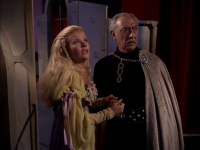
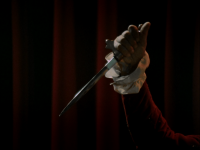
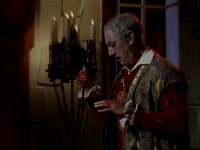
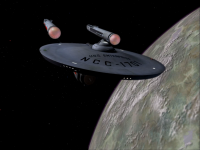
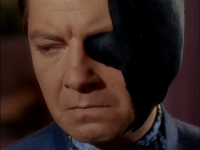
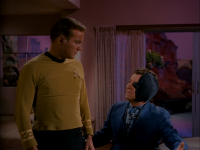
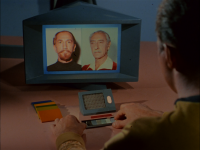
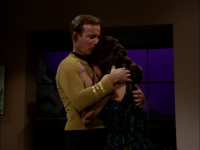
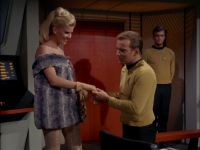
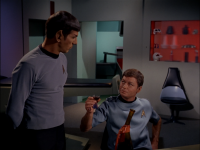
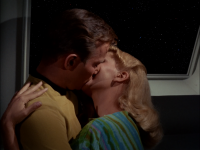
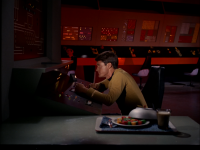
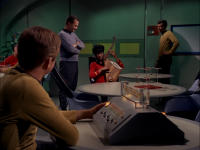
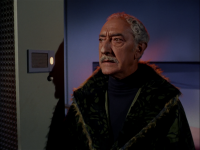
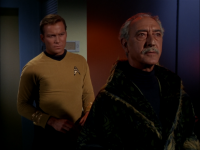
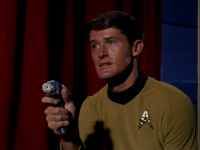
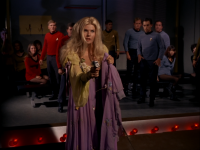
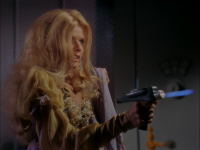

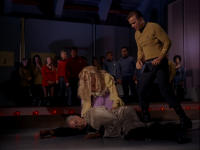
Star Trek TOS - 1x13 - The Conscience of the King
Originally Aired: 1966-12-8
Synopsis:
Kirk suspects Shakespearean actor Anton Karidian as a mass murderer. [Blu-ray] [DVD]
Filler Quotient:
2, filler, but an enjoyable episode nevertheless. You can skip this one, but you'd miss out on some fun.
- There's no essential plot or exposition in this episode that renders it unskippable, but it's a decent episode, even though it could have been better.
Problems
- Uhura's song was quite obviously dubbed over her performance. In the last scene she's shown singing in her mouth isn't even open!
Factoids
- The episode title is a reference to Hamlet, Act II: "The play's the thing / Wherein I'll catch the conscience of the king."
- This episode establishes that the Vulcan people cannot get drunk. McCoy also makes a statement about Vulcan having been "conquered," though we're not told by who. His statement probably jokingly referred to Vulcan being "conquered" by Earth, as Spock is working on a ship full of humans.
- This episode establishes that about twenty years ago, Kirk lived on Earth colony Tarsus IV where he and Riley were two of only nine surviving witnesses to the massacre of 4000 colonists by governor Kodos.
Remarkable Scenes
- Spock: "How could you know this lady is coming aboard?" Kirk: "I'm the captain."
- Spock and McCoy discussing Kirk's behavior.
- Riley calling the rec room.
- Uhura's singing performance.
- Spock and McCoy confronting Kirk.
- Kirk confronting Karidian.
- Karidian's daughter revealing that she is the real murderer.
- Karidian's death, defending Kirk.
My Review
A murder investigation is a delightfully original plot for Star Trek to tackle at this stage and the question of whether or not Karidian could actually be Kodos is intriguing and well plotted. What doesn't work quite as well is Karidian's / Kodos' daughter who as a consequence of both bad writing and bad acting is insufferable to watch. I'm not sure which was worse, her bad romance with Kirk or her incessant quoting of Shakespeare. Likewise I find it a little odd that a simple medical scan couldn't have been used to determine Karidian's true identity, but perhaps Kirk was unable to employ that option due to his desire for a stealthy investigation.
What works best in this episode is the Kirk-Spock-McCoy dynamic which is not unusual. Watching Kirk give unusual orders followed by Spock attempting to unravel their true purpose and then McCoy blindly justifying Kirk's actions to Spock is a lot of fun. It was also nice to see the episode reuse the previously established character of Riley, giving us some backstory on him which he shares with Kirk. In the end you've really got to feel bad for Karidian / Kodos because it's clear that all he really wanted to accomplish was to give his daughter a nice life by hiding the true nature of his past. But unfortunately for him his daughter was just smart enough to figure out his true past without being smart enough to realize why her father was hiding it from her in the first place.
Annoyingly, the episode concludes on a note of rather poorly-earned joy when McCoy says that Karidian's / Kodos' daughter will have her memory messed with so that she thinks her father is still alive, allowing her to recover from her sanity issues and in all likelihood rejoin civilian life. This is a rather unforgivable detail in my opinion. You can't just wipe a criminal's memory of their criminal act and release them back into society as if nothing happened. Even if this could be made to seem like a plausible policy, the episode would have had to spend more time substantiating this idea rather than tossing it in a throw away line at the end of the episode. In fact exploring the idea of the implications of such a technology and policy would be far more interesting than most of this entire episode!
The following are comments submitted by my readers.
- From CAlexander on 2011-04-18 at 1:21pm:
I liked the general plot and concept of the show, hunting down Kodos the Executioner, Kodos' reactions, and the whole thing ending in tragedy. I wasn't as interested in the part about Captain Kirk's erratic behavior, or the inclusion of Keven Riley. And I think you hit the nail on the head with Lenore – she is indeed painful to watch.
- I wish I knew the story about Kodos and how he managed to seize power while only leaving a small handful of witnesses, with the ones we see having been quite young at the time. But perhaps it is an artistic choice to leave it to our imaginations.
- Genetic testing, of course, was not around in the '60's, so the writer didn't foresee it existing in the 23rd century. I'd file it in the same category as other 60's anachronisms on the Enterprise.
- I believe you misunderstood McCoy's final statement. Lenore's conversation during the final confrontation indicates that she is psychologically disturbed and at least partially delusional. McCoy is just saying that after the trauma of killing her father, she has retreated into her own fantasy world where her father is still alive. She is now getting psychological treatment to cure her "insanity". The wording is confusing because we never hear McCoy diagnose her as mentally ill, and he says something like "She is getting the best available treatment. She doesn't remember anything." But these are just two separate facts he is offering in hopes of comforting Captain Kirk – that she is getting the best medical care, and that she is no longer hysterical with guilt. The whole thing is a rather 60's view of mental illness, but straightforward in that context.
- From Mike Meares on 2012-03-07 at 10:04am:
The Conscience of the King is an interesting episode, but I am forced to agree with the review here as I don’t rate this one higher than a 5 either.
I find myself still enjoy watching this episode, mainly because of the interaction of the three main characters; Kirk, Spock and McCoy. And the acting of Arnold Moss playing the role of Anton Karidian. I thought he was very good.
But the episode is flawed in many, many, many ways. I thought there was way too many mistakes in the writing that should have been corrected before this episode was even filmed.
Looking back on the series as a whole I just found it really distracting that the Captain had this many love interests. Kirk just seems to fall in love at the drop of a hat. I find this unbearable to watch.
And is it just me or does the age thing between Lenore and Kirk bother anyone else? Lenore can not be more than 19 ( and since the events of Tarsus IV took place twenty years prior she may even be younger than that! ) and Kirk is 33 years old. He is almost twice her age!
And Riley, who could not have been more than five years old when he saw Kodos, couldn’t have possibly remembered his face nor his voice.
The way in which Lenore is able to go around killing people seemed a little odd to me.
After killing Dr. Leighton, Lenore and Kirk take a walk together all alone down a path. Now Lenore could have possibly directed Kirk anywhere on their walk, but they end up right at the body of Dr. Leighton! Really? It is almost as if she wanted Kirk to find the body! But why? And she was on the path with Kirk alone. Why doesn’t she kill Kirk right then and there?
Afterwards Kirk invites Lenore and her acting company to come aboard the Enterprise. If Captain Kirk doesn’t do this how in God’s name is Lenore ever, EVER going to get to Kirk and Riley to kill them?
And if Kodos wanted to hide his identity from people, why does he become an actor where the whole universe can see his face?
The story doesn’t make sense!
And Lenore gets her hands on a Phaser! Really? When Riley takes a Phaser security knows about it in an instant! But Lenore takes one and nobody knows? Really?
Lenore places the Phaser in Kirk’s cabin and sets it on overload! Really? How in the hell does she do that? How does she even get a Phaser? And how can she possible know how to make it overload?
We saw in The Cage when Number One sets her Phaser to overload. Number One sets it manually and it starts overloading quickly. But Lenore does this while Kirk and Spock are in the Captain’s cabin talking! And they don’t see her enter the cabin, set the Phaser to overload, hide the Phaser and leave the room? Give me a break!
And while we are on the Phaser…..
We have seen people use a Phaser to zap people out of existence! Why doesn’t Lenore do this to Kirk and Riley? And really why not to all her victims? Their bodies would never be found! Lenore is alone (AGAIN!) with Kirk on the Hanger Deck and could zap him easily (And Riley in the engineering room too). But she doesn’t! Why not you ask? Good question.
All in all a very average episode for Star Trek! - From John on 2012-12-04 at 4:18pm:
One of the most memorable scenes was Lenore Karidian dressed in what amounted to a furry barrel. Definite fashion ticket! - From happydude on 2013-04-16 at 1:26am:
You have completely misinterpreted McCoy's line at the end. He says, and I quote, "She'll receive the best of care, Jim. She remembers nothing. She even thinks her father is still alive giving performances in front of cheering crowds." What he's saying is that the event of her unintentionally murdering her own father was so traumatic for her that she has blocked it from her memory. No where in there does McCoy say, hint or even imply that her memory was intentionally wiped.
Tell me, at the end of Sacrifice of Angels over on DS9, when Dukat was in his cell imagining himself talking to Ziyal, did you assume that it was because the Feds messed with his mind to make her think she was still alive? Or did you assume that he had become unhinged was unable to accept his daughter's death? - From Alan Feldman on 2013-06-26 at 1:05am:
"The Conscience of the King"
I like the surprise twist that it was Kodos's daughter, Lenore, who was killing the witnesses, not Kodos himself. Spock, despite being so sure of himself, missed this fascinating detail.
Why is Lenore interested in Kirk when she wants him dead? And she accuses him of using _her_ as a tool?!
Yes, the Kirk/Spock/McCoy dynamic is great. In fact, that's one of the few reasons to watch the lesser episodes (except, perhaps, the very worst of the bunch).
The Double Red Alert scene with the phaser on overload was intense. But what's with the Pressure Vent Disposal contraption? A little too convenient, I would say. How does it work? Also, there's barely enough time for a TV viewer of the time to be able to read the label.
I, too, like Calexander, would like to know more about what happened when Kodos seized power. On the other hand, that would take some of the mystery out of it, and perhaps make it too easy to figure out if Karidian is really Kodos.
Re Mike Meares comments:
Kirk does not fall in love at the drop of a hat. He wasn't hot for any of Mudd's women, or Andrea, Miri, Mea 3, Sylvia (in "Catspaw"), Marta (in "Whom Gods Destroy"), Nancy Hedford, and many other women he came across. Actually, not even this episode. Kirk only fell for Lenore _after_ he courted her for a while. That's the drop of at least a _few_ hats!
Lenore _was_ 19. The computer told this to Kirk.
Yes, trying to hide your past by taking on the role an actor in a troupe is, well, kind of dumb.
Where did Lenore get the phaser? She must have had one before boarding the Enterprise. Or maybe she bribed a guard.
How does she know how to make it overload? She obviously watched the tutorial on YouTube! :)
About the slow overload: You can't compare the phasers. "The Cage" happened thirteen years prior. The phasers don't even look alike and are therefore different models. So she set the phaser on time-delay slow-overload mode, giving her plenty of time to plant the thing and leave. But I'm surprised that Kirk and Spock had so much difficulty finding it, esp. Spock with his super-duper Vulcan hearing. Apparently she forgot to put it in silent mode, if it even has such thing.
About zapping people out of existence: this violates the Law of Conservation of Energy (energy in the form of mass). Both Kodos and the salt monster were not vaporized out of existence when killed by a phaser. (Actually the salt monster took a direct hit [with the phaser set to kill, I assume] and was merely stunned. It took a second hit to kill it. So maybe a third hit would make it vanish.) Maybe it depends on how high the phaser is set, or the type of phaser or the model number. Kind of scary if it would be so ridiculously easy and quick for a murderer to dispose of his victim!
Imagine the horror of accidentally killing a loved one!
Speaking of accidents, what if you use your phaser intending to stun someone, only to find out that you killed him because you actually had it set to kill?!
AEF, a.k.a. betaneptune
- From Alan Feldman on 2014-05-31 at 12:37pm:
More on "The Conscience of the King":
How would Lenore know when Kirk would be in his quarters so that she could correctly set the timer on the phaser? How did she get in there in the first place? It seems that quite often in the series anyone can just open the door to anyone else's room! - From Rick on 2015-02-28 at 5:12am:
I thought Barbara Anderson did a fantastic job playing Lenore. She would go on to win an Emmy a few years later for Ironside. Very good actress.
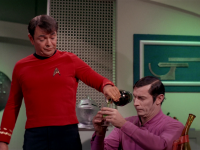
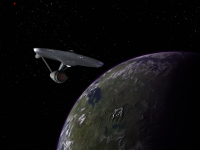
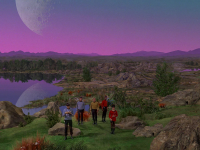
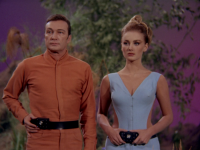
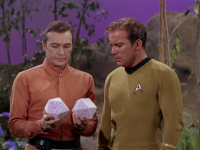
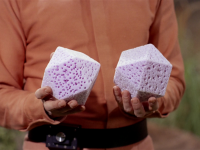
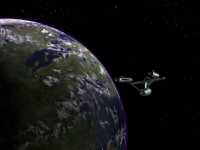
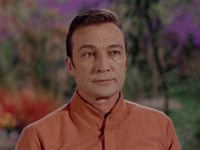
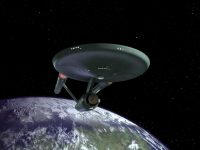
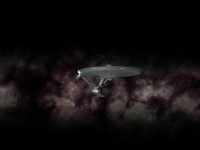
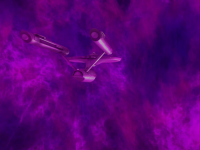
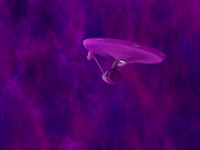
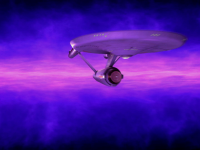
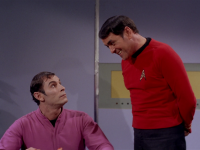
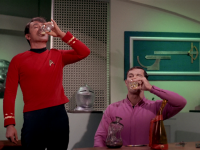
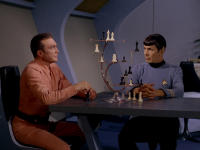
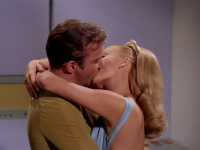
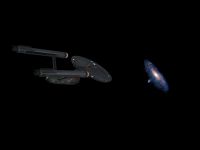
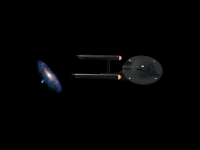
Star Trek TOS - 2x22 - By Any Other Name
Originally Aired: 1968-2-23
Synopsis:
Extra-galactic beings commandeer the Enterprise in an attempt to return home. [Blu-ray] [DVD]
Filler Quotient:
2, filler, but an enjoyable episode nevertheless. You can skip this one, but you'd miss out on some fun.
- There's no essential plot or exposition in this episode that renders it unskippable, but it's definitely a great story nevertheless.
Problems
None
Factoids
- This episode establishes that there are hundreds of uninhabited presumably M class planets which are presumably within the Federation's borders during this time period.
- This episode establishes that due to an unspecified cause, high radiation will make life in the Andromeda galaxy impossible in ten millennia. Although it is not specified whether or not this radiation is only deadly to Kelvans.
- This episode establishes that the mysterious energy barrier at the edge of the galaxy prohibits communication with other galaxies.
Remarkable Scenes
- The aliens thanking Kirk for responding to their distress call and then immediately demanding that Kirk surrender his vessel to them.
- Yeoman Thompson getting killed by the belt weapon.
- Kirk: "Immense beings with 100 tentacles would have difficulty with the turbolift."
- Spock trancing himself into being sick suddenly and all too authentically.
- Spock and Scotty proposing self destructing the ship to stop the Kelvans.
- Rojan announcing that he will execute Kirk's entire crew shortly after they traversed the barrier.
- Scotty's drinking scenes with the Kelvan.
- Spock defeating a Kelvan at chess.
- Scotty: "It's uh... it's green!"
- Spock: "Rojan, you are only a link in a chain following an order given 300 years ago. This is an opportunity for you to establish a destiny of your own."
My Review
Romeo and Juliet, Act II, Scene 2 sports the following iconic line: "What's in a name? That which we call a rose by any other name would smell as sweet." The episode's namesake Shakespeare reference is a metaphor for the fact that while the Kelvans may continue to call themselves Kelvan, they've chosen to take human form and in so doing they are inevitably forced into the totality of the human experience. They begin taking on all characteristics of humanity, including those that they did not expect to adopt, like love, jealousy, and ultimately compassion.
The metaphor is a bit forced and backward given that it is usually meant to convey the idea that language can change our perception of things, but perception is subjective and all things have some objective characteristics which cannot be altered by language. Given that, one would expect the metaphor to work in reverse on the Kelvans and produce the opposite effect on the story. A more traditional interpretation of the metaphor would have left the Kelvans incapable of experiencing what it is to be human because even though they've taken on the appearance of humanity, they cannot fundamentally change who and what they are.
But setting aside literary quibbling for a moment, this is still a terrific story with well conceived science fiction elements. Due to some kind of increasing galactic radiation in the Andromeda galaxy, the Kelvans who are native to the area are preparing to flee their home due to its impending uninhabitability. The next closest galaxy is the Milky Way and they intend to conquer it by force. This is perhaps one of the most epic premises upon which an episode of Star Trek has been built so far and the plot fully explores all the implications of such a grandiose premise.
I can't say I'm happy to see the return of giant energy barrier at the edge of the galaxy which was originally featured in Where No Man Has Gone Before, but at the same time I suppose I'd have been more annoyed if it were conspicuously missing from the episode, as that would have simply been a continuity error. The writing of this episode responsibly deals with its canonical existence and even uses it quite cleverly as a plot device while tactfully not dwelling on the reason for its existence or exploring how it came to be. I'd still like to see an episode dealing with why it's there at some point, but the crisis situation in this episode simply precluded that.
Speaking of long standing issues with the realism of the science fiction on Star Trek, this episode gives us new exposition which either clarifies or complicates the problem concerning why so many aliens in the Milky Way look like humans. It's explicitly stated in this episode that chances are very much against the idea of another alien race evolving to look like humans in the Andromeda galaxy. This implies that there is an extraordinary reason for why so many aliens look like humans in the Milky Way, such as the common genetic heritage hypothesis I outlined in my review of Return to Tomorrow.
Moving onto the actual story, there's a great deal of dramatic detail to praise. For one, while I'm not one to comment much on TV trends regarding gender and racial issues, I was pleasantly surprised to see that given the choice to execute a white girl or a black man, the plot bucked the typical trend by choosing to off the white girl. I also quite enjoyed Kirk's line to Rojan claiming that the Federation has handled foreign invaders before. That threat felt more like posturing than substance; a nice piece of subtle acting from William Shatner.
Perhaps the best dramatic moment of the episode is when Kirk struggles with whether or not to self destruct the ship, ultimately choking on the decision; being unable to go through with it. In my view what we see here is a rare moment of weakness in Kirk. In that moment he had an opportunity to sacrifice his ship to protect the entire galaxy from a formidable threat, but something prevented him from being able to give the order. My suspicion is somewhere in the back of his mind he remained confident that he could thwart the Kelvan threat without destroying himself in the process. This confidence may well have been hubris, or perhaps in that moment Kirk simply feared death and couldn't bring himself to give an order that would take his life and the lives of everyone under his command.
However Kirk arrived at his decision, it ended up being the right course of action. Amusingly, the Kelvans had detected Spock's and Scotty's subterfuge and could have prevented the self destruct if necessary, so all of Kirk's fretting was for nothing. But that removes none of the suspense from the moment, since there's no way Kirk could have known that at the time. After the ship cleared the Milky Way, Kirk seemed to waste no time finding the most beautiful woman in the episode to seduce, as usual. Meanwhile, Scotty's quest to drink a Kelvan under the table provided perhaps the most entertaining scenes of the episode.
Ultimately the resolution of the story was both a piece of clever writing exploring the idea that the Kelvans could be exploited by their newfound humanity as well as true to the spirit of Star Trek in that Kirk refused to abandon his peace proposal throughout the perilous conquest of the Enterprise. The story ends on a note indicating that automated vessels will be sent to the Kelvan homeworld to propose Kirk's peaceful solution, but I have my doubts about that plan's potential for success, even with an endorsement from real, live Kelvans since it is well established that these Kelvans arrived on a generational ship, disconnected completely from a home they never knew.
All in all, this episode has sequel written all over it. I'd love to see a future Star Trek production tackle the return of the Kelvans some time later after having received the message, still bent on conquest. Since few episodes of Star Trek leave me wanting to see more of the aliens of the week, I'd say this episode has earned itself a well deserved place in the above average episodes club.
The following are comments submitted by my readers.
- From Orion Pimpdaddy on 2010-07-07 at 4:08am:
I completely disagree with the scores people are giving for this episode. This is one of the best episodes of the original series. Why? Well, I'll try to prove my point:
-The villian, Rojan, is a very effective opponent for Kirk. Almost as good as Khan. He's cunning and calm, until he starts having feeling of jealously. He's vicious as well, having crumbled one of the redshirts in his hand.
-The crew is completely defeated and faces a perilous situation. In one of the most tense moments, Kirk was about to blow up the ship to stop the Kelvins. The usual sci-fi gimmicks to resolve the situation are thrown out the window at that point, so they have to resolve the situation without the use of technology.
-The takeover by Kirk, Scotty, Bones, and Spock is skillfully done. Each using their own personality to overwhelm the adversary.
-The description of the Kelvans by Spock adds much needed depth, and eliminates the "alien of the week" problem. - From Alan Feldman on 2012-12-20 at 4:06am:
"By Any Other Name"
Great episode, in spite of all its problems.
What's with the energy barrier? What is its origin? I'm with Kethinov on this. And why in blazes can't they just go "over" or "under" it? OK, maybe the barrier envelops the entire galaxy somehow. Nope! Rojan says it's at the rim of our galaxy. Just another absurdity to add to the list.
More "remarkable scenes":
The two that center on the following lines:
KELINDA: Oh. You are trying to seduce me.
KELINDA: Yes. I was wondering: Would you please apologize to me again?
It's pretty amazing seeing our heroes sitting at the table so badly defeated. The hopelessness, despair, anger, and near total resignation about their fate. But then they come up with their brilliant plan for defeating the Kelvans and carry out that plan brilliantly, making this a really fun episode.
But . . .
I really don't think you can have a moon that big so close to the planet. You'd have some serious tidal forces, for one thing.
Converting from 100-limb creatures to humans -- that's quite a feat! And how did they find out so much about humans and the Enterprise and such? And they turned themselves into "textbook humans". And they have the paralysis device. And they can transport themselves around at will with it. And shrink people into polyhedral shapes. Yeah, they're far superior and all that. Yet the energy barrier destroyed their ship. But it's worth going with all this just so that we can have this fun story.
Kelinda's mind, despite now being only "human", can nevertheless propel Spock across the cave. But barely 10 seconds later Kirk grabs her, administers a gentle karate chop to the shoulder, and down she goes.
How can five Kelvans control the entire Federation? Rojan just plainly states it and somehow that's enough. And even if they can, what about the Organians, Klingons, Romulans, Talosians, Metrons, Tholians, Trelane's parents, etc.? Can they control them, too? OK, drop the Tholians.
The Kelvans modify the engines so the ship can go at warp 11. But the ship cannot go that fast in later episodes.
Good luck surviving on just vitamin pills! Really. They're "textbook humans", after all.
Rojan was calm, cool, cold, cruel, plain, straightforward. Well done.
Watching Spock subtly noodge Rojan into jealousy combined with Captain Kirk's fun efforts to push him into a full blown jealous rage was great! I also enjoyed, of course, Scotty drinking Tomar under the table.
Speaking of which, when do enemies like these simply sit down and play a casual game of chess and engage in friendly conversation?
Why did Hanar permit McCoy to give him the shots? And it seemed like a kind of random, out-of-the-blue moment when Hanar confronted Rojan on the bridge. Sort of pointless -- kind of its own self-contained subplot -- but needed somehow. I suppose they had to give Bones _something_ to do.
When Drea neutralized three of the crew on the bridge, one of them was holding one of those Etch A Sketch clipboard things. Actually, I guess its screen is more like a wrinkled version of the gray thing from the same era that you can write on with a stick pencil and erase by pulling up the clear plastic sheet, or something like that. Whatever it is, it didn't make any sound as it hit the floor.
So we have three male and two female Kelvans. And they were going to reproduce for their multi-generational trip back to Andromeda. So that would have been three men sharing two women -- or two women sharing three men. Either way you put it, it doesn't sound like a good idea to me! Maybe Tomar is gay.
Definitely a fun episode. - From Alan Feldman on 2013-12-21 at 4:34am:
More on "BY ANY OTHER NAME"
Man, it didn't take long for the Kelvans to explore our galaxy! They were lucky just to get to that planet in a "life craft". And, while stranded on that planet, with only their life craft, they somehow managed to quickly find out all they need to take over the not just the _Enterprise_, but entire galaxy, to boot! How in blazes did they do that?
More about the energy barrier: Hey, we know there's "dark matter" and "dark energy" in the universe, but we don't have much of a clue as to what they even _are_. If there really were an energy barrier at the rim of our galaxy, we might not know much about it, either. But we presently have no indication that there is such a thing. But assuming it's there, as I said in my last comment, why can't you just go over or under it?
They should send the robot ship just outside the barrier, communicate with the Kelvans in the Andromeda Galaxy from there. Then it can shuttle back inside our galaxy and relay the response to us, and so forth. That should save a lot of time!
Again, this is definitely a fun episode.
AEF, a.k.a. betaneptune - From Scott Hearon on 2014-04-10 at 7:24pm:
This has been one of my absolute favorite episodes, so far. And for some unexpected reasons.
The science-fiction aspects of this story are excellent. The Kelvans are a very interesting race, and the way they are revealed through Spock's thwarted mind-meld was an excellent device. The Kelvans almost conjure up images of Lovecraft's "Great Old Ones," which is terrifying.
The threat that the aliens pose is about as severe as any I've seen in earlier episodes. The sense of powerlessness among the command and crew of the Enterprise is palpable, and the cold-blooded execution of the female red-shirt drives the point home.
The element that I surprisingly enjoyed in this one is the humor. I really haven't been a fan of the humor in Star Trek, since it's almost always exceptionally cheesy and campy. For some reason, though, I thought the gags in this one were great. Scotty out-drinking that ogre of a Kelvan and Spock coolly stoking Rojan's jealousy were comic gold.
One of the best all-around tales of the series, no doubt. - From Chris on 2018-03-20 at 6:45pm:
Loved this episode!
Emotionally swings from horror, sadness, and despair, to hilarity and ultimately triumph!
Now, on to my nits! ;-)
These are shapeshifters who apparently will retain the form they've assumed after several weeks. There was a little contradiction to this in the beginning though when Rojan was talking to Henar about returning home. At least it sounded like that to me. Perhaps they were unaware of this quirk?
The question about the barrier at the rim of the Milky Way always struck as odd. If light can pass through the rim, then so should things that move FTL... at least that's MY science!!! ;-)
I found it weird that the Kelvins felt the need to construct such a kick-ass and overly complex jail cell when they could have simply frozen the crew until needed.
There are other obvious nits, but they've been addressed in the other reviews and comments.
One quote that sort of started all the hilarity for me was McCoy: "If he keeps on reacting like that, he's gonna need a diet..."
He seems to get a lot of good one-liners! "He might take up knitting, but nothing more serious than that!" Ha!!! Gold, man!
Awesome episode!!!
On another note... Mr. Feldman's comment got me to thinking about Dark Matter and Energy.
Perhaps Dark Matter is purely made up of 'Gravitons' which hold galaxies together, and Dark Energy is made up of 'Anti-Gravitons' which pushes most galaxies apart! I realize that no one has ever observed 'Gravitons' before but to me, this explains a lot. Perhaps they really exert a very strong force, but are so few and far between, their net exertion is very little... and are thus VERY hard to detect? Kind of like lasers... not much effect until one is pointed at your light receivers!

Star Trek TNG - 1x19 - Coming of Age
Originally Aired: 1988-3-14
Synopsis:
Wesley takes the grueling Starfleet Academy entrance exam. [DVD]
Problems
- An expert shuttle pilot candidate steals a shuttle and immediately plunges it into the planet's atmosphere accidentally? Not sure how credible that is. Sure it could happen, but that's a little sloppy writing.
Factoids
- This episode was nominated for an Emmy in Outstanding Achievement in Makeup for a Series.
Remarkable Scenes
- Worf and Wesley's chat about the testing is great.
- Picard saving Jake by talking him through the shuttle maneuver.
- Wesley's psych test.
My Review
This episode is kind of a mixed bag. First the bad. Both the conspiracy and the starfleet testing in this episode seemed highly unrealistic. But if we set that aside, we've got plenty of good as well. This episode has great continuity with previous episodes regarding Remmick's interrogations. Wesley getting pissed during the test was a little strange. "Do you want this to become violent?" That was a little too far. But acceptable. The best part of the episode is during Remmick's interrogations of various crewmembers in the briefing room. The way they wove the Remmick's questions and the answers of different crewmembers together was great. And Picard is getting noticeably better with children. I liked him with Jake and later with Wesley.
The following are comments submitted by my readers.
- From DSOmo on 2007-06-03 at 6:40pm:
Remmick: "You don't like me, do you?" Worf: "Is it required, sir?"
- When the shuttle begins heading toward the planet, the bridge crew runs through the options. Yar says he is out of transporter range. People are beaming up and down from the planet. Doesn't it seem reasonable that the Enterprise could beam someone out of a shuttle that sits between it and the planet?
- After giving his report to Admiral Quinn, Remmick walks to the door - actually he almost runs into it - and then turns. The door doesn't open. For the next few moments, Remmick stands with his back very close to the door. Then, before he even begins to turn, the door opens and Remmick leaves. How did the door know exactly when to open? - From CAlexander on 2011-03-09 at 5:40pm:
- The entire scene with Jake and the shuttle seemed very forced. The shuttle leaves, then two seconds later, it is beyond tractor and transporter range, even though both it and the Enterprise are next to the planet. That is hard enough to believe by itself. But the Enterprise can move, and is faster than a shuttle, so how can they be so helpless?
- Wesley's "Do you want this to become violent?" comment was part of the test. He knew he was supposed to act rude towards that species of alien, so that is what he was doing. If he was a bit overboard in his attempts to act discourteous, that fits well with his character of being enthusiastic but young and unpolished.
- Remmick's paranoid questioning was interesting in that he seemed just as irrational to me as to the crew during the episode, but at the end I could see how it might make sense to "be the bad cop" given what he was ordered to do. However his misbehavior during the shuttle incident was not so easily forgiven; is a good Starfleet officer really going to obstruct the crew during a life-or-death situation? - From 0mcn on 2012-01-30 at 6:47am:
No else said it so I will. Finally an alien that looks like an alien. No wonder they were nominated for best makeup. Not only that but part of his costume is a device that helps him breathe (or does something for him) so yes this makes me happy. :) - From a2a on 2012-02-08 at 9:09am:
I thought this episode was excellent. Some major and minor points: 1) Remmick was a great character, especially in light of the episode's resolution and his final attitude towards the enterprise 2) The "invisible" segue's between the interrogations was a nice touch 3) The inside of the academy enrollment process made for a compelling side-plot 4) The unannounced tests were interesting 5) There was an almost kafka-esque scene with Wesley in a dram room with a single chair, supposedly undergoing some mysterious examination he knows nothing about... and for a little while nothing else happening. Just him, the chair, an empty room, and undefined anxieties. 6) The music was excellently dramatic throughout (including during the aforementioned scene).
Problem number 1: Mullet.
Jake's mullet.
Mullets will apparently be back in style in the distant future. This is not very likely (and not really a proper problem either).
Good episode. - From Quando on 2014-10-01 at 1:13am:
This approach to administering the Starfleet Academy entrance exam is idiotic. There are four people taking the exam at this particular starbase, and they have decided in advance that they will accept exactly one candidate - the highest score of the four - regardless of how well or how poorly any of the candidates end up doing. Talk about grading on a curve! What if two of them are geniuses, but one of them scores higher by a single point? Tough luck for the second place genius; it's off to the dilithium mines for you. Likewise, what if all four of them are idiots? Will they go ahead and take the smartest of the four idiots? Why are these four candidates not being compared against all of the other candidates who are applying to Starfleet Academy? This method is like Harvard saying it will admit exactly one candidate each from Galveston, Tampa, Billings, Chicago, etc. I also think it is ridiculous that not only is there only one Starfleet Academy on the whole earth, there is only one in the whole galaxy! So you have highly qualified candidates (probably millions) from the populations of dozens of Federation worlds all competing for one of only a few hundred slots in the next Starfleet Academy freshman class in San Francisco? Given all that, I have a sneaking suspicion that Mordok was deemed the "winner" here because of affirmative action (in a choice between the first ever Benzite in Starfleet and just another white human male, who do you think they are going to take?). I guess it's a good thing that Wesley can just try again at the next starbase and hope for weaker competition.

Star Trek TNG - 3x10 - The Defector
Originally Aired: 1990-1-1
Synopsis:
A Romulan defector leads the crew into a deadly face-off. [DVD]
Problems
None
Factoids
None
Remarkable Scenes
- Picard and Data on the holodeck. When Picard interrupts, the characters nearly attack him, so Data freezes the program. :)
- Romulan standoff at the beginning.
- The closeup of the Romulan scout ship at the beginning. Romulan architecture is so beautiful.
- The Romulan scout ship exploding beside Picard.
- The defector and Worf insulting each other.
- LaForge using figures of speech on Data, confusing him.
- Picard's tension regarding what to do with the defector.
- Data attempting to console the Romulan defector.
- Romulan warships decloaking and attacking the Enterprise.
- Klingon warships decloaking and outmatching the Romulans.
My Review
An exciting Romulan episode. Lots of what Picard called "chess moves". In the end I really felt sorry for the defecting admiral. I enjoyed his final act, a letter to his family. That letter symbolized his belief that one day there would be peace with the Romulan Empire and the Federation. He risked his life hoping to preserve peace and thus his people. Even though he didn't fully trust the Federation at first, he still defected. A solid TNG episode.
The following are comments submitted by my readers.
- From DSOmo on 2007-07-22 at 2:22pm:
The defector orders a glass of water from the food dispenser. He specifies "twelve ahgians." The computer replies that it is calibrated for the Celsius metric system. The Enterprise plays host to hundreds of races. What happened to the Universal Translator? - From JRPoole on 2008-04-06 at 9:31pm:
This is, in my opinion, one of the finest episodes to this point in the series. The Romulans are a much more interesting, well-written and developed race than the Ferengi, and the episodes that focus on them are generally better as a result. The defector character is nuanced and well-acted, and his plight is endearing. My only quibble with this episode is the way the Klingon aid is handled. I realize that it was meant to build suspense, but the effect is rather cheap and the climax suffers a little as a result. Still, this is top-notch trek. - From paidmailer on 2009-09-26 at 9:36pm:
Another great neutral zone episode. Two things I can add:
-In the beginning , the character on the right of Data is played by Patrick Stewart.
-Problem: Why did nobody search the romulan defector?
- From thaibites on 2010-12-20 at 12:39pm:
Finally, a good episode! This one has it all - action, intrigue, suspense, wits, Romulans. It shows what TNG was capable of doing, but up until this point, rarely delivered. I especially liked how the Klingon situation was handled. They throw you one little hint that makes you scratch your head and say, "Whatever..." And then it all falls into place at the end. I really enjoyed this one! - From CAlexander on 2011-04-19 at 1:44am:
A superb episode. It really catches the tension involved in Jarok being a defector. And this episode shows the Romulans at their finest. I think the ending is well done. - From EvanT on 2011-06-24 at 10:12pm:
"twelve ahgians."
I can see two explanations for this:
1) The computer really had no idea the Celsius equivalence of the anghian (lack of information about Romulan culture)
2)This signifies that the defector is all alone on an alien ship (he can't even have a glass of water) He's truly alienated (isn't this the same scene where he thoughtfully studies his suicide pill?) - From Inga on 2012-01-15 at 4:06pm:
I really liked to see Klingon ships and the Enterprise lined up against the Romulans - From Ggen on 2012-03-13 at 10:39pm:
A rather excellent episode revolving around an excellent guest character (the defector). Through him, we get an inside look into Romulan culture and sensibilities - which, at least in this case, prove to be more rational and sophisticated than previously depicted - and even a sneak peek at Romulus itself (or its holographic recreation). There is of course also the issue of loyalty and betrayal, and the odd matter of betraying out of one's personal interpretation of patriotism (planeterism?).
Lots of great lines strewn along the way, as the defecting Admiral has a rather lyrical bent.
Question: Riker suggests the defection is a ploy to draw the Federation into the neutral zone, and Picard finishes his sentence, "Then they will have a legitimate excuse to respond with force." *Why* would the Romulans need "an excuse?" In front of what interstellar authority? The implication, perhaps, is that Romulan internal affairs are quite a bit more complex and less monolithic, and their society less thoroughly militarized than it appears... (This, of course, is reinforced by the defecting Admiral's personal beliefs and actions.)
- From Matt N on 2013-06-01 at 3:32pm:
I loved the use of the Klingon music from the old Star Trek films when their ships appear. - From Lloyd on 2016-07-12 at 7:20pm:
I found it unlikely that the Holodeck would have exact specifications for an area of Romulus, yet the computer cannot convert Celsius to the Romulan unit of measure for temperature. - From tigertooth on 2016-09-29 at 1:26am:
It's curious how many 0 votes this episode got. Yesterday's Enterprise and Deja Q also got a surprisingly high 0-vote total despite being well-liked episodes otherwise. Hmm.
Anyway, one aspect that they didn't explicitly touch upon was the fact that Jarok clearly viewed this as a suicide mission. He surely intended to kill himself regardless of the outcome. And it seems likely he was driven to that partially by his demotions. I feel like as much as he loved his daughter, he was so dispirited and humiliated by being pushed to the side that he was trying one last gasp at being important. Sad that his ego overtook his love for his family and his home. - From Mike on 2016-11-26 at 6:37pm:
I'm also surprised by the number of low ratings this episode got from so many fans. I tend more toward the webmaster review and other comments here about the excitement of the plot and the character of Admiral Jarok.
I like the hesitation he shows in revealing too much about Romulan technology and tactics to the Enterprise. A lifetime of loyalties would be hard to overcome, even if he's defecting in order to prevent the war he believes is coming. It's also a nice touch having him miss Romulus and Data taking him to the holosuite to see it. In hindsight, his statement "I have sacrificed everything...it must not be in vain" has even greater meaning. It's not just his career, and never seeing his home and family again. He is preparing to sacrifice his life.
Re: Ggen, I would think interstellar opinion in the ST universe still counts for something, and the great powers would need to legitimize or gain sympathy for actions that would otherwise be naked aggression. An unjustified Romulan move against the Federation might cause other neutral worlds to sympathize with or even support the Federation. And within the Romulan Empire, the civilian government would no doubt need reasons to support this move, as their internal politics and civil-military relations are shown in several episodes to be complex. It's definitely not a military dictatorship. - From Keefaz on 2016-12-22 at 11:50pm:
The voting for this episode has clearly been hacked for some pathetic reason. Probably best ep to this point. - From Charles Gervasi on 2017-03-19 at 10:34pm:
It's seemed odd to me that relations between the Federation and the Romulans was so bad they could not even deliver a message. - From tigertooth on 2017-04-25 at 2:18am:
One thing I caught this time around: when Jarok blows up his ship, he expresses disgust that the Federation was eager to pick apart the Romulan craft for its technology, implying that Romulans wouldn't act that way.
Then when Tomalak thinks he has the upper hand on the Enterprise, he gloats about how he's going to pick apart the starship for all its technology!
Jarok's position was obvious puffery - who wouldn't want to look at an adversary's tech? But it was amusing to see the hypocrisy revealed.

Star Trek TNG - 6x09 - The Quality of Life
Originally Aired: 1992-11-16
Synopsis:
Data risks lives in order to protect a "living" machine. [DVD]
Problems
None
Factoids
None
Remarkable Scenes
- The discussion of Geordi's beard and beards in general. Personally, I like Geordi the best with a beard.
- Data beginning to believe the exocomp was alive.
- Beverly healing herself after being defeated in a sparring match with Worf.
- Data asking Beverly for the definition of life.
- Farallon: "One time I saw an exocomp enter a reaction chamber for no apparent reason and vaporize itself. Is that supposed to make me think that it was depressed and suicidal?"
- Beverly and Data discovering that the exocomp saw right through the test.
- Data objecting to sacrificing the exocomps to save Picard and Geordi.
- Data locking out the transporter to save the exocomps. I love how Data replies to Riker's anger to calmly.
- The exocomps noble sacrifice.
My Review
This episode takes a meager premise and makes it interesting. In the beginning of the episode we have a simple space station with a radical new mining technique. A concept not unlike other TNG episodes dealing with one time guest stars. However, the introduction of the exocomps and the debate over their sentience is an intriguing one. And the debate over whether or not they're alive is even more fascinating than TNG: The Measure of a Man in some respects. Especially with Data's decision to protect the exocomps at all costs. I'm fond of how everyone is so easy to forgive Data and I'm equally fond of how much willing Data was to end his career with his extreme actions. The dialog in this episode was intelligent and was a general pleasure to watch.
The following are comments submitted by my readers.
- From DSOmo on 2007-11-10 at 5:48pm:
- During this episode, Data asks Crusher to define life, and Crusher sputters around for a while before finally coming up with an answer (sort of). During the first season she was a lot surer of herself. When asked a similar question in "Home Soil," she immediately answered that organic life must have the ability to assimilate, respirate, reproduce, grow and develop, move, secrete, and excrete.
- Prior to a meeting concerning the exocomp, Picard makes a log stating that he has called a meeting of the senior staff. In the meeting, both Riker and Worf are missing.
- The exocomps have the ability to replicate the tool attachment they need for a specific job. Normally, the exocomp dematerializes this attachment as soon as it completes the job. Very conveniently, an excomp "forgets" to dematerialize the attachment. This forgetfulness allows Data to see the tool and come to the conclusion that the exocomps are alive (which is needed to move the plot along).
- When the bridge crew quickly runs through the options for rescuing Picard, Faralon claims that they don't have time to send a shuttle to the space station. Yet mere seconds before, Riker tells everyone they have twenty-two minutes! Twenty-two minutes isn't enough time to fly a shuttle next door to an orbiting space station? It's amazing the dance the creators go through to keep the tension up on this show. Of course, if the Enterprise sent a shuttle, the exocomps wouldn't be in danger, and Data couldn't save them, and so on, and so on. - From djb on 2008-05-29 at 7:55am:
- I wonder why Riker, who outranks Data, wasn't able to override the transporter lockout. Of course, Data has been shown to be able to lock everyone out, even the captain (see "Brothers") but it didn't seem to indicate he imitated anyone's voice like he did before.
- There's obvious continuity between this episode and "The Measure of a Man" but there's also a subtle reference to "The Offspring," in which Picard encourages Data to disobey the Admiral who wants to take Lal away, saying, "There are times when men of conscience cannot blindly follow orders." It seems Data has taken that to heart.
- I find it weird that there isn't much of a difference made between "sentient" and "sapient" in this episode. Clearly the line has to be drawn somewhere when it comes to the importance of preserving "living" things. If, for example, I had to sacrifice my cat, who is sentient, but not sapient, to save a human friend, there wouldn't be much of a question, even if it were a difficult decision to make. And if it were a tree, there would be no question. The tree is alive by all definitions of the word, but it would be ludicrous to put a single plant on the same level of importance as a starship captain. Data's acting as if the AI exhibited by these devices might make him "not alone" is ridiculous, because simple self-preservation is certainly feasible without a positronic brain. Plus, even if the exocomps could be proven to be "sentient," they don't have positronic brains, and therefore would never make Data less unique no matter how smart they became.
Somehow Data has come to the conclusion that the rudimentary intelligence shown by the exocomps, which is, at best, circumstantial evidence that they are anything approximating "conscious," is of equal value with two humans, one of whom saved him from being disassembled. Wouldn't Data take that into account? He seems to have jumped to conclusions, which is inconsistent with his programming. In fact, he seems very driven by emotion in this episode. It brings up a good question of where our the border between our thoughts and our emotions lies.
It's true that the exocomps exhibited self-preservation behavior, but that is a far cry from sapience. Even following Crusher's loose definition of "alive," these exocomps didn't reproduce or grow. They also didn't consume food any more than a tricorder would. Neither do they obviously exhibit self-awareness. Their self-preservation tendencies could be nothing more than good AI. As indicated in the episode, they have heuristic programming, writing itself as it learns more, and for all we know, this program came to the logical conclusion that self-preservation is most conducive to the unit executing its function properly. Clearly, unlike Data's designer, their designer did not intend for them to become "alive," even in the loosest sense of the word. (This, of course, brings up the whole debate of Intelligent Design, but that's a whole different can of worms.)
Indeed, I wonder why more effort wasn't made to discover to what extent these exocomps could exhibit life-like behavior, why no one bothered to try to communicate with them outside of the typical "enter command" protocol, and why no one asked exactly HOW they became "sentient." It reminds me of "Evolution", where a science project "accidentally" became intelligent, and all of a sudden has to be preserved and protected, even when it threatens the ship. One wonders, then, since the Federation is committed to seeking out new forms of life, why there isn't a comprehensive working definition of life, along with a set of tests to gauge whether or not something is alive, so this quandary doesn't come up every time some device exhibits seemingly intelligent behavior.
- This is trivial, but I like the "beard" continuity between this episode and the previous one. It's true that the producers intentionally kept this series episodic, with not much overlap from episode to episode, but some more continuity on non-plot points like this one would have been nice. - From 2 Of 14 on 2008-09-05 at 10:53am:
This episode has some excellent aspects such as great ideas, great production values, etc. However, I just cannot get my head around Data deliberately disobeying direct orders from his commanding officer by locking the transporter. To me, this is a major problem in this episode.
Data’s reasoning that the exocomps are just as valuable as two human lives is totally believable; he is an android and we understand that he sometimes arrives at conclusions many people would not understand or share, that is part of his appeal.
But to directly disregard direct orders from his commanding officer in this way is just bizarre. In an organisation like Starfleet following orders would be essential, such a complex starship cannot operate without a high level of discipline. A commanding officer is supposed to be so highly trained and experienced that if they make decisions affecting the lives of their crew they should expect them to be carried out, not necessarily without question, but certainly without such blatant refusal.
Data knows all this; in "Redemption II" when Lt. Cmdr. Hobson questions Data’s orders, Data threatens to relieve him of duty.
If I was Picard or Riker after this incident I would feel very uncomfortable having Data in such a senior position and would not want him on board the ship in such a capacity.
- From JRPoole on 2008-09-11 at 3:49pm:
Thie episode trots out a few standard Trek themes that are starting to get a little cliche by this point in TNG: the definition of life and/or sentience, Dats's humanity, moral conundrums, and scientists blinded by ambition.
We don't really get anything new here, but these ideas are all handled servicably, and this episode is intriguing nonetheless.
- From Rick on 2014-03-13 at 5:24pm:
Huge problem in this episode (which is otherwise a great one): If the scientist and Riker do not buy that the exocomps are lifeforms, then why do they need to disconnect their command pathways? They both tell Data that they arent lifeforms and Data responds by saying that because they are lifeforms they will not accept the commands that will kill them. Then Riker and scientist decide to disconnect the command pathways? Isnt this directly admitting that Data has been right all along and that they are going to kill the exocomps anyway!!!??? - From El Goopo on 2015-03-02 at 6:16am:
People really don't like this episode, do they? Talk about being unwilling to think things through..
>Very conveniently, an excomp "forgets" to dematerialize the attachment.
Or perhaps it didn't forget, and was intentionally letting Data see it? Works just as well.
>Twenty-two minutes isn't enough time to fly a shuttle next door to an orbiting space station?
This is the most minor of nits, for an episode that was clearly not about shuttles. Most problems in stories could be solved far more sensibly without tacked-on conditions to rationalize how the story gets where it has to go.
>Data's acting as if the AI exhibited by these devices might make him "not alone" is ridiculous
Data was their advocate, not because he knew they were intelligent, but because a possibly sentient life form was being forced to die, put in the same position he himself was in earlier in the series. Given that the Exocomps never reappeared, he was probably wrong... but not in principle.
>Their self-preservation tendencies could be nothing more than good AI.
Rewatch Measure of a Man and revisit the "sentience" criteria - would you condemn something that might be sentient because you think it doesn't qualify? The point is to not be hasty and condemn possible life, not assume it's not life because you can't bring yourself to believe it at the time.
>But to directly disregard direct orders from his commanding officer in this way is just bizarre.
"To seek out new life" is the Enterprise's primary mission, spoken loudly right in the title sequence each week. If you saw that your CO was about to sacrifice the greater mission to save two lives, would you not want him to listen to your arguments before saying "yes sir" and pressing on?
>If I was Picard or Riker after this incident I would feel very uncomfortable having Data in such a senior position and would not want him on board the ship in such a capacity.
Kind of a ridiculous notion to not trust your subordinate simply for doing something you yourself have done more often, and possibly for lesser reasons than violating your primary mission. Heck, Data hijacked without even knowing it just to go see his father, and they still trusted him after that massive security vulnerability was exposed. Why would this be any worse?
>If the scientist and Riker do not buy that the exocomps are lifeforms, then why do they need to disconnect their command pathways?
If your computer isn't responding, do you assume it has achieved sentience, or that it has crashed? No, you reboot it. Similar principle here. Farallon was just a step further, and refusing to accept new facts that pointed at it being more than a "bug", but the story pointed that out. - From Rick on 2015-10-26 at 3:22pm:
El Goopo:
I agree with all of your responses, as people tend to see problems where there really arent any, except for the last one in which you question the problem I brought up.
The entire premise of the second half the episode is that if the Exocomps have a sense of survival then they are sentient. Or at least there is a high probability that they are sentient and they shouldnt be mistreated until that hypothesis is confirmed or refuted.
Data explicitly says to Riker, "If I am correct" that the Exocomps are sentient, they will refuse this order because it is too dangerous. Then Riker orders that the command pathways to be shut down, which means that he thinks they will refuse this order too. So are you saying there is a computer bug that only makes the Exocomps refuse orders that are dangerous? That was not programmed into them so it doesnt really make sense that they would develop such a "bug". And besides my speculation, as I already stated, that survival instinct to refuse dangerous orders so heavily suggests that they are sentient that you cannot mistreat them until you find out for sure. So even if Riker thought it may be a bug, he cannot and should not shut down their command pathways until he is sure. - From Axel on 2018-06-17 at 5:21am:
So, these poker games the senior staff plays: you have a Betazoid who can sense emotion, LaForge whose VISOR apparently helps him tell when people are lying, and Data, who can count cards. Yet somehow Riker and Crusher are the ones that always win? Riker must be a phenomenal bluffer.
Anyway, Data doesn't suggest that the exocomps are exactly like him. He suggests they are possible progenitors. When did he actually become a life form? He's not sure, which is why he's so interested in the exocomps. They might show him an earlier stage of his own existence as he was being assembled by Soong.
Also, the self-preservation isn't the only reason Data suspects they might be alive, although that gets talked about the most. His evidence that it might have been deliberate self-preservation is because he sees they are rapidly forming new circuit pathways. If that's happening, it's a sign they might be developing self-awareness and a rudimentary intelligence, both signs of life. It also means they might continue to become more intelligent. The possibility of growth is too much to ignore.
As far sacrificing Geordi and Picard for the exocomps, he said it wasn't an easy decision. As Picard says, it was a human decision. As with all human decisions, some people may disagree or have done it differently. The whole point though, to me, is that Data has to make this call quickly and still adhere to his ethical subroutines. It was a growth moment for him as well. - From QuasiGiani on 2018-06-20 at 5:28am:
"Huge problem in this episode (which is otherwise a great one): If the scientist and Riker do not buy that the exocomps are lifeforms, then why do they need to disconnect their command pathways? They both tell Data that they aren't lifeforms and Data responds by saying that because they are lifeforms they will not accept the commands that will kill them. Then Riker and scientist decide to disconnect the command pathways? Isn't this directly admitting that Data has been right all along and that they are going to kill the exocomps anyway!!!???" -From Rick on 2014-03-13 at 1:24pm
Yep. Yes. Exactly.
Riker... ...dis-apoint-ted (or as Data basically said: fuck you).
...
Also -- on a much more serious and substantial level than these squabbles and frittatas about slavery and life-sacrifice -- Dr. Beverly Crusher never really appealed to me (so much, {I mean, who am I kidding}) but in this episode she was undeniably beautiful to my eye (and her character's character was particularly nice as well). Both of these are separate and both of these are just maybe slight improvements but enough to qualify as quantity elevating quality. - From Chris on 2019-07-28 at 7:18pm:
Look folks, and I realize how late to this discussion I am... This to me is a very touching episode, with twists I did not expect!
The Scientist turning on her own creations despite her deep admiration for Data is one big one!
I find in these comments, far too much disbelief that something could never happen the way they describe them, yet are perfectly comfortable with the entire premise of ships that go FTL, and Transporters, and all the other gibberish they use or talk about!
My biggest technical gripe with ST from the beginning is that while a ship may send out a sensing signal at 'sub-space' speeds (whatever that means) the signal would not return at 'sub-space' speeds. Further, when you and your enemy are buzzing around at FTL trying to shoot each other out of the sky, I can't imagine any sensors working in any way, shape, or form!
Let the nits go and enjoy the good stories, because they are, after all, very good stories!

Star Trek Voy - 4x19 - The Killing Game, Part II
Originally Aired: 1998-3-4
Synopsis:
A World War II holodeck simulation goes awry. [DVD]
Problems
None
Factoids
- Torres' holopregnancy in this episode wasn't faked. She was actually that pregnant in the filming of the episode. The directors have just been hiding it when they filmed the other episodes recently.
Remarkable Scenes
- The drunk Klingon Neelix.
- Janeway warning the American soldier Chakotay about the "eccentric people" who live in the "caves."
- Tom: "Boy or girl?" Seven: "It's a holographic projection." Torres: "Unfortunately a very good projection. I feel 20 kilos heavier. It even kicks."
- Janeway's discussion with the Hirogen captain.
- Hirogen: "Sing." Seven: "I will not." Hirogen: "Sing, or you will die." Seven: "Then I'll die." Tuvok: "Seven, you're a valued member of this crew. The logical response would be to grant his request." Seven: "Logic is irrelevant. One day the Borg will assimilate your species, despite your arrogance. When that moment arrives, remember me."
- Neelix: "Pardon me, gentlemen. I wonder if I might have a word with you." The doctor: "They're Klingons. Not kittens."
- Seven of Nine and her photonic grenade.
- Janeway using the range limit of the holographic projectors to her advantage.
- The doctor and Neelix unleashing Klingons into World War II...
- Janeway killing her would-be hunter.
- The peaceful ending.
My Review
Why couldn't we get the Wolf 359 simulation mentioned in Part I instead of World War II? I was really, really looking forward to that. It would have made the episode loads less cliched and a lot more fun from a fanboy perspective; for we've not been able to see an unabridged version of the battle of Wolf 359. Also, the death of the Hirogen leader was somewhat cliche. It manufactured some new danger for the last few minutes. And I found it hard to believe Janeway could negotiate a peace so easily even after the two leading Hirogens were killed. Despite that, the peaceful ending was no less gratifying. While giving technology to the Hirogen may be borderline Prime Directive violation territory, I thought that it was truly in the spirit of Star Trek that Janeway cares about helping Hirogen society even after all she'd been through. Well done.
The following are comments submitted by my readers.
- From David in California on 2007-11-09 at 6:31pm:
This two-parter was very enjoyable. I had vague memories of it from when it was originally aired--in particular the surreal image from the end of Part I of the damage from the holo-explosion exposing parts of the ship.
As a fan of "space fantasy" like Dr. Who, Farscape and the like, I especially enjoy Star Trek episodes that find a plausible "hard SF" way of achieving the same kind of general esthetic, such as the juxtapositioning of the WWII setting and the space/future setting in this episode. It struck me as similar in feel to one of the new Dr. Who episodes featuring a spaceship filled with time portals to 17th Century France, but of course using the holodeck technology established in Star Trek to make it less "fantasy".
So my favorable memories of watching the episode 10 years ago were confirmed from this rewatching. Good stuff, IMO. I rated it 8/10. - From adam on 2010-11-12 at 9:04am:
Are you kidding me? Klingons going into battle against the Nazis was one of the all-time funniest moments in all of Trek! I thought the guns would be problematic, but I underestimated the Klingon gifts of agility, determination, and the element of surprise! - From gategod on 2011-07-06 at 5:16am:
Don't you think Naomi Wildman probably died 7 times during this episode... >.> - From Bronn on 2013-08-30 at 9:49pm:
It's nice to see Neelix actually accomplish something useful. So many times he's an active obstacle the rest of the crew has to overcome in order to achieve their missions-like when he fell down while spelunking, or when he stupidly ignored orders and had his lungs stolen. Getting the Klingons to attack the Nazis, that's amusing.
I really like this episode, but I nearly have an aneurysm every time I watch Seven making that grenade. "This explosive will be harmless to organic tissue but will disrupt all holographic activity within twenty meters." WHAT!? It's a FRAGMENTATION grenade, Seven. How are you going to make that thing detonate without shooting shrapnel everywhere? I mean, I get that's she some sort of super genius with Borg technology, but fragmentation grenades are cannisters filled with TNT and black powder detonators-she's just as likely to get her shoes to emit a "photonic burst" as she is that grenade. And when we see it go of...it doesn't disrupt all holographic activity. It just makes a few holographic people disappear, but the buildings and the ground remain the same.
I'm so thrilled that this thing didn't end up saving the day because it's so ridiculous. It's actually kind of a nice subversion of typical expectations for Voyager that she spends almost half the episode working on this nonsense tech solution, and it end ups backfiring on them. It's probably why this ends up being a good episode in the end-they can't just spin some magic science nonsense to fix everything, they had to suffer and fight to finally agree to a truce.

Star Trek Ent - 3x15 - Harbinger
Originally Aired: 2004-2-11
Synopsis:
As Archer tries to unravel the mystery of a rescued alien, long-simmering feelings explode among his senior officers. [DVD]
Problems
None
Factoids
- This episode establishes that Vulcan females can have sex whenever they want, not just during their Pon Farr.
- This episode was set one day after Christmas! I guess it's no longer celebrated in the 22nd century...
Remarkable Scenes
- Anomalies floating around the bridge.
- Trip and Reed getting hostile over Reed's conflict with Major Hayes and the Vulcan neural pressure thing.
- T'Pol and Trip discussing Sim declaring his love for T'Pol.
- Trip: "I can't believe this... I'm jealous of myself?"
- T'Pol offering herself to Trip.
- Reed and Hayes sparring.
- Reed and Hayes disabling the alien.
- T'Pol writing off her sexual encounter with T'Pol as an experiment in human sexuality.
- Archer laying into Reed and Hayes for their fighting.
My Review
This has got to be the most juvenile episode of Star Trek I've ever seen, but it was reasonably entertaining. I know some fans complained that Ent: Harbinger was needlessly childish, that Trip and T'Pol's long awaited sexual encounter was handled poorly, that Reed and Hayes' showdown was immature, and that the alien plot in this episode was inadequate at best. All of these things I agree with, to a point. First there's Trip and T'Pol. I think their relationship was handled well for the most part. There was some immaturity to it, but it was mostly Trip in my opinion. T'Pol was just dropping herself to his level, in their little verbal pissing contest. After all, she has to endeavor to become more human in order to have a human sexual encounter. Then there's Reed and Hayes. This was much more easy to swallow. Their poor relations was hinted on as early as Ent: The Xindi but was never followed up on. I'm glad it resurfaced here. I've been waiting for this kind of conflict for a while. I'm glad they had a chance to fight and a chance to realize how stupid it is to compete with each other. Finally, there's the alien plot. I think it's obvious that their involvement in the arc will be elaborated further later, so I don't want to discuss the fact that we learned next to nothing about them. In short, this episode was a decent contributor to the current arc. Yes, it was juvenile, but everyone is a little immature now and then, even the crew of a starship. I'm much more forgiving of this episode than others may be; hell I genuinely enjoyed it. So there.
The following are comments submitted by my readers.
- From fan ive on 2009-12-28 at 8:50pm:
T'Pol have such a sweet small ass.
it's observation, not a diagnosis. - From Zorak on 2016-10-11 at 2:08am:
Agreed. I think 2 main things made this episode a bit more bearable and entertaining then similar episodes.
#1 The gratuitousness of the sexual and violent themes had context as well as a bit of charming humor. It wasn't just sex and violence for it's own sake. It was used to settle established conflicts and further characterization.
#2 It takes place after a run of mostly good (and some great) episodes, as opposed to just being a continuation of mediocre and poor episodes. So it's not like "here we go again with this crap", but more "ok, not great.. but a change of pace".

Star Trek DS9 - 4x17 - Accession
Originally Aired: 1996-2-26
Synopsis:
A legendary Bajoran appears mysteriously after more than 200 years and challenges Sisko's claim to be the Emissary. [DVD]
Filler Quotient:
0, not filler, do not skip this episode.
- This episode mostly features a collection of minor, but necessary continuity, such as Keiko's second pregnancy.
Problems
- This episode contributes heavily to the "inconsistent wormhole aliens behavior" problem. I won't go into detail, but essentially, the Prophets seem to contradict their original behavior quite a bit from this point forward.
Factoids
None
Remarkable Scenes
- O'Brien and Bashir cleaning O'Brien's bachelor pad.
- Akorem Laan's introduction.
- Sisko: "I'm just a Starfleet officer again. All I have to worry about are the Klingons, the Dominion, and the Maquis. I feel like I'm on vacation!"
- Quark to Worf: "Did you hear? Keiko's going to have another baby!" Worf: "Now?!" Seems Worf had not so fond memories of delivering Keiko's first baby in TNG: Disaster. ;)
- Keiko playing O'Brien and Bashir back to together.
- Morn Appearances; 1. Playing darts with Bashir.
My Review
This is a complicated episode, which creates a shakeup in the very premise of the show. It seems Sisko is no longer the Emissary; that the real one has appeared from the wormhole. Sisko revels in these events at first, because he hated being the Emissary. But when the new Emissary begins advocating ridiculous new social changes that would ruin Bajor's chances of joining the Federation, Sisko realizes maybe he should be the Emissary after all. To me, more interesting was the whole subplot regarding Keiko, O'Brien, and Bashir. I don't know why, but it had a certain charm to it. I liked the ending where Keiko goes behind O'Brien and Bashir's back both to get them back together. Very cute.
The following are comments submitted by my readers.
- From JRPoole on 2009-05-06 at 2:30am:
Two problems here:
1) Doesn't sending Akorem back to live out his life change the time line in a very serious fashion? The cute little tie up of that question at the end is ridiculous.
2) Okay, how gullible are the Bajoran people? - From John on 2011-01-12 at 7:27pm:
This episode proves once again that the Bajoran people are the most naive pushovers in the Alpha Quadrant.
One of the things I love about DS9 is that the "Prophets" themselves seem to have little or no interest in what actually goes on on Bajor. They are completely indifferent, in part because they themselves can't even conceive of linear time as we understand it. It's fun to laugh at the Bajorans as they read so much into everything the Prophets do, while at the same time you know the Prophets don't really care one way or another. - From MJ on 2011-02-07 at 12:45pm:
The wormhole aliens/Prophets are to DS9 what the Traveler was to TNG: an absurd, unnecessary story arc that reduces the show's credibility. As with the Traveler, the Prophets are used to explain away inconsistencies, do things that make no sense, and kill the climax of otherwise good episodes (see DS9: Sacrifice of Angels). The difference is, we have a lot more Prophet episodes than we do Traveler episodes.
This religion of the Prophets makes the Bajorans look like despicable fools. This is especially true of Kira, who in these episodes is no longer the tough, independent fighter, but a sheep who blindly devotes herself to whatever the religious authorities of her planet dictate. So, the Kira character definitely loses credibility. Then, enter this 200+ year-old Bajoran poet who wants to turn Bajoran society upside down, likely throwing the entire planet into chaos and ruin, and everyone just goes along with it because you don't question the Emissary? It doesn't really reflect well on Bajor overall.
I console myself with this episode somewhat by hoping the point is to show how blind obedience to organized religion can be bad. There are hints this might be the case, such as Odo's excellent questioning of Kira (my favorite moment in the episode) on the Promenade before the new Emissary's first speech, and how the Prophets clearly have no concept of time, rendering the prophecy of who contacts them "first" a moot point. But, I realize it's not Star Trek's place to really take positions; the show simply offers competing points of view to educate the audience, which, of course, is fantastic. But the Prophet storyline takes away from Kira and Bajor in the process.
I do like how the episode reflects both Sisko's being uncomfortable with the position of Emissary while also wearing the uniform, and his true concern for Bajor when the new Emissary starts enacting his agenda. Sisko has come to love this world and its people, however superstitious they may be, and is willing to serve in this role if it's in Bajor's best interests.
We also have an episode that ends rather suddenly (again).
I also wasn't a huge fan of the subplot. Normally I enjoy the camaraderie between O'Brien and Bashir, but this subplot was rather dull and pointless. It went from O'Brien wanting to spend more time with Keiko to missing Bashir. Not interesting.
Below average episode at best. - From Bernard on 2011-02-07 at 11:01pm:
I find myself in agreement with MJ over the Prophets but in total disagreement over Major Kira.
I think that you are confusing your personal loss of respect for her character with her credibility. The character is still perfectly credible as we see time and time again on our planet the blindness of faith. Have you never had conversations with believers who can stand there and as perfectly rational people then suddenly say that they believe that a man fed 5000 from a couple of loaves? The Kira character is consistant in this respect all the way through the series, so I think it is perfectly credible that she behaves in this manner. Just because I personally can't understand why people can have blind faith doesn't mean that a character is not credible if they do.
This episode does not mark the end of the Prophets as a well thought out and written species though... just watch 'Rapture' and any episodes from that point onwards involving Prophets/Pah Wraiths or both to see not only the spoiling of a truly fascinating species but also the implication (and later more than just implication!) that they really do have a connection with the Bajorans!
I enjoy this episode as it brings up interesting points and as MJ said is allows the viewer to make up their own mind. I would rate it slightly higher than 5 despite some of the problems. - From MJ on 2011-02-13 at 1:46pm:
Hi Bernard,
You make a great point. I have, actually, known some very intelligent believers, and it has been strange to me how they reconcile their faith with some of their other views. Maybe not strange, but interesting. I can see what you mean about Kira still being who she is, and yet still steeped in the traditions of her people. We have had glimpses of how her religion was one of the things that may very well have sustained her during the Cardassian occupation.
I guess it just catches me off guard when I see episodes in which Kira is fearless, answering to no one and taking on anybody who gets in her way, and yet here is willing to abandon her life simply because a spiritual leader told her to do so. The good thing, though, is that she doesn't do so unquestioningly. She voices her frustrations to that Vedek about her lack of artistic talent, which at least makes it somewhat believable.
On another note, I really did enjoy the moment in this episode where Kira informs Sisko of her decision to resign, and advising him on a replacement. - From Tallifer on 2011-03-31 at 12:23am:
Original Star Trek was generally atheist: gods were just aliens in disguise. Deep Space 9 recognizes that for most people the universe is mysterious and mystical. The Bajoran religion seems to be a mixture of Hindoo and Moslem ideas.
In this episode, it is the Hindoo caste system. The Cardassian occupation was an aberration and a traumatic experience. Naturally many Bajorans would be eager to return to the halcyon days of yore. Nowadays there is still a segment of Indian society that wants the ancient caste system legalized and enforced.
As for the emissaries, all the major religions have several prophets from the gods. When Akorem assumed the mantle of emissary, many Bajorans could have easily thought of Sisko as a sort of John the Baptist preceding the actual emissary. - From Hugo on 2012-05-11 at 8:00pm:
Well, I gave it an 8 - a solid, interesting and engaging episode, with any major flaws - as I see it! - From Lt. Fitz on 2012-06-27 at 5:20pm:
Keiko has redeemed herself. I was really aggravated by her in the last episode with her in it. In this one she behaved the way I expected a woman returning home after a long absence would behave. :) - From John on 2013-05-01 at 1:06am:
I have to agree with Bernard that Kira is still a very credible character.
Specifically, the idea that someone can be stubborn, willful and annoying, while at the same time being indecisive, ignorant, and easily swayed by religious doublespeak is perfectly credible. - From Mike on 2016-11-03 at 6:16am:
I'd give this a 2, mainly because it's an episode that didn't really need to be made, or should've been much better.
The whole point of this episode was to show Sisko finally embracing his role as Emissary. And I could buy the premise that the Prophets had Akorem do this brief stint in the future in order to get Sisko to accept his "path". But that's not how the episode is scripted. Instead, the whole thing seems like random action by the Prophets that inadvertently almost upends Bajor, the consequences of which are completely ignored by the end of the episode.
Akorem lays out a pretty good case for his being the Emissary. But apparently, he's wrong. So why exactly did he emerge from the wormhole 200+ years into the future? The vague response from the Prophets indicates that he drifted into the wormhole, they saw that he was injured, healed him, and then released him. Since they're unaware of linear time, they just so happened to drop him into the timeline at this moment. When Akorem and Sisko speak with them, they seem to think something along the lines of, "oh yeah, that's right...Sisko explained this whole linear time thingy to us...ya know, maybe we could just send this Akorem guy back to his time." In other words, as John points out, they do things in capricious ways while the Bajorans foolishly read into everything as intentional. We never find out what the Bajorans thought of why Akorem briefly appeared in this time period. Instead, they seemingly just accept that it happened and go back to their lives.
So Akorem goes back to his time, almost everything returns to what it was at the start of the episode except for Akorem's poetry, the changes to which are written off as mysterious Prophet ways, and Sisko now happily performs the ceremonies that he felt uncomfortable with at the start.
It's an aggravating, unsatisfying end.

Star Trek Voy - 4x18 - The Killing Game, Part I
Originally Aired: 1998-3-4
Synopsis:
Crewmembers believe they are characters in a holodeck simulation. [DVD]
Problems
None
Factoids
- Torres' holopregnancy in this episode wasn't faked. She was actually that pregnant in the filming of the episode. The directors have just been hiding it when they filmed the other episodes recently.
Remarkable Scenes
- Janeway as a Klingon...
- The Hirogen leader discussing with his comrade how the Hirogen have lost their way.
- Seven of Nine being placed into the holodeck in an awkward situation.
- Janeway about to kill Seven of Nine, then she regains her control of her thoughts.
- The simulated explosion blowing up the Nazi building as well as causing severe damage to Voyager.
My Review
A slow paced but effective action episode. Only the "Nazis in space" repeat of the blunder that was the premise of TOS: Patterns of Force is annoying. In the positive side, we get to see the Hirogen again, and we get to learn even more about their culture besides the tidbits from Voy: Hunters and Voy: Prey. It seems some of them believe the Hirogen are dying race because they're too nomadic. Voyager was boarded and conquered in this episode, but the Hirogen found Voyager's holographic technology interesting, and wanted to replay select bloody conflicts in Federation history. So they took over the crew's minds and are forcing them to believe they are characters in the simulations. Interestingly, Harry is spared so he can maintain the ship's systems and expand the holodecks. It's remarkable to note that Harry has managed to expand the holodeck several decks to pacify the Hirogen, and the doctor now has free reign on much of the ship without his mobile emitter. It's also remarkable that without the safety systems on, the holographic explosion severely damaged the ship. A fascinating first part to the two parter.
No fan commentary yet.

Star Trek Voy - 5x18 - Course: Oblivion
Originally Aired: 1999-3-3
Synopsis:
Crewmembers begin dying. [DVD]
Problems
- The premise. See comments.
Factoids
- This episode is a candidate for my "Worst Episode of Voyager Award."
Remarkable Scenes
None
My Review
A sequel to Voy: Demon. The writers could have picked any number of wonderful episodes to write sequels to, but no, they had to pick one of the worst episodes they've ever done to write a sequel to. This episode inherits all of the problems both technical and logical of that episode and introduces a few more. It seems the "silver blood" was able to not just duplicate the crew, but the entire ship itself, which seems unlikely to me. Not only this, but the duplicated crew created an enhanced warp drive, which can take them to Earth in just two years! A completely unnecessary and absurd detail. That said, there are some nice details in this episode. For example, I liked the attention to detail with Tom as a Lieutenant, not an ensign, because this Tom never broke the rules in Voy: Thirty Days. But since the whole story takes place on an alternate Voyager and we only see the real heroes for a small time, this episode contributes almost nothing to the overall story and is hardly worth watching at all.
The following are comments submitted by my readers.
- From Sir Brando on 2006-05-10 at 4:59pm:
The idea behind this episode may be flawed, but it is still very unique. It gives you a very creepy feeling. I like it.. it's not the best but I don't think it deserves a 0. just my opinion! - From Pete Miller on 2006-11-26 at 4:37am:
HAHAHAHA!!! I was watching this episode, and thinking that I was about to give it a zero because I didn't even consider it canon, and then I see you've already made the same conclusion. You wonder what the hell the writers were thinking. Or should I say what kind of alcoholic depression binge they were on. Besides the complete absurdity of the episode and the fact that it has absolutely no effect on anything, it also happens to be DEPRESSING as FUCK!!!! Wow. Thanks for tying up that loose end, writers. This episode really contributes a lot.
Zero. Second episode of Voyager to get one. - From Tony on 2008-09-26 at 7:13pm:
My opinion is slightly diferent; I think that the idea of bringing back the duplicated crew from "Demon" was a good one (despite the obvious flaw of the entire ship having been duplicated), but the writer(s) did not create a story that create a story that lived up to the potential of that idea, or even come close. All we get to see is the entire duplicated crew die with hardly a storyline at all. A better idea would have been to have Voyager and duplicated Voyager discover each other and try to find out why there are two of them, then have the duplicates begin to degrade, they discover that the real Voyager is causing duplicated Voyager to degrade and they also find out what duplicated Voyager is. Now that the degradation has been started, it cannot be stopped. As a side story, hostile aliens couls have attacked the real Voyager at the beginning, and were driven off. They attack again, but because the aliens are only aware of one Voyager, duplicated Voyager sacrifices themselves to make the aliens think Voyager is destroied and the rear Voyager can continue on it's way. But no, we have to watch a dumb story of people dieing that deserves a zero. - From Tallifer on 2011-04-25 at 11:12pm:
10/10
This story is an extremely moving tragedy. Up until the end we are given some sliver of hope that something good can still happen for this doomed crew. We come to identify fully with the plight of these "people" who are fighting for their "humanity" and "Federation values."
It is a fascinating coda to an equally interesting story. Star Trek was ever brilliant for this kind of story: a once-told short story. Episodic television can be terrific: forty minutes of speculation, drama and escape. Not everything needs to be a twenty-six part epic arc like the dreary Battlestar Galactica. - From spline on 2014-01-26 at 11:18am:
"I think it's an episode people either love or hate," observed Nick Sagan. "The 'hate' category seems to say, 'Why do we follow a crew that isn't even our regular crew?' and they feel cheated. But it really is the story about the poignancy of Voyager's journey. There's something about trying really hard and not being quite able to achieve it, which is a reality to a lot of people [....] [The episode's] about a need to be remembered, a need to be recorded, and that's the special tragedy about making a log, a kind of capsule – we know that the 'Demon' crew dies. It's about loss and remembering, death and grief."
I'm with Tallifer. I think those who give this silly ratings like 0 or 1 are being unjust and hypocritical. How many pointless episodes about Harry Kim's love life, alien of the week, shuttlecrash of the week, and reset buttons get a pass? Ninety percent of this series' episodes do not advance the overall plot *at all*. And criticizing it because it's not the "real" crew utterly misses the entire point of the story.
This is a 9/10 episode easily, one of the best of the series. - From spline on 2014-01-26 at 11:50am:
Also, one last thing to think about:
The writers also wanted to leave certain issues unresolved. "We didn't want to answer a lot of questions," Ken Biller stated, "like, how long has that ship been out there? Some of the episodes that we saw earlier in the season, was it that crew? Or was it the real crew? It's kind of intriguing to think about."
(quotes from Memory Alpha) - From janus on 2014-10-16 at 10:05am:
An episode which tests issues of personal identity, loyalty and motivation to destruction (literally!)
When Janeway says that she's determined to get them home, only to be reminded that *their* home is a demon-class planet in the Delta Quadrant, and when Harry Kim is told that, even if they did get "home" to Earth, his family would not want a duplicate of their real son, but only the original, we see a fundamental conflict which cannot be hand-waved away - and that is *true* drama.
That it starts with Tom and B'Elanna's wedding, and ends with Voyager's destruction, makes clear that the writers meant to create a truly tragic episode. That the probe with the record of all of their mission-data is lost, and that the other Voyager encounters only their wreckage, adds to the tragedy, and maybe even makes us contemplate our own mortality.
On a side-note, how is it "unlikely" that a fictional substance could perfectly replicate a human being (complete with past memories!) but couldn't replicate inanimate ship components, too? It seems no more unlikely than time travel, which violates our understanding of physics but happens in science fiction all the time.
Also, it seems irrelevant to object that this isn't the real crew, since they have the same personalities and memories; what about the *backup* Doctor in Living Witness? He's also "just" a copy.
Let's be honest: plot devices like these are a dramatic conceit. The real point is that, given the setup, the characters act in a consistent and believable way, so that we can relate to their feelings and choices, and be invested in the consequences.
Of all the stories which show Voyager's crew trying to get home, this is the only one which explores what it would mean, to them and us, if they failed. (Voyager's destruction in Year of Hell was done knowing that it should restore the former timeline.)
Just for that, this episode is exceptional.
10/10
PS: This one reminds me a lot of DS9 "Whispers", which I also liked. Our reviewer gave that a low score too, so at least I'm (or we're) consistent. ;) - From thaibites on 2015-01-21 at 1:04am:
When the story opened with Paris and Ms. Miserable getting married, I thought "Oh no, not another stupid soap opera episode!" Luckily, I hung in there and found a quirky little episode that managed to take Voyager out of its predictable rut.
1) Why is it so unbelievable that the ship was copied? If you think that the holodeck is believable, then you're just being a hypocrite. How many times have we seen the holodeck defy physics and make a room into a huge outdoor scene where people walk for miles. Now that's unbelievable!
2) The copy crew needed to have an enhanced warp drive so they could be ahead of the real Voyager and almost meet them on the way back. (I wonder if this causes problems in the future for the real Voyager. Maybe they'll run into aliens that the copy crew had a problem with?)
3) I liked the fact that the copy crew was allowed to die at the end. They violated the crew of Voyager and were an abomination in the eyes of the Lord! Star Trek endings are too nice and orderly, and it was nice to see something different for a change. With X-Files being so popular during this time period, you would think Berman et al would emulate them more often.
It's obvious this is an episode that people either love or hate. The little gayrods that act like Comicbook Guy on the Simpsons hate it because it doesn't fit into their nice, orderly Start Trek canon world. These people obviously have never had sex with another human, and their real lives are more meaningless than the copy crew's. The people who love this episode are free-thinkers and lovers of science-fiction (NOT soap operas in space). These people long for Berman and friends to push the boundaries of ST in the great tradition of Gene Roddenberry. I think this episode does that quite nicely! - From Dstyle on 2015-07-09 at 3:06am:
Before watching the episode I came to this site to check it's rating and almost gave it a pass as a result, but I decided to watch it because the fan rating was just a little below average. Boy, I sure am glad I watched this one: one of my favorites of the season so far.
I guess it definitely is a love it or hate it kind of episode, and I can respect the opinions of those who thought it was a weak episode. Personally, I enjoy science fiction that utilizes the possibilities of a technologically advanced future to explore abstract philosophical problems in a tangible way. Remember Tuvix, and that whole episode that used transporter technology to explore the nature of identity and individuality? To me this felt like an episode in the same vein. What if you discovered that you were not really you, and that the real "you" was out there in the world somewhere living a separate existence? Is your existence any less authentic? What would it take for you to accept that you are the copy and not the other way around? (In this case, it was extreme physical degradation: evidence that you are, in fact, a lesser copy.) Do your experiences and feelings still have value? Should you be afforded the same respect that the "real" you had earned? It was fascinating, and I found the end to be rather beautiful and poignant.
I'm going to resist the urge to pick apart kethinov's review line by line, with the exception of the final line. Watch this episode. Yeah, you might hate it, but it's a "you love it or you hate it" kind of episode. Don't deny yourself the opportunity of finding out which you are. - From dominic on 2016-06-10 at 4:00am:
It doesn't matter that they're not the "real" crew. They think they are, they react the same way the real crew would, and they are just as heartbroken when they realize they will never see Earth. - From tigertooth on 2017-06-20 at 4:06am:
I was okay with the premise. Some of the flaws that have been mentioned hurt it a bit, but I could deal with it.
To me, the main problem was that outside of the premise, the episode was just kinda boring. It's like 45 minutes of "we're melting" and then they die. There's no dramatic arc. From the moment they learn the truth until the end, nothing really happens except slow decay and death.
I wonder if they should have held off the reveal that they were all duplicates for a while longer. Like they realize it's related to the Demon planet, then they start to think that they're being infected by their duplicates. They could even given a technobabble explanation of how a duplicate Voyager could have been created. They run into the other Voyager, thinking it's the duplicate. Then they come to realize they're the duplicates. Then you go to the valiant sacrifice idea somebody mentioned earlier. At least it would have given them something to do.... - From QuasiGiani on 2017-08-25 at 8:49am:
Excellent episode. It _is_ canon. Those that don't realize this don't understand the term (though they are so obviously just itchin' to use it; like a Vocabulary Of The Week word)... so object if you must but you really shouldn't must.
Excellent episode. It is _also_ part of a (apparently preciousssss) story arc... so again, embrace this episode.
Excellent episode. It is _also_ _also_ (as a few have pointed out) an episode that harkens-back to TOS as a sci-fi short-story format that needn't answer to every goddamed negative, niggling, nebbishmal, nay-saying, neurotican, nerdling, nabobbing natter... so, to those who enjoyed it: Nanu... Nanu! - From McCoy on 2017-09-22 at 3:19pm:
I don't understand all that low ratings. Looks like you people prefer utopian, happy space adventures. This was a great tragedy with good use of s-f elements. Certailny better than most high ranked action episodes (like i.e. Dark Frontier).
I expected that they will somehow contact the original Voyager and send them a beacon. But the writers made bold choice and served us hard, depressing, moving end. Bravo! 9/10 from me. - From minnie on 2017-12-01 at 2:15pm:
I'm with Spline on this one. I found it haunting and it stayed with me afterwards. It's one of the most memorable episodes - many of them aren't. I don't think it matters whether the story arc is advanced. It is still about the crew, eg. Janeway sticking to the mission despite all evidence saying she should turn around and so forth. Very interesting, a proper sci fi story, and a sad one. A tragedy. So I gave it 9. - From jbense on 2018-03-04 at 8:12pm:
Gotta say: I completely disagree with those who consider this a poor episode.
To me, it is one of Voyager's best.
User janus above pointed out similarites with DS9's "Whispers." It also brings to mind the DS9 episode "The Visitor," another tangential side-plot episode written in the poignant style of a classic sci-fi short story.
I advise strongly against skipping this episode. - From notaduck on 2020-04-03 at 3:14pm:
I'm on the "love it" side of the fence! Watching the whole series for the first time. This one stuck with me for all the reasons I enjoy science fiction: spectacular possibilities (cloning), centered on real human emotions (loss, home, protection), not afraid to face hard philosophical questions (identity, being remembered, the meaning of principles), wrapped in a short story. There are some slow parts, but I feel like the uncertainty of their fate and the struggles of the duplicate captain more than made up for it.
A point I think can be missed is the tragedy at the end isn't just about loss of life, but loss of accomplishments, recognition, and respect for these lives. Imagine if the real Voyager had picked up the secret of the advanced warp drive! Imagine Tom and Elana reading their twins' marriage vows! It's a thoughtful, subtle statement I think can be lost in the prosthetics.
Man, I'm glad I made it through the early seasons to get treats like this... - From Ralph on 2021-10-25 at 5:26pm:
I think this episode is the one where I am furthest away from Kethinov's opinion - with whom I'm generally quite in agreement with. I think this was a wonderful episode. A real tragedy that was well written. Up until the very end I had my hopes up for something to come out of the duplicate crew. Even at the very last scene after it was clear that the time capsule was lost, there was hope of the real Voyager finding a remnant of their counterparts.
Star Trek almost never writes an episode like this. At least not this era of Star Trek. I find this easily one of the better Voyager episodes.

Star Trek Voy - 7x17 - Workforce, Part II
Originally Aired: 2001-2-28
Synopsis:
Chakotay tries to rescue his lost comrades. [DVD]
Problems
None
Factoids
- The reactors on the Quarren planet are said to use Tylium fuel. Another reference to Battlestar Galactica.
Remarkable Scenes
- The doctor outwitting the Quarren ships.
- Remarkable technobabble: "Triaxialating frequency on a covariant subspace band."
- Seven: "More than a hundred skilled employees, most of them the same species, acquired in a single day during a labor shortage?"
- Yerid investigating the conspiracy.
- Ravoc uncovering the conspiracy.
- Voyager coming under attack when they tried to rescue their crew.
- Kim outwitting the Quarren ships.
My Review
Not quite as exciting as the first part as we by now well knew exactly what was going on. Watching Ravoc so slowly (ad nauseam) uncover the source of the conspiracy was the weakest use of time yet displayed in the episode. However, the extensive guest character involvement was also still quite to the episode's advantage. I felt we really got to know Qurren well, and it was nice to see the crew's efforts to rescue their comrades finally begin to show some progress after much trial and error. And like part one, part two manages to display more spectacular graphics. Workforce was an unusual episode on any scale, but definitely a surprisingly nice treat and a gem of season seven.
The following are comments submitted by my readers.
- From Hugo on 2016-03-03 at 9:55pm:
I liked Yerid, the Quarren investigator, reminded me of that detective in Caprica.
The displays in the power plant looked very cheap btw... - From Lumzi on 2017-08-19 at 4:29am:
The city looks like Midgard in some places.
The wrong bat'leth is in B'elanna's quarters. - From Tarondor on 2019-02-02 at 2:15am:
I found Janeway’s regret at the sudden ending of her romantic relationship to be very touching. It really underscores the loneliness of command and was a good performance by Kate Mulgrew, as usual.

Star Trek Ent - 2x03 - Minefield
Originally Aired: 2002-10-2
Synopsis:
Enterprise becomes disabled by an alien orbital mine while trapped in hostile Romulan territory. [DVD]
Problems
- In TOS: Balance of Terror, Kirk and Spock had a conversation that explicitly stated that cloaking technology is "theoretically possible," and heavily implied that it had never been observed. The Suliban cloaking devices in this show have already complicated this, but given the likely presumption that the Suliban technology probably comes from the future, that's not that big a deal. But here we see the Romulan cloaking device itself depicted 100 years too early, forcing us now to assume that Archer didn't make a very thorough report to Starfleet after this episode, causing knowledge of Romulan cloaking technology to fade into the mists of history as quite uncommon knowledge so as to explain how Kirk and Spock could be so ignorant about it 100 years later. Honestly, would it really have been so hard to do this episode without featuring a cloaking device?
Factoids
- Reed suffers from aquaphobia.
Remarkable Scenes
- Reed's uneasy breakfast with the captain.
- Archer to T'Pol regarding the landing site for the planet: "Find a volcano with a gentle slope, preferably one that's not erupting."
- Enterprise slamming into a mine.
- T'Pol regarding why the beacons weren't revealing anymore mines: "They were designed to penetrate Suliban cloaking devices." Archer shoots her a quick highly annoyed look. T'Pol quickly says: "I'll try shifting the phase variance."
- Reed's spacewalk on the hull, examining the mine.
- The Romulan ship decloaking before Reed's eyes and firing warning shots.
- Archer: "Our friends seem anxious for us to leave. We're going to break orbit, nice and slowly." Reed: "Understood. If plan to go to warp, sir, you'll let me know?" Archer: "I'll try to remember."
- The mine impaling Reed.
- Reed: "I would consider letting you amputate but if chef got hold of it, he'd be serving 'roast Reed' for Sunday dinner."
- Reed regarding the painkillers: "Please sir... may I have some more?"
- Archer and Reed chatting while attempting to disable the mine.
- Archer saving Reed.
My Review
Romulans at long last. It's annoying that they're shown with cloaking devices when they were regarded as something new in TOS: Balance of Terror, but the problem existed since the first episode when the writers decided to give the Suliban cloaking devices. It's at least plausible that the Romulan cloak was defeated during the Earth Romulan war, and that in TOS: Balance of Terror they designed a more perfect cloak just as was done in TNG: The Neutral Zone to warrant the various reactions to the cloak seen over time. Anyway, enough of that. Minefield was the best Enterprise episode so far, besides of course Vox Sola which is an exception. I was hoping since day one that Enterprise would document the Earth Romulan war. This incident could very well spell the beginning of the said war. Besides the cloaking oddities, which really aren't that bad a continuity problem, the writers were true to TOS' portrayal of the Romulans. Spock said that in TOS: Balance of Terror that that was the first time the Federation had ever seen a Romulan. As unlikely as this may sound, the writers stayed true to it. There was no visual communication between the Romulans and Enterprise. I was also happy that first contact with the Romulans happened in this manner. The Klingons have been abused since the first episode, but this is just the abrasive first contact I would have expected to see with the Romulans. (The Klingons likewise, but oh well.) Finally, the interaction between Archer and Reed in this episode was great. Reed's interaction with Trip in Ent: Shuttlepod One was funnier, yes, but on the whole I found this episode to be vastly more entertaining and the Archer / Reed interplay was one of the reasons. Overall, most excellent. I want to see more like this!
No fan commentary yet.

Star Trek TNG - 7x06 - Phantasms
Originally Aired: 1993-10-25
Synopsis:
Data's first bad dream turns into a real-life nightmare. [DVD]
Problems
None
Factoids
None
Remarkable Scenes
- Picard lamenting about being invited to a dinner with a bunch of admirals.
- Data staring at his cat.
- The Troi cake.
- Data "oversleeping."
- Riker: "Talk about going nowhere fast."
- Picard trying to be useful in engineering.
- Data stabbing Troi.
- Worf attempting to command Data's cat to come to him.
- Data: "And you must talk to him. Tell him he's a pretty cat. And a good cat."
- Troi's Data cake.
- Data: "I wonder what Dr. Freud would say about the symbolism of devouring oneself."
My Review
This episode features good continuity with TNG: Birthright, when Data first discovered his dreaming program. It's nice to see more about this program. I'm glad they don't just sweep the whole incident under the rug like certain other episodes. The Enterprise's engine troubles were thoroughly fun to watch. Every time they try to go to warp the engines blows! Hilarious. Overall the episode is entertaining despite a rather weak plot.
The following are comments submitted by my readers.
- From Pete Miller on 2006-05-28 at 1:33am:
I think that for these data dream episodes, the writers employed one of their teenage sons that trips out on acid all the time. The dream sequences are so extremely bizarre, I'm glad I've never experienced something that messed up. - From Robert Koenn on 2011-06-23 at 11:35am:
I could only give this episode a 3. As the previous comment said, dream episodes in Star Trek tend to be quite bizarre and surrealistic and I suppose that throws my senses off a bit. I particularly dislike the warped camera views but that only happened briefly during the dream sequences. It was interesting that the dreams meant more than simply Data's imagination developing strange scenarios but were actually tied into this alien presence. However where these "creatures" came from, the lack of the prime directive in dealing with a new life form, and just general plot line seemed a bit absurd to me. Sometimes I know that just to develop a new episode the writers obviously search for a plot and a few times these plots have been quite poor. - From thaibites on 2012-12-19 at 3:21am:
I thought this was one of the better episodes. It's nice to have some surrealism instead of soap opera. It was a little like that 80's movie Videodrome. - From Rob UK on 2015-02-25 at 10:25pm:
For me this episode falls flat on it's arse for one reason the unrealistic character representation in the way of Geordi, throughout all seven seasons he has less pussy than Data's cat and here he has some hot young ensign throwing herself at him and he is acting like she is an annoyance that he doesn't have time for - From CAlexander on 2019-04-08 at 6:02am:
I like the intent of this episode, setting up a major mystery and a minor mystery, and solving it by figuring out the symbolism of Data's nightmares. But I find the end product doesn't come together that well, it's just OK. It hurts that the final solution is pure technobabble and most of the symbolism just isn't that important.

The following are comments submitted by my readers.
Watching this episode made me think about how lucky Miles is having him live in the 24th Century versus late 19th or early 20th century. Having him go undercover in a gang/mob/crime syndicate indirectly lets him experience what life might have been like for someone of his heritage - mostly if he would have grown up poor as an Irish-American - would have had to do to make ends meet. Another good DS9 episode!
So is this classified as an "O'Brien must suffer" episode? I liked the setup and the setting, but I felt the ending was a bit dull. And everything was a bit cliche too. I don't think the emotional trust/connection between Bilby and O'Brien came out really in the buildup to the end.
@packmanjohn - don't exaggerate, you make it sound like most poor irish-americans (one of the biggest immigrant groups!) were mobsters...
A genre episode that didn't quiet work.
They laid on the male-bonding/betrayal of trust dilemma so thick that it was hard to tell if it was a spoof or a homage to the trope. It was just a bit much.
The Vorta being so 'evil mobster'-like seemed really out of character for what they were supposedly cloned to be.
The most interesting thing was the remote hacking via implant.
Still, I like O'Brian episodes.
This episode is basically Donnie Brasco in space. Very strange.